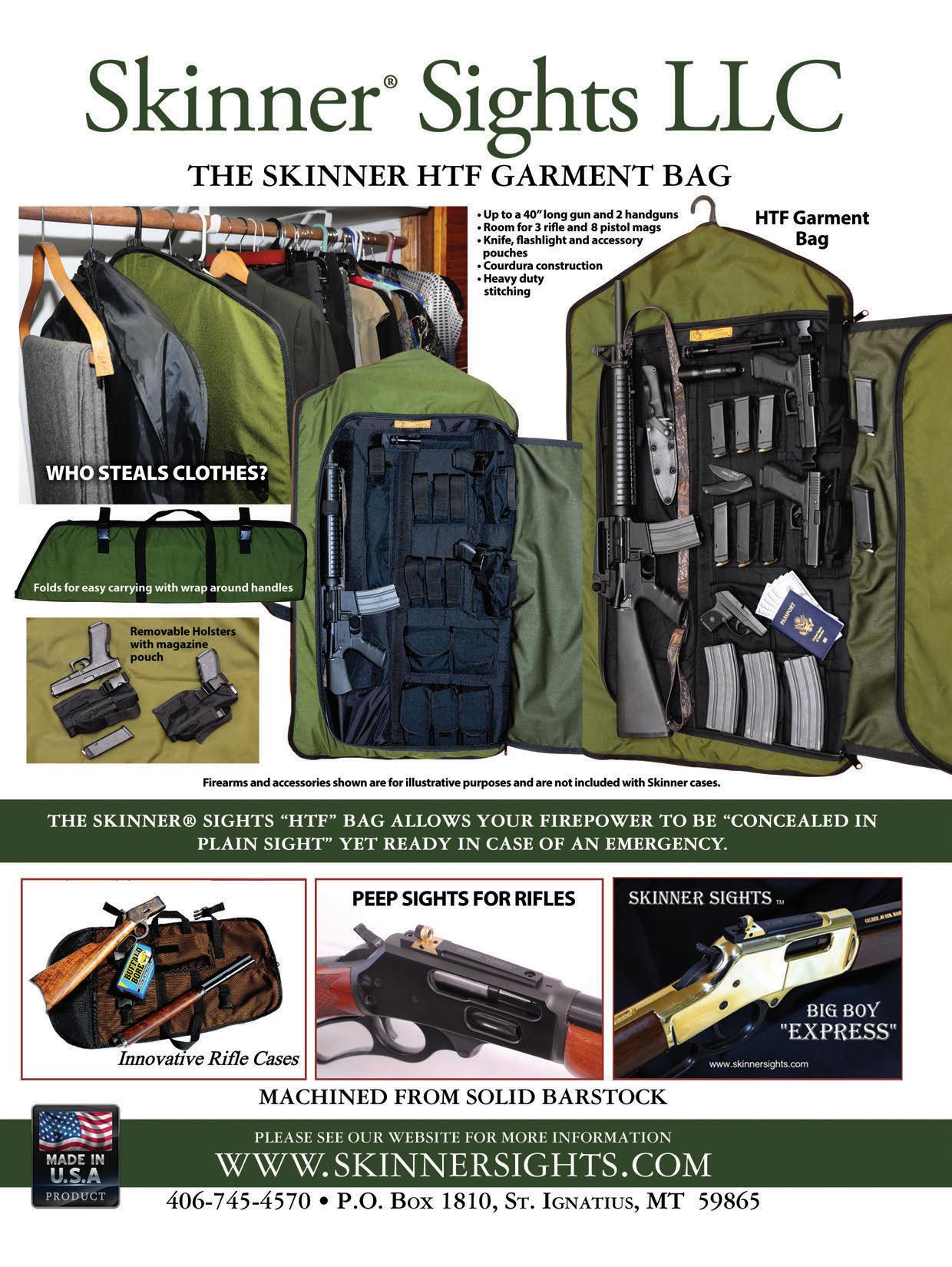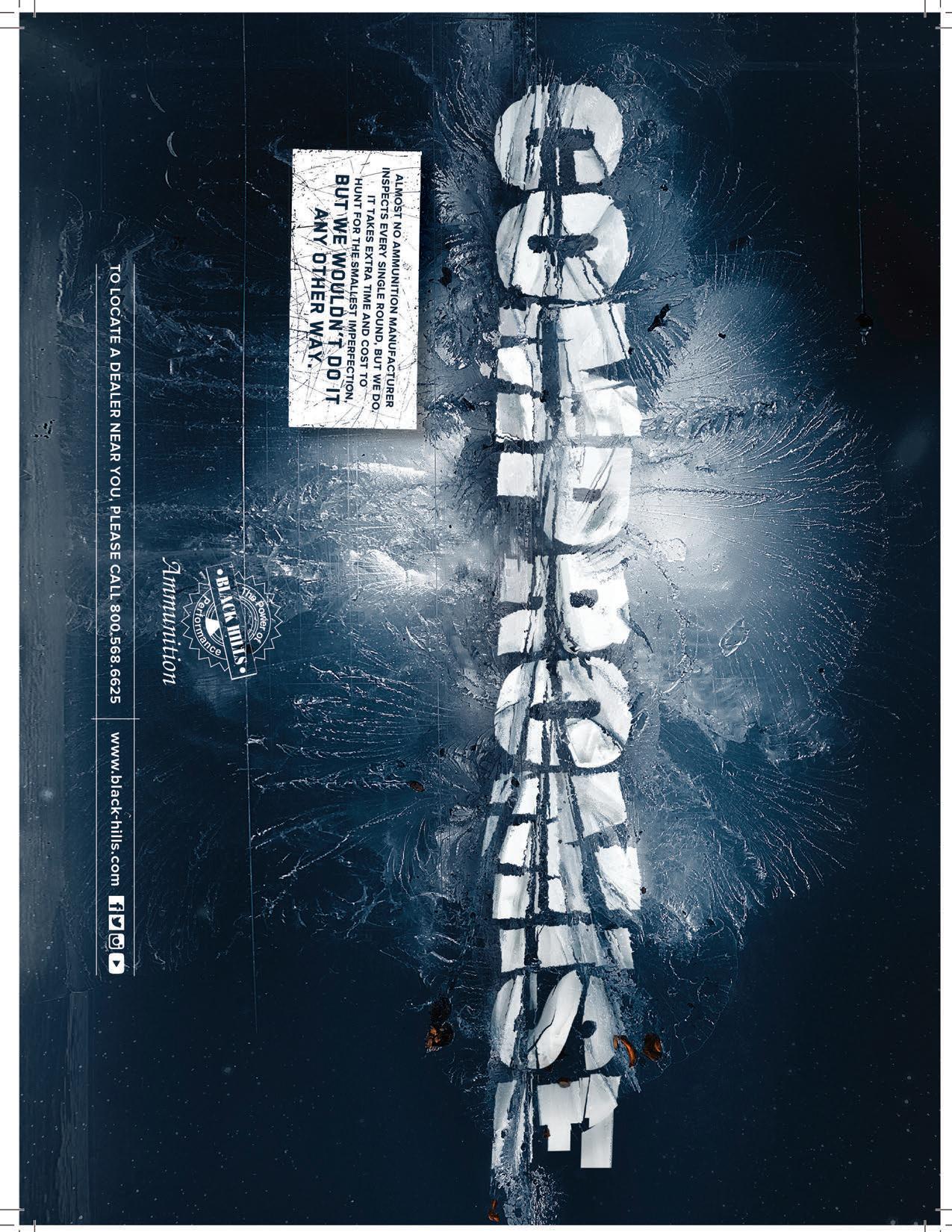








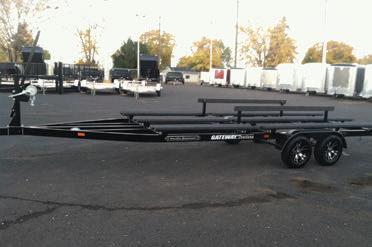



















Volume 12 // Issue 11 // August 2023
PUBLISHER
James R. Baker
GENERAL MANAGER
John Rusnak
EDITOR-IN-CHIEF
Andy Walgamott
OFFICE MANAGER / COPY EDITOR
Katie Aumann
LEAD CONTRIBUTOR
Frank Jardim
CONTRIBUTORS
Jason Brooks, Larry Case, Scott Haugen, Phil Massaro, Mike Nesbitt, Paul Pawela, Nick Perna, Geoff Ziezulewicz
SALES MANAGER
Paul Yarnold
ACCOUNT EXECUTIVES
Lucas Hoene, Mike Smith, Zachary Wheeler
DESIGNER
Lesley-Anne Slisko-Cooper
PRODUCTION ASSISTANT
Kelly Baker
WEBMASTER / INBOUND MARKETING

Jon Hines
INFORMATION SERVICES MANAGER
Lois Sanborn
ADVERTISING INQUIRIES ads@americanshootingjournal.com
Longtime American Shooting Journal hunting columnist Scott Haugen has taken many elk throughout the West and will be the first to tell you that big bulls don’t come easy, but they can be had if you follow his game plan this season. (SCOTT HAUGEN)
Website: AmericanShootingJournal.com


Facebook: Facebook.com/AmericanShootingJournal

Twitter: @AmShootingJourn
MEDIA INDEX PUBLISHING GROUP 941 Powell Ave SW, Suite 120, Renton, WA 98057 (206) 382-9220 • (800) 332-1736 • Fax (206) 382-9437
media@media-inc.com • www.media-inc.com

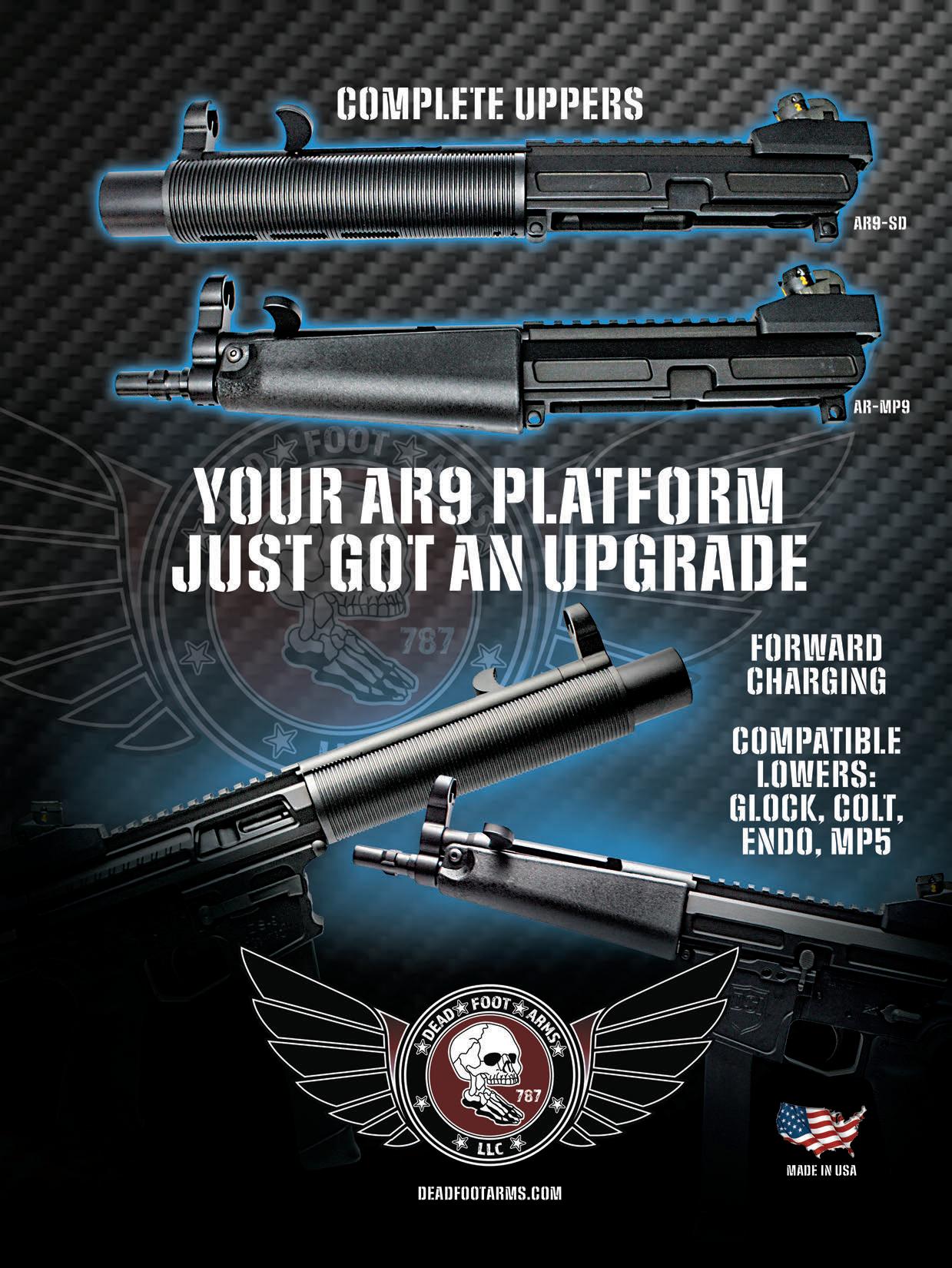
28 THE HAWKEN CLASSIC
Get ready for a historic celebration of St. Louis rifles and the opening of the Western frontier at 2023’s Hawken Classic! Frank Jardim previews the August 25-27 shindig featuring historic reenactors, craftsmen, sutlers, and some of the leading and most knowledgeable collectors of Hawken and other St. Louis firearms made from the 1820s through the 1850s.
41 BL ACK POWDER: LITTLE SECRETS FOR BLACK POWDER HUNTING
Mike Nesbitt’s tips won’t make you a better deer hunter, per se, but they will help ensure that your black powder rifle goes boom when it counts the most!
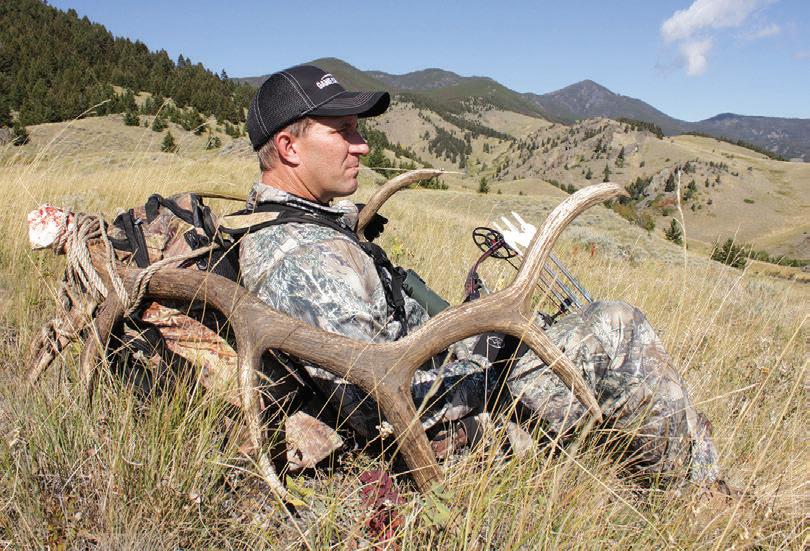
49 BULLE T BULLETIN: LOADING UP FOR AN AFRICAN SAFARI
From the Tiny Ten and plains game to big cats and even bigger critters, Phil Massaro details the bullets that will get the job done when hunting the vlei of Africa.
79 SC ATTERGUN ALLEY: PULL! AN INTRODUCTION TO THE SHOTGUN GAMES
Want to improve your wingshooting eye and have fun at the same time? Shoot trap, skeet or sporting clays! Larry Case shares a beginner’s guide to these venerable shotgun sports, as well as new guns, ammo and gear to get you started.
95 MILITARY SPOTLIGHT: WHIDBEY ISLAND RESCUE AIRCREWMAN PUTS HIS LIFE ON THE LINE FOR OTHERS
Washington state residents love to hike, but when disaster strikes, a US Navy search and rescue unit is often called on to respond. Geoff Ziezulewicz details the “most intricate and technically challenging rescue mission” that NAS Whidbey Island-based Hospital Corpsman 2nd Class Anthony Anglikowski has faced.
105 L AW ENFORCEMENT SPOTLIGHT: COURAGE NOT UNCOMMON
We still don’t know his name, but this past May, an Allen, Texas, cop single-handedly neutralized an active shooter at a mall, an extraordinarily selfless act but also, Nick Perna argues, courage that is not uncommon among America’s police officers.
109 SELF-DEFENSE TRAINING: LESSONS LEARNED FROM THE G.O.A.T.
You might not associate James Butler “Wild Bill” Hickok with martial arts, but Paul Pawela believes the legendary Old West figure was one of its greatest practitioners of all time. Before you scoff, hear out our self-defense expert’s reasoning.

ALSO INSIDE
25 TRIGGRCON COMING SOON TO WICHITA
The latest and greatest in firearms and accessories is coming to Kansas next month, and the public is invited to Wichita’s Hartman Arena and nearby Severance Training Center for three days of products, innovations, awards and range time.

Company Spotlight
65 HIGH ADVENTURE RANCH
Trophy hunting for red stags, elk, bison and more in Missouri’s Ozarks.
91 DUMONDE TECH
True Blue Gun Care products for cleaning, lubing, as well as long-term storage of firearms.
100 MODERN TACTICAL CREATIONS
Wrap-around carbon fiber suppressor shields for military, law enforcement and high-volume shooters.

15 Gun Show Calendar
19 Competition Calendar
21 Precision Rifle Series Schedule, Recent Results
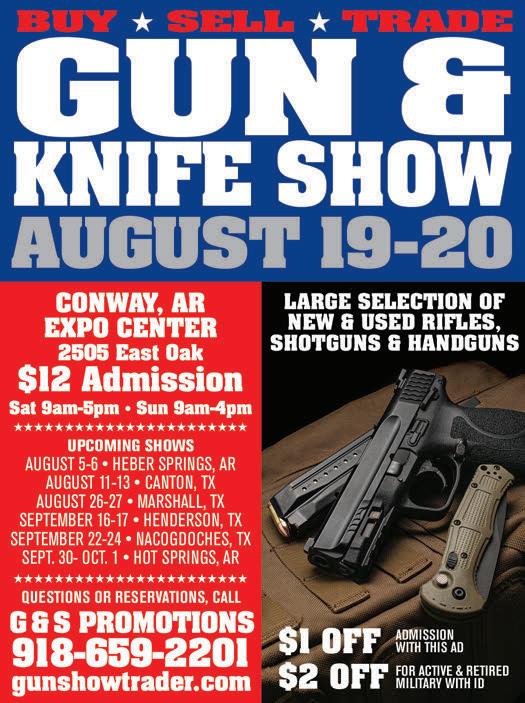


October 8, 2023
November 12, 2023
December 10, 2023
www.kcsshow.com
7:30 am to 1:30 pm
$7 Admission (Dealers in at 5:00 am)
Kane County Fairgrounds 525 S. Randall Rd. St. Charles, Illinois 60174

September 17, 2023
October 22, 2023
November 19, 2023
December 17, 2023
www.mcsshow.com
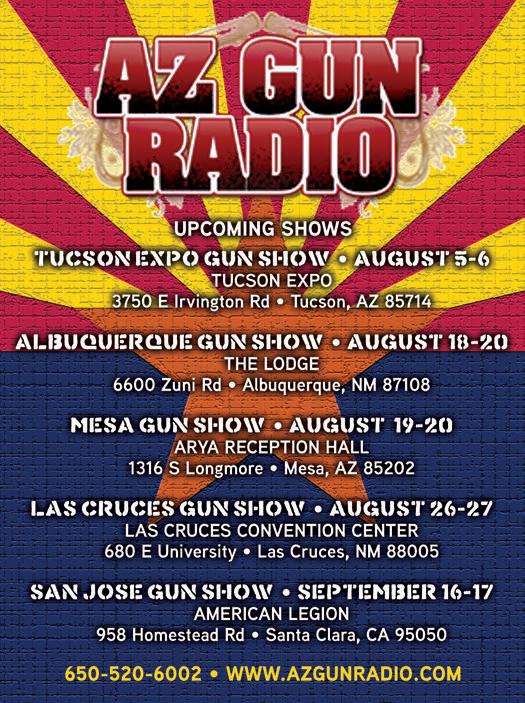
7:30 am to 1:00 pm
$5 Admission (Dealers in at 6:00 am)
McHenry County Fairgrounds 11900 Country Club Rd. Woodstock, IL 60098
For vendor space, contact Mick Stout at kcss@mickstout.com or (815) 217-2266
Constellation, Inc. • PO Box 26 • Kingston, IL 60145 www.kcsshow.com • www.facebook.com/KCSS.Constellation.Inc
Crossroads Of The West Gun Shows
G&S Promotions
Hernando
To have your event highlighted here, send an email to kaumann@media-inc.com.

Made of durable steel construction - heavyduty, sealed ball bearing motors - thermally protected - fast, quiet operation - 3/4 to 4 3/4 gallon capacity - industrial and rotary models available. Send for our free brochure!
TRU-SQUARE METAL PRODUCTS, INC. P.O. Box 585, Auburn, Washington 98071 TEL (253) 833-2310 or Toll Free 1-(800) 225-1017
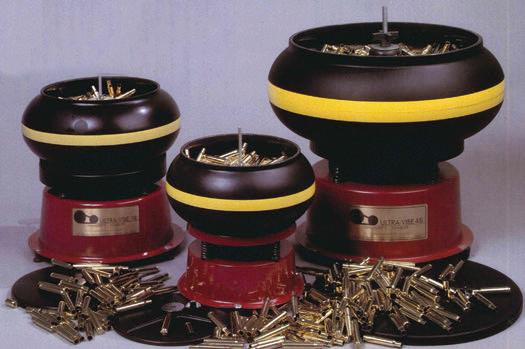

www.thumlerstumbler.com t-tumbler@thumlerstumbler.com
“Manufacturers of quality case cleaners, deburring and tumbling equipment since 1959”
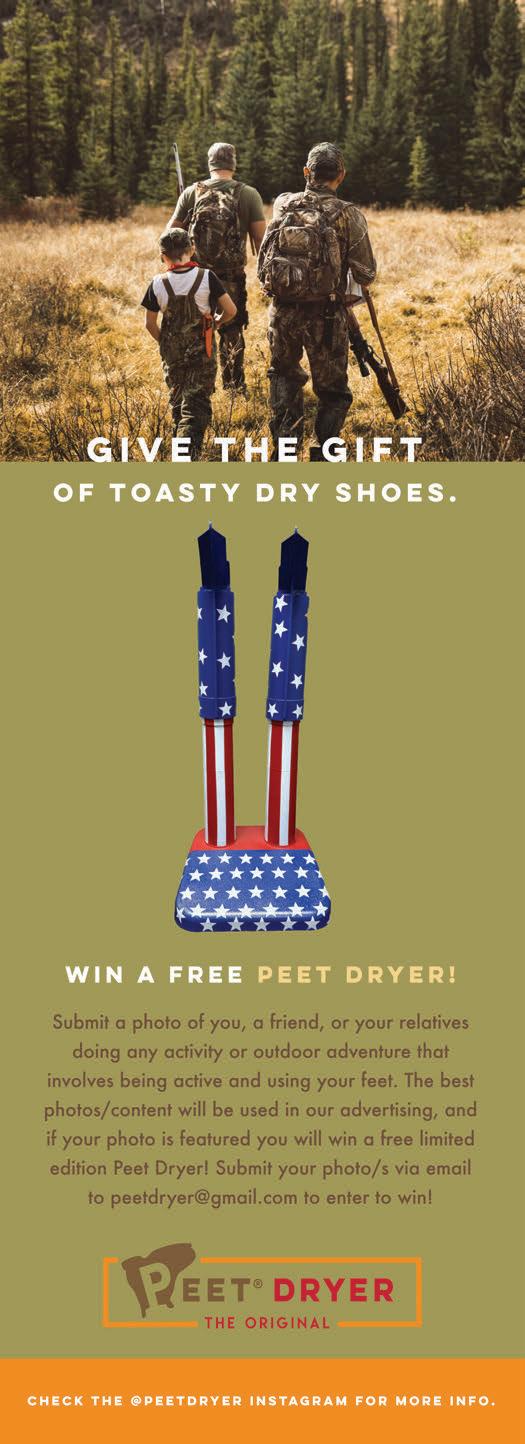


August 11-13
Utah August 2023 PTO Salt Lake City, Utah
usashooting.org
August 10-13
Area 3 Championship Alda, Neb.
August 12-13
Columbia Cascade Sectional Shedd, Ore.
uspsa.org

gssfonline.com
August 18-20
Battle for the North Coast Hartsgrove, Ohio
August 19

Rocky Mountain Regional Monthly Match Colorado Springs, Colo.
August 24-27
Area 8 Championship New Tripoli, Pa.
August 25-26
Greater Yellowstone Section Championship Roundup, Mont.
August 25-27
Illinois Sectional Havana, Ill.
August 12-13
Rocky Mountain Regional Classic Eaton, Colo.
August 19-20
Keystone State Ballistic Challenge Mertztown, Pa.
August 11-12
Kentucky State Shoot Edinburgh, Ind.
August 12-13
cmsaevents.com
Massachusetts State Championship Norfolk, Mass.
August 4-5
Steel City Shootout Bulger, Pa.
August 11-12
idpa.com
Potomac Grail Thurmont, Md.
August 26-27
Midwest Regional Classic Hallsville, Mo.
August 26-27
Northern California Regional Classic Richmond, Calif.
August 18-20
Ohio State Championship Eaton, Ohio
August 19-20
Mega Championship Weekend Mid Atlantic Lumberton, N.C.
August 13
Michigan State Match Dorr, Mich.
August 25-27
New England Regional Championship Harvard, Mass.
To have your event highlighted here, send an email to kaumann@media-inc.com.
September 28-October 3
Rifle & Pistol Olympic Trials Part 1 Fort Moore, Ga.
August 26-27
Minnesota Section Championship Match Forest Lake, Minn.
August 31-September 3
Utah State Championship Salt Lake City, Utah
September 1-3
Washington State USPSA Championship Custer, Wash.

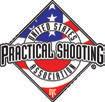
September 9-10
Benton Gun Club GSSF Challenge Bauxite, Ark.
September 15-17
Glock Annual Shoot & Gunny Challenge Talladega, Ala.
August 26-27
Connecticut State Championship Bethany, Conn.
September 2-4
Wyoming State Finals Lusk, Wy.
September 2-3
Kentucky Classic Wilmore, Ky.
September 3
New Mexico State Championship Los Lunas, N.M.

August 5 Silent Night
August 12
RCBS Rumble
August 12 Peterson Cartridge Challenge
August 19 Magnolia Meltdown
August 26 Impact Foundation PRC
September 2 Alpha Munitions Nut Crusher
September 2 W.A.R. Rifles Shootout


September 9 2023 Federal Gold Medal Match
September 23 Road to Redemption
September 23 CA Sharpshooter Showdown
September 30 Bushnell Tactical Gap Grind Pro Am
For more information visit www.precisionrifleseries.com
Ninnekah, Okla.
Pleasant Hill, Mo.
Kennerdell, Pa.
Carthage, Miss.
Wetumka, Okla.
Price, Utah
Tremont, Pa.
Carbon Hill, Ala.
Warrenton, N.C.
San Luis Obispo, Calif.
Finger, Tenn.

Conway Springs, Kan.
July 8, 2023
1st Place (tie)
BEN GOSSETT Open Div.
AUSTIN BUSCHMAN Open Div.
189.000/100.000
3rd Place (tie)
FRANCIS COLON Open Div.
KAHL HARMON Open Div.
187.000/98.942

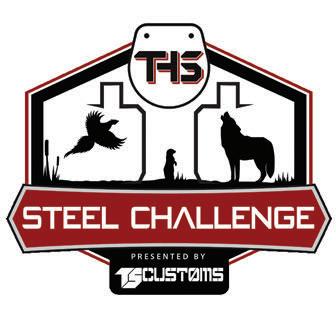
Fort Pierre, S.D.
July 15, 2023
1st Place
VIBBERT Open Div. 172.000/100.000 2nd Place
WILCZEK Open Div. 168.000/97.674
3rd Place (tie)

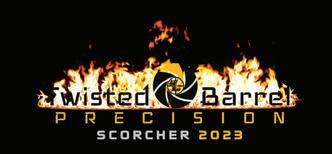
Little Rock, Ark.
July 15, 2023
1st Place
JOHN INDELLICATI Open Div.
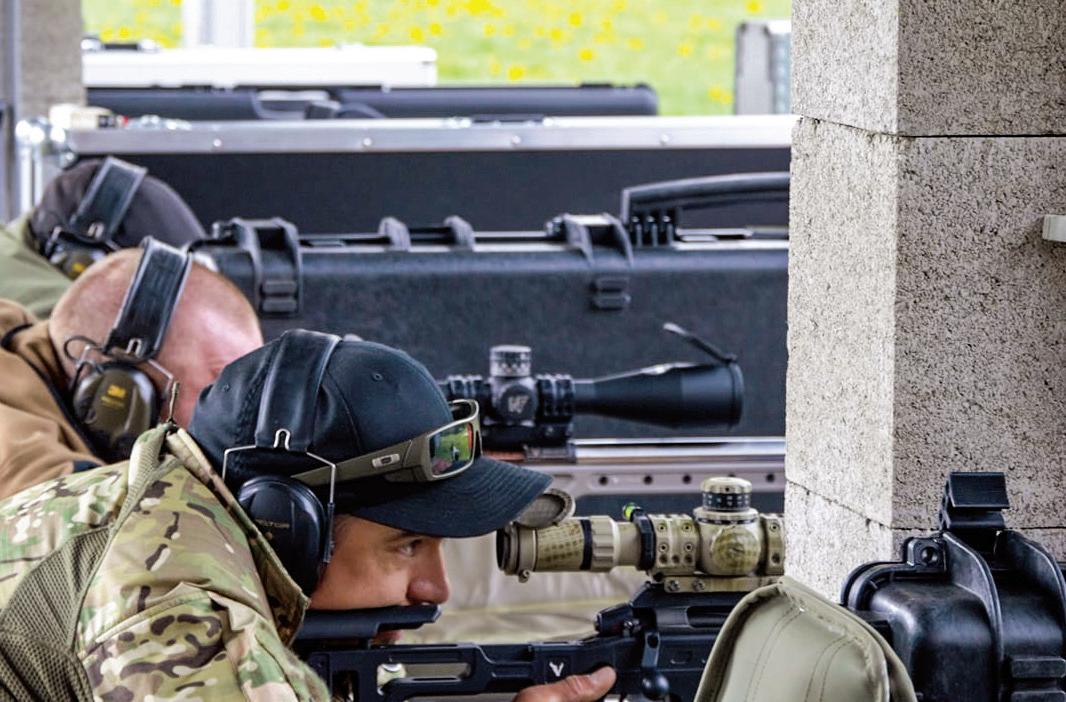
175.000/100.000

2nd Place (tie)
BRANDON HEMBREE Open Div.
DEREK WEBSTER Production Div.
174.000/99.429 (Hembree)/100 (Webster)

Conway Springs, Kan.
July 22, 2023
1st Place KEITH BAKER Open Div. 178.000/100.000

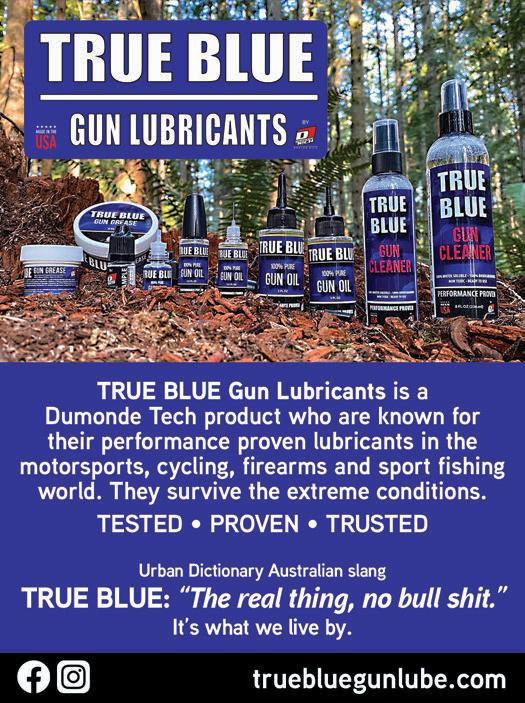
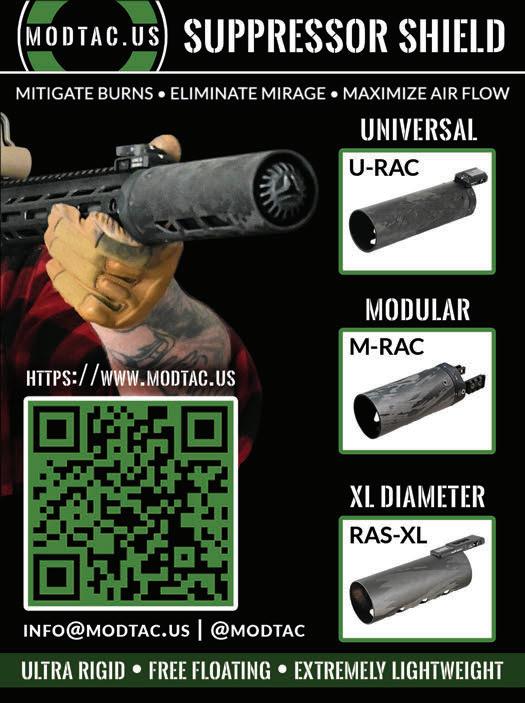

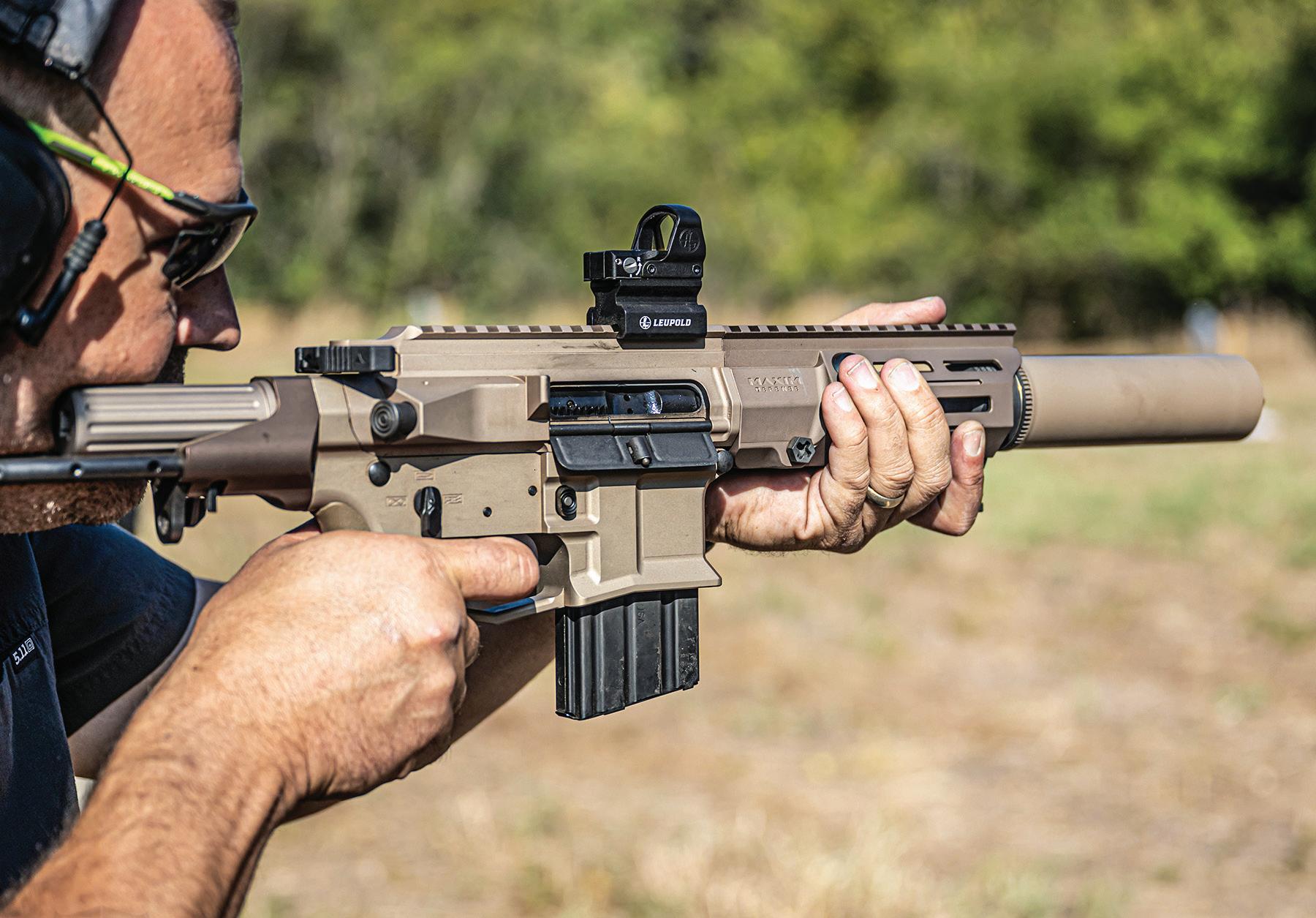
a dedicated suppressor area, and a long-range rifle range.
TriggrCon is bringing its three-day firearms event to the Midwest for 2023.
This year the venues have changed and are anchored around the thriving metro area of Wichita, Kansas. Not only does this allow more room for the show, which has a packed lineup, but it also offers endless dining, entertainment and lodging options for attendees.
TriggrCon is more than a gun show – it aligns the best and newest products with users, law enforcement, business to business, and media networking. This year’s show format is also new, with two days at Hartman Arena, then moving to the range at Severance Training Center on day three. Here, there will be pistol ranges,
The lineup this year is the strongest in the show’s history since its beginnings in the Pacific Northwest in 2017. Premier firearms brands like Staccato, Sig Sauer, CZ, Daniel Defense, Kimber, Nighthawk Custom, Walther and many more will be showcasing their firearms and live fire at range day. The show also will have part and accessory manufacturers debuting new products from great brands such as Stern Defense, Continuous Precision, Nomad Defense Co., TriggerTech, Timney and others. Magpul will be hosting a premier lounge open to all attendees to check out their product line, grab a beverage and relax at the show. Media and creators will also be on-site checking out the newest gear and meeting their fans and viewers.
TriggrCon’s history is rich in new products and innovation. TriggrCon is actually more than a catchy name,
• September 22-24, 2023
• Wichita, Kansas
• Days 1-2: Exhibitor Show at Hartman Arena
• Day 3: Range Day at Severance Training Center
• Scan this QR code for more info:

but also an acronym standing for Tactical Research Guns and Gear Review Convention. One of the core elements of the show is the Golden Triggr Award, presented to the most innovative products the industry has to offer. Many companies have waited to release new products until TriggrCon for this very reason.
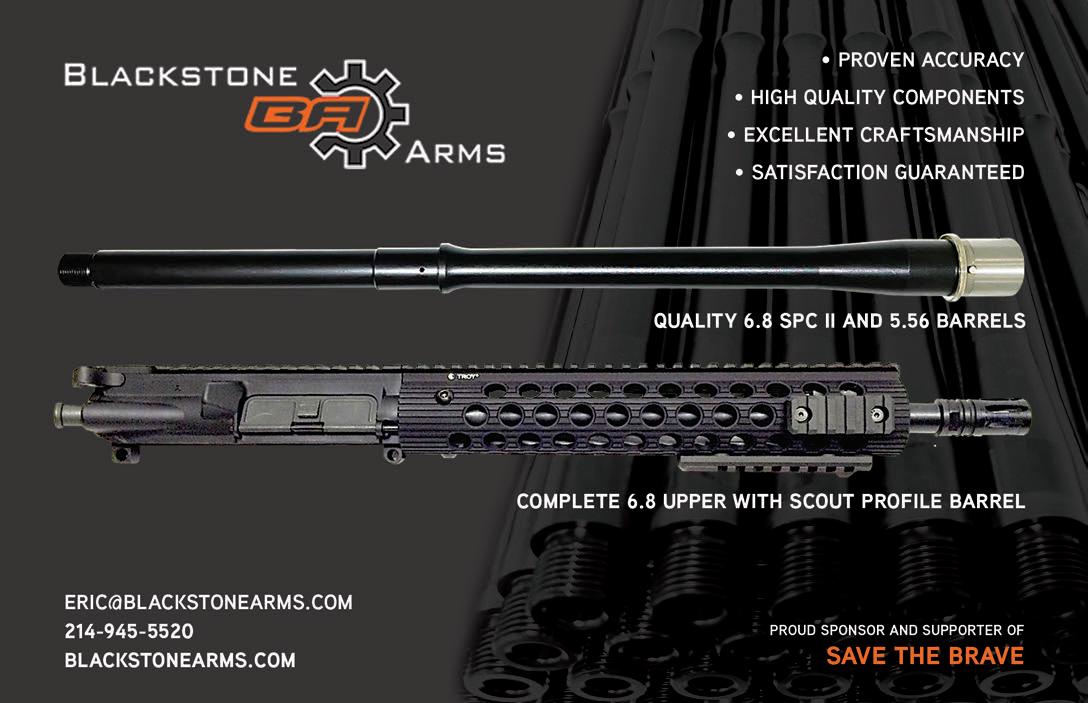

The event is open to the public and offers a professional environment for the firearms community to unite and connect. If you like firearms, the latest technology and access to industry stakeholders, this is an event you won’t want to miss. Friday night also features a VIP benefit party for The Resilient Warrior, a nonprofit organization supporting veterans and first responders with housing, care and quality-of-life improvement. The Golden Triggr Awards are also presented at this event. With good food, music, spirits and people, the VIP party is always a great time.
Editor’s note: For info, tickets, schedule and locations, go to triggrcon.com.

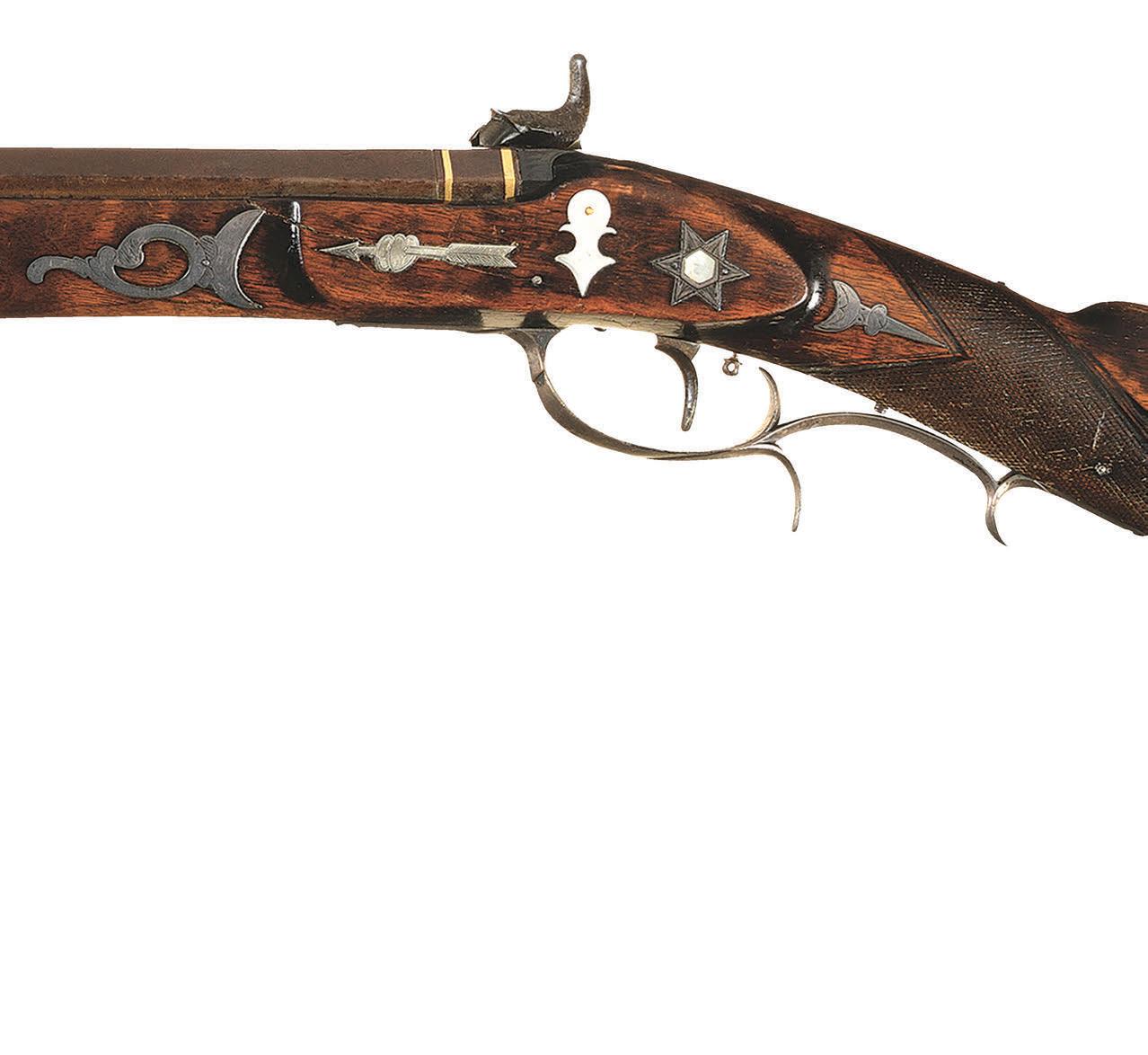
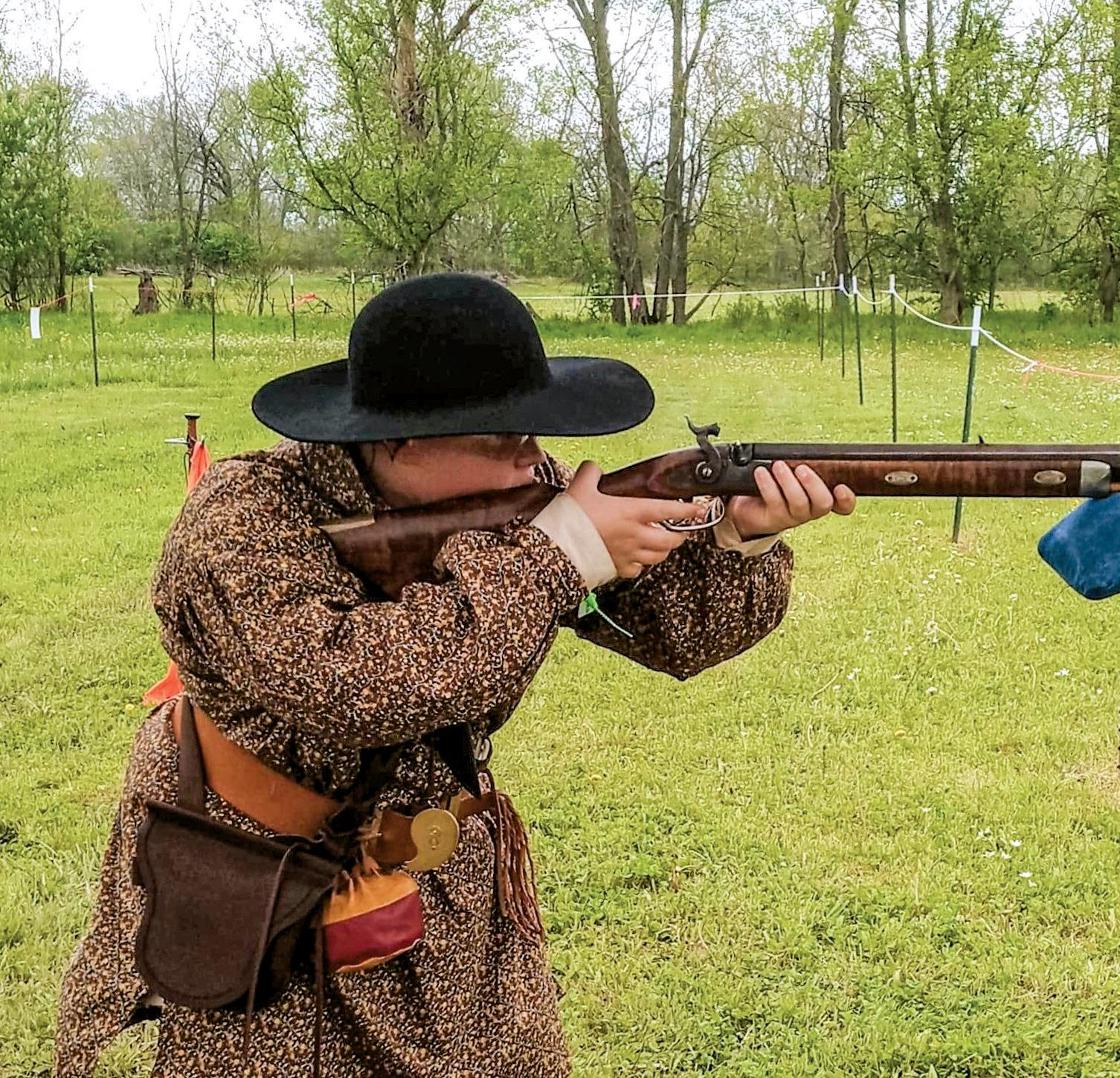 You can shoot a real Hawken – for free – at the 2023 Hawken Classic in Missouri. Visitors are invited to try shooting a traditional muzzleloading rifle, including this rare original 1840s vintage Hawken rifle generously provided by Greg Roberts of the Hawken Shop.
You can shoot a real Hawken – for free – at the 2023 Hawken Classic in Missouri. Visitors are invited to try shooting a traditional muzzleloading rifle, including this rare original 1840s vintage Hawken rifle generously provided by Greg Roberts of the Hawken Shop.
A historic celebration of St. Louis rifles and the opening of the Western frontier.
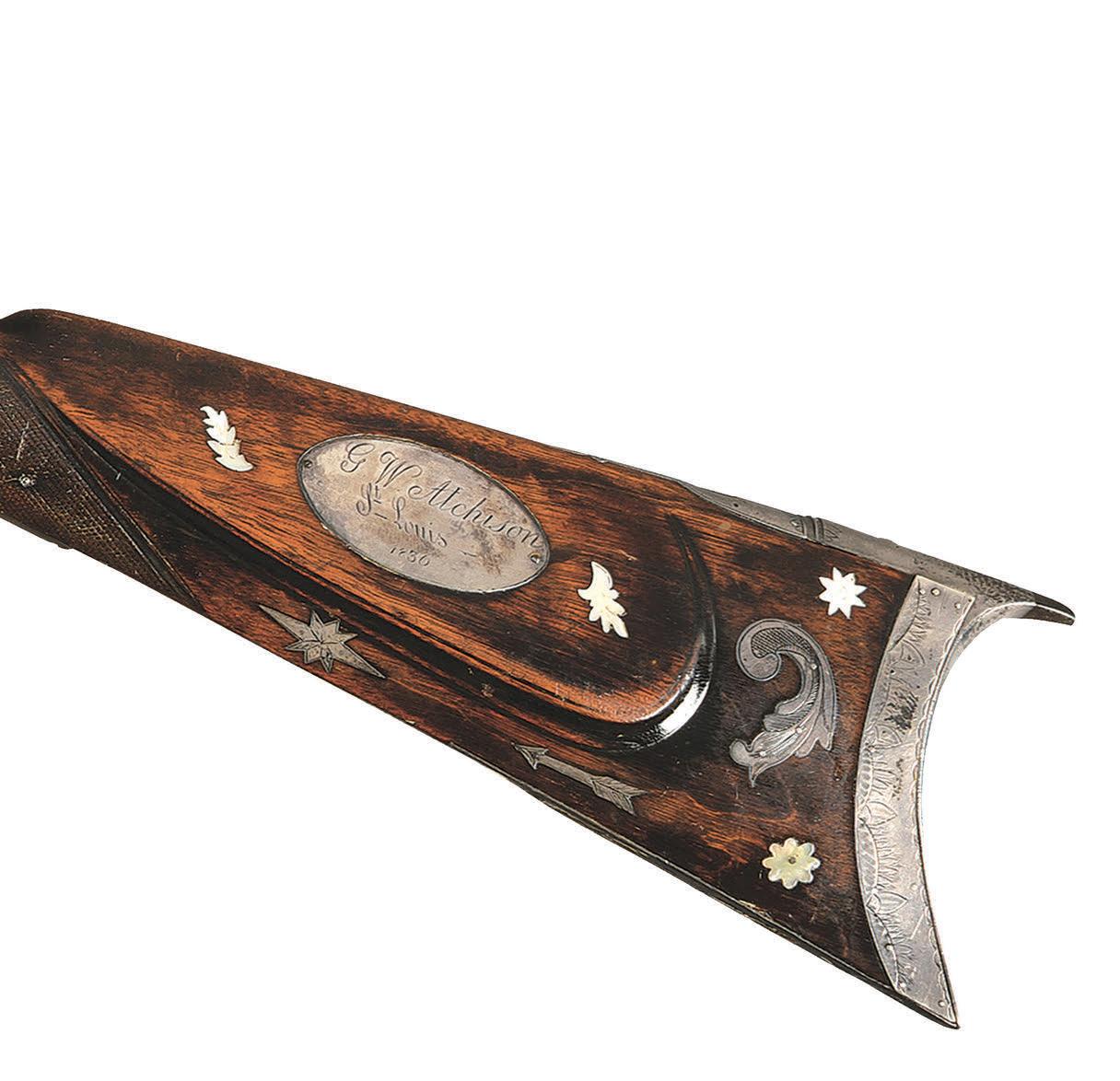
This August 2527, from Friday to Sunday, make a trip to Missouri to attend the 2023 Hawken Classic. It’s the second in a series of four outstanding annual programs where over 100 historic reenactors, craftsmen, sutlers, and some of the leading and most knowledgeable collectors of Hawken and other St. Louis firearms made from the 1820s through the 1850s will gather to celebrate the 200th anniversary of America’s first nationally famous high-end sporting arms brand created by brothers Jacob and Samuel Hawken. The event, held at the Historic Daniel Boone Home in Defiance, Missouri, will allow visitors to learn about the expansion of the American West and the contributions made by Hawken rifles, as well as those made by their lesser known competitors.

There are two really amazing things going on at this three-day event. The first is a one-of-a-kind graduate school level opportunity to learn about Hawken and other St. Louis gunmakers through unprecedented access to experts in the field who have collectively spent over 100 years researching and millions of dollars building private collections that include many of the most important and outstanding original firearms extant. These antique arms are rarely, if ever, seen by the general public. Throughout the event, an exhibition of approximately 75 rifles, shotguns and pistols will be on display at the Sappington House, located on the west side of the Boone Home site, a short walk from the Boone house itself. The collection was curated by four advanced collectors who will be present to answer visitor questions. For those with a serious interest in American firearms history, and
the guns of the Hawken brothers and their St. Louis contemporaries like H.E. Dimick and J.P. Gemmer, think of this as akin to walking in on some esteemed university professors during their office hours and having an in-depth discussion without having enrolled in the school or paying the average rate of $1,000 per credit hour that graduate school classes cost. Those kinds of introductions are hard to get in the real world, just like an up-close look at these rare guns.
THE SECOND ASPECT of the Hawken Classic is a great public/living history program for kids and adults alike. Families, students, history buffs and the merely history curious can experience the sights and sounds of a frontier village populated by tradesmen and camping mountain men during rendezvous when they gathered to sell their furs, resupply for the next venture and socialize. Visitors can try their
hand at learning some of the skill sets that allowed the intrepid explorers, hunters, prospectors and fighting men of a fledgling nation to survive in, and ultimately thrive in, the wild frontier west of St. Louis, Missouri.
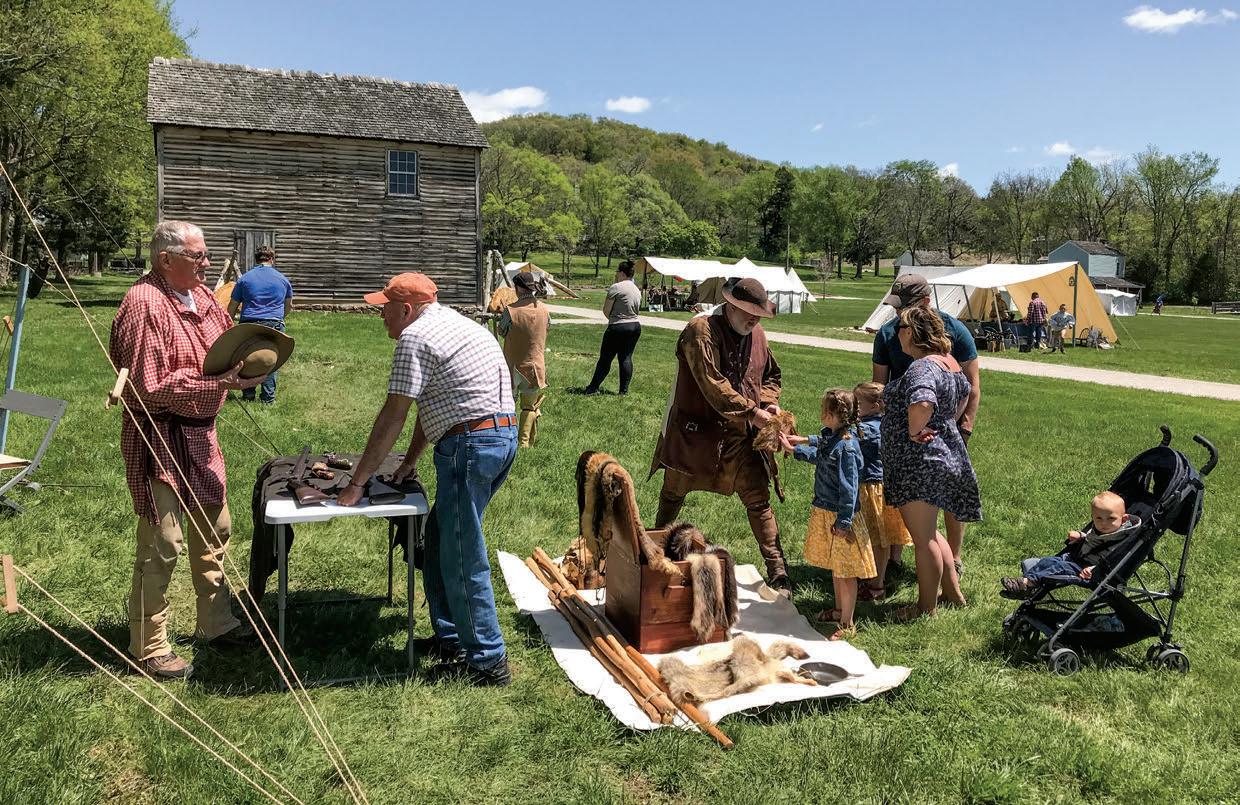
The adventurous independence of spirit that characterized so many of the restless, freedom-loving people of early America wasn’t cowed by fears of starvation and hardship, crossing vast distances and uncharted areas, deadly heat or cold, hostile Indians, lethal predators or seemingly impassable terrain. Rugged and often rough-hewn, they relied on themselves to meet every challenge, every day. Their legacy is still present in every American who will not be deterred from the pursuit of their dreams, bravely does what needs to be done, and doesn’t tolerate anyone telling them what to think.
Though their motivations and goals varied in the 40 years that
they trekked the plains and Rocky Mountains between the Mississippi River and the Pacific coastline, they were then, and are still today, called mountain men. The likes of Jim Bridger, Kit Carson, Seth Kinman, Jedediah Smith, William Sublette, Hugh Glass, Jim Beckwourth, and John “Liver-Eating” Johnson (the real-life inspiration for the fictional Jeremiah Johnson) were well known in their day. Most of their fellow frontiersmen are forgotten, but their combined efforts paved the way for White settlement and the fulfillment of what Americans of the era saw as their Manifest Destiny to control the continent from ocean to ocean.
There will be ongoing demonstrations around the site by men and women in authentic period attire. Visitors are encouraged to explore the rendezvous encampment and engage the mountain men with their questions. Some may look scary, but they are there to share their love of the time period with visitors and delight in presenting “living history.”
The Early Arkansas Reenactors Association will exhibit their full-scale replica keel boat. This type of vessel
was used extensively to move men and goods in and out of the frontier along rivers in the mid-1800s. Visitors can board the craft for a crew’s eye view of the compact boat and learn about the skills needed to operate and navigate it along the river highways of the West.
The Rendezvous Competition is an event within the event that I consider a must-see for visitors. Reenactors will stage the pageantry and braggadocio of an actual mountain man shooting, knife- and tomahawk-throwing, and fire-starting contest, minus the drunkenness and obscenity for the sake of a family audience.
Craftsmen, many of them recognized as artists in their specialties, will be demonstrating how to weave a basket, forge a Bowie knife in the manner of a frontier blacksmith, work wood with hand tools, start fires with only those

materials gathered from the ground, and more, now nearly forgotten, skills that were common knowledge in the 1800s. Some of these activities are participatory, like fire-starting, traditional archery (the modern compound bow wasn’t invented until the 1960s), and shooting black powder muzzleloading rifles.
AS THE HAWKEN Classic is sponsored by the National Muzzle Loading Rifle Association with the goal of educating the public about the role of the iconic Hawken rifle in America’s history, the NMLRA will set up a free shooting range where visitors can try firing traditional black powder muzzleloading guns, including a rare original 1840s vintage Hawken rifle generously provided by Greg Roberts of the Hawken Shop.
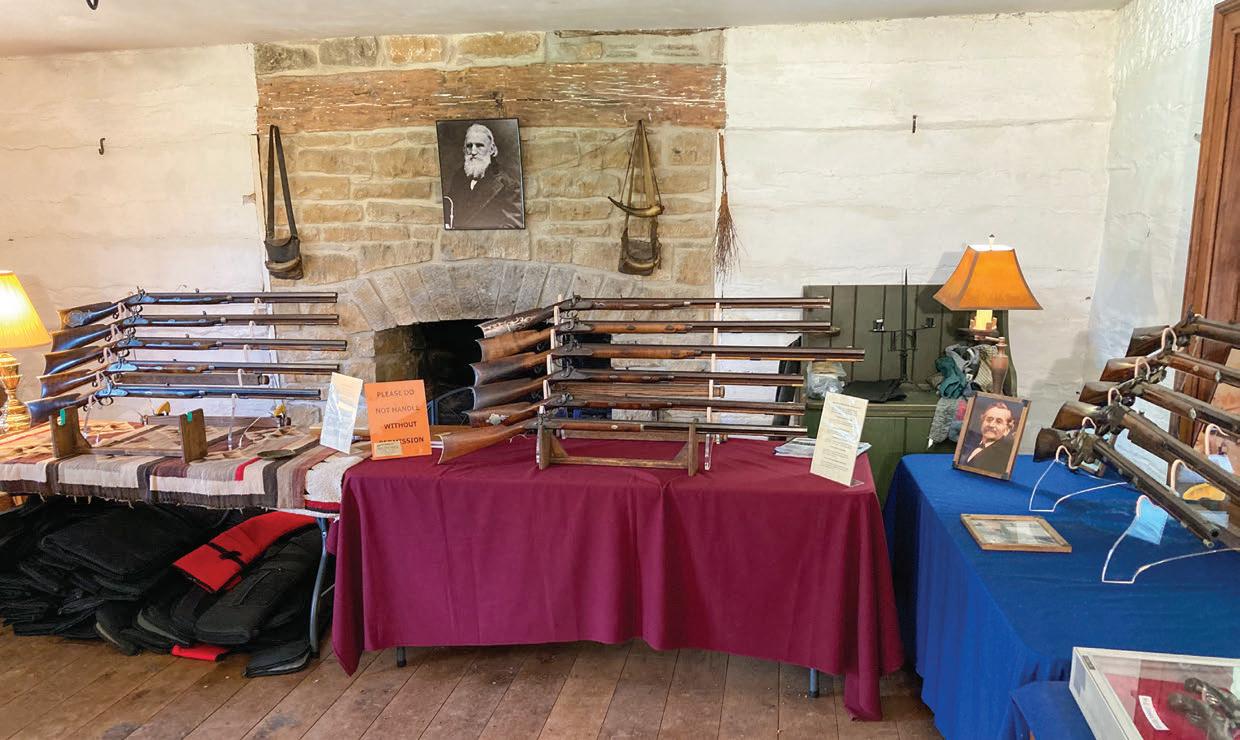
traditional-style replica percussion or flintlock muzzleloading long guns and pistols, Hawken or otherwise, are encouraged to bring them to demonstrate their offhand shooting skill (or lack thereof) on the range’s 25-, 50and 75-yard hanging steel targets. Bring powder, ball/shot, patches and priming for your own guns and remember to get them tagged at the gate when you enter. There will be an NMLRA-certified range officer present to oversee range safety. Shooters will have four firing lines spaced out about 25 yards apart. Each shooter can fire once at each of the three targets in their line for fun and the challenge. Depending on how busy the shooting range is, more shots for each shooter may be allowed. A range waiver must be read and signed by everyone who wants to shoot. No modern guns will be allowed on the range.
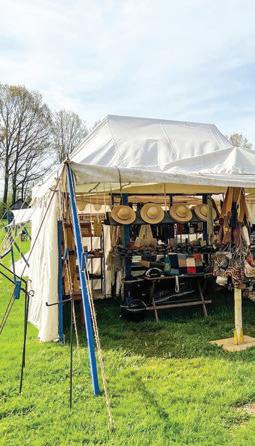
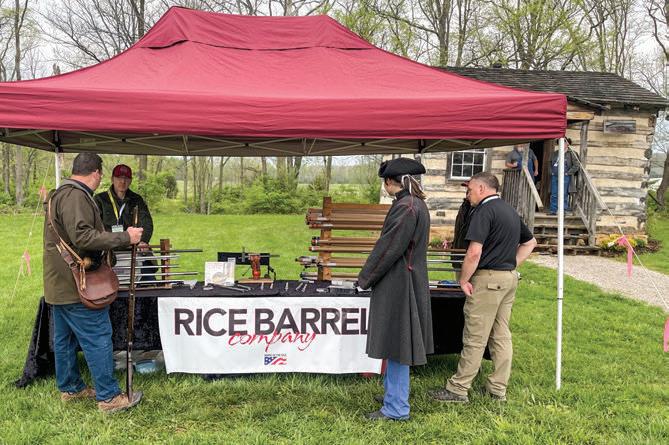
In addition to the shooting and living history program, several one-hourlong educational seminars will be held each day in the pavilion. The lectures will be conducted by experts whose breadth of study in their subjects greatly exceeds anything one could expect to find in a typical university setting. Unlike college classes, these fun, factual and often deep-diving seminars are also completely free, limited only by available seating. Seminars conclude with ample time for questions from the audience and discussion. Some seminars are repeated on multiple days.
Among other presentations, Bob Woodfill will speak on “The Flintlock Hawken”; Wilson Windham (Masonic Mountain Men) will present “The Mountain Men Era and the Hawken”; Greg Roberts and Art Ressel will deliver a lecture on “The History of the Hawken Rifle”; and Benjamin Gall will lecture on “Supplying the American Fur Company: The Hawken Brothers in St. Louis”. Pablo Baum will deliver three exciting lectures of frontier adventure and mayhem: “The Incident at Skull Lick Creek”, “Treachery on the Oregon Trail: The Donner Party”, and “Terror on the Santa Fe Trail”. Dick Walsh will present “Brain Tanning: An Easy Guide”, and Bob Browner, an accomplished traditional gunsmith who has built many Hawkens, will lecture on “Building

getwhat you
needto make your own Hawken too. Last year Rice Barrels, one of the most respected makers of top-quality barrels for traditional muzzleloaders, attended the event. There will be many vendors of 1820s-1850s period replica products including clothing if you want to equip yourself from head to toe like a mountain man.
the Hawken Rifle”. Finally, Jack Mitch, Gerry Messmer and Scott Amish Staggs will present “William Ashley’s Return From His First Rendezvous and The Super Hawken”. Visit gemmermuzzleloadingclub.com for the latest schedule of seminars and events.

THE 2023 HAWKEN Classic will be held at the Historic Daniel Boone Home at Lindenwood Park, which is about 35 miles west of downtown St. Louis in Defiance, Missouri. The site is a composite early 19th century pioneer village that includes over a dozen structures original to the site, as well as historic buildings relocated there from other parts of the state. The main focus of the village is the elegant two-story stone house situated on high ground at the southeastern edge of the settlement. The largely Georgian-style house was built by Nathan Boone, Daniel Boone’s youngest son, as a residence at the start of the 1800s. He lived there until 1837 when he moved his family farther south. The house is closely associated with Daniel Boone because in 1804, shortly after it was completed, Daniel and his wife Rebecca moved in with Nathan and his family and spent most of their time there through 1813 and then again from 1816 to 1820 when the great frontiersman died on the premises. Tours of the house are offered by the park for a fee ($8 adults and $5 children), but only the first floor and lower level are wheelchair accessible. Fortunately, the rest of the Hawken Classic activities are handicapped friendly, and there will be golf carts onsite to assist those with mobility limitations.


The event and its activities, excluding tours of the Boone Home and food, are free. Parking is free too. If you aren’t bringing your own food and drinks to picnic, you can buy them onsite from 10 a.m. to 4 p.m. each day. Cheeseburgers top the menu at $6, but you can get a hotdog for $2. If you have any folding money, there’ll be reproductions of all manner of early 1800s merchandise, short of complete rifles, for sale at the event from some of the best vendors
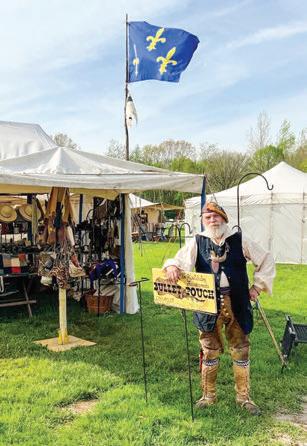
By the geographic virtue of its location at the confluence of the Mississippi and Missouri Rivers, St. Louis became the gateway to the West. Many commercial and exploratory ventures were launched into the wilderness there. Most returned. Gradually, as the decades passed, the frontier west of the Mississippi was explored to exploit its wealth of resources in furs and gold, and trails were opened up to effect White settlement. Whether actually settling or just passing through, the frontier was a dangerous place for Whites to be. It was exactly the kind of place where you really needed solid, reliable guns. Native Indian tribes remained a threat until the United States Army concluded the Indian Wars at the end of the 19th century.
As a result, from the 1820s through the 1850s, St. Louis, Missouri, was a great place to be a gunmaker. It was there that the Hawken brothers made a name for themselves producing
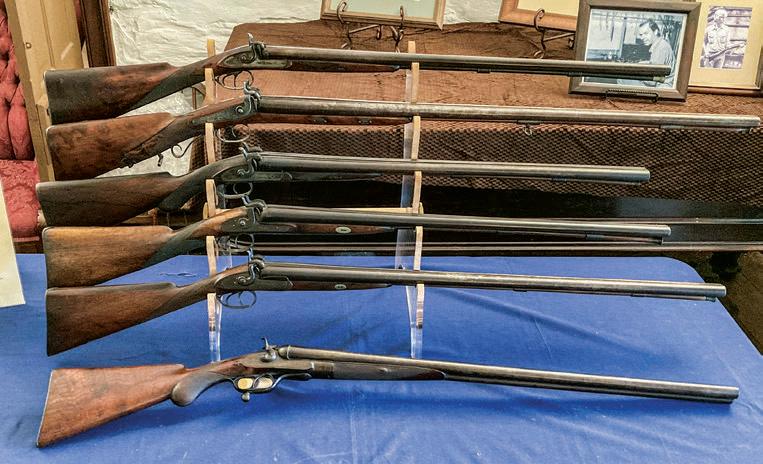
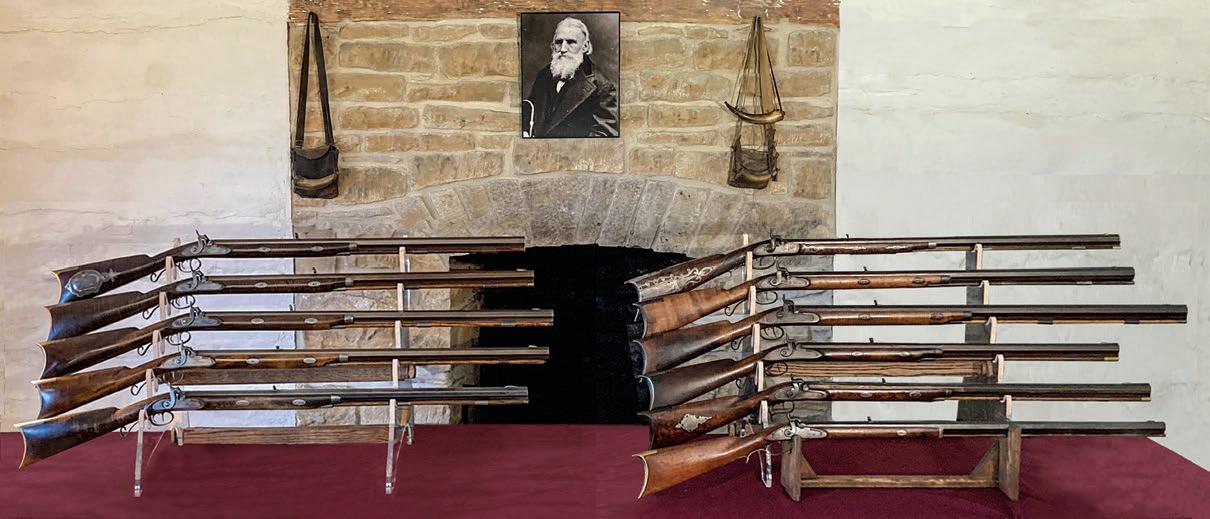

excellent arms. Hawken became synonymous with quality, durability and accuracy, and they were America’s first nationally famous, top-tier sporting arms brand. They proudly marked their guns with their name in various ways and places to indicate their pedigree.
Contrary to myth, Hawken rifles
weren’t ubiquitous on the frontier. They were expensive and just like today, not everyone can own a Cadillac. In their period of greatest production, they made only about 200 rifles a year. The majority were sold into the local market around St. Louis rather than to mountain men. This created an opportunity for other

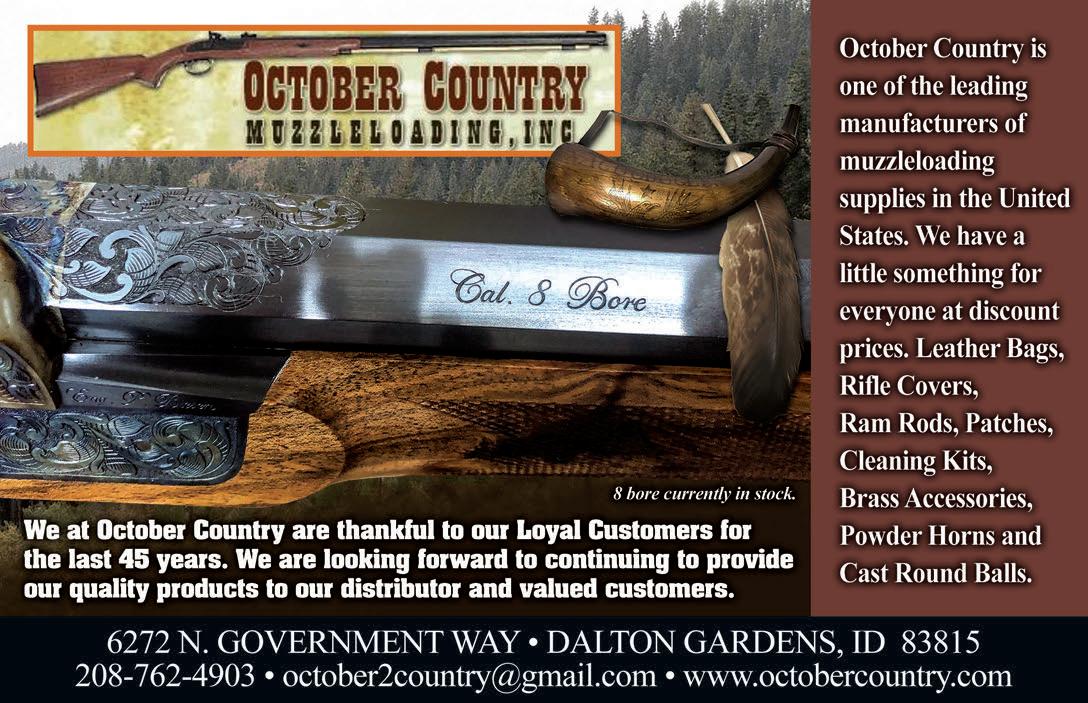
gunmakers to capture a slice of the market.
Hawken’s quality was matched by some of their competitors. Johann P. Gemmer and Horace E. Dimick even exceeded Hawken, thanks to advances in manufacturing technology that allowed more consistently superior products to be made more efficiently. (Hawken rifles were, after all, handmade one at a time and each one was slightly different.) Gemmer, a former employee of Sam Hawken turned successor, was also an excellent and imaginative engineer. One of his niche specialties was converting Civil War surplus Spencer carbines into fine sporting rifles. Dimick was a later competitor to Hawken and couldn’t catch up to, much less overtake, the Hawken rifle’s established reputation in the marketplace.
The Sappington House exhibit includes many important guns from Hawken, Dimick, Gemmer and other St. Louis makers, as well as some plebeian but historically significant Northwest trade guns made specifically for bartering with the Indians. Available at bargain prices, they were often used by White settlers on a tight budget.
Upwards of $1 million worth of antique arms, around 80 pieces, will be exhibited in three first-floor rooms of the Sappington House. In today’s auction market, the sale prices of the more common, good original condition, solid Hawken plains rifles usually start at $50,000.
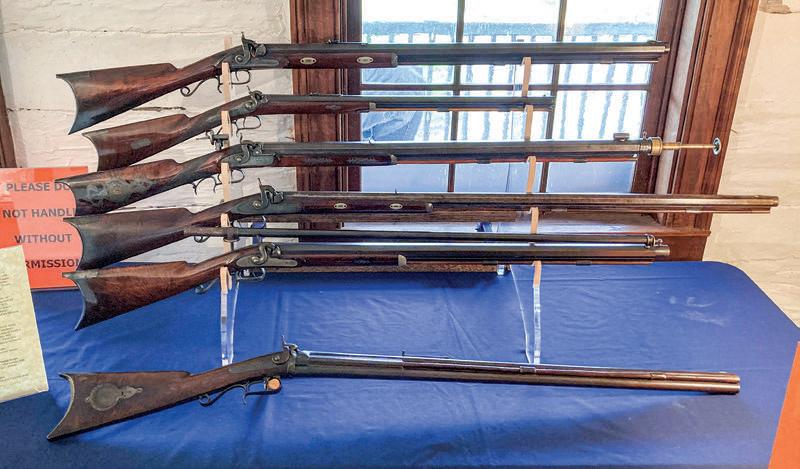

The Sappington House is a historic structure that was moved from its original location in St. Louis County to the Boone Home park. The Sappington family was prominent in the development of St. Louis alongside the Chouteaus, Sublettes and other preeminent families of that time. The Sappington and Hawken families were actually united by marriage, so it’s possible that this was not the first time that Hawken rifles have been present in the house.
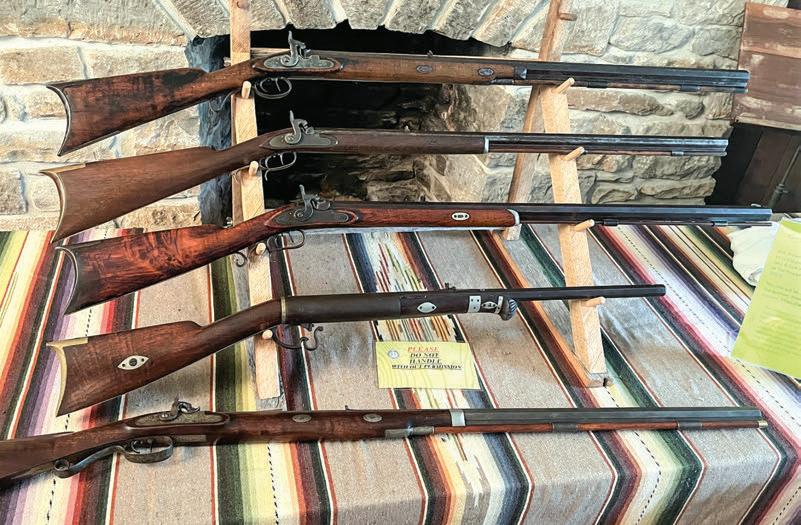

Participants in the event will don authentic clothing and gear. Visitors are welcome to do the same and jump into the historic time warp of the event.

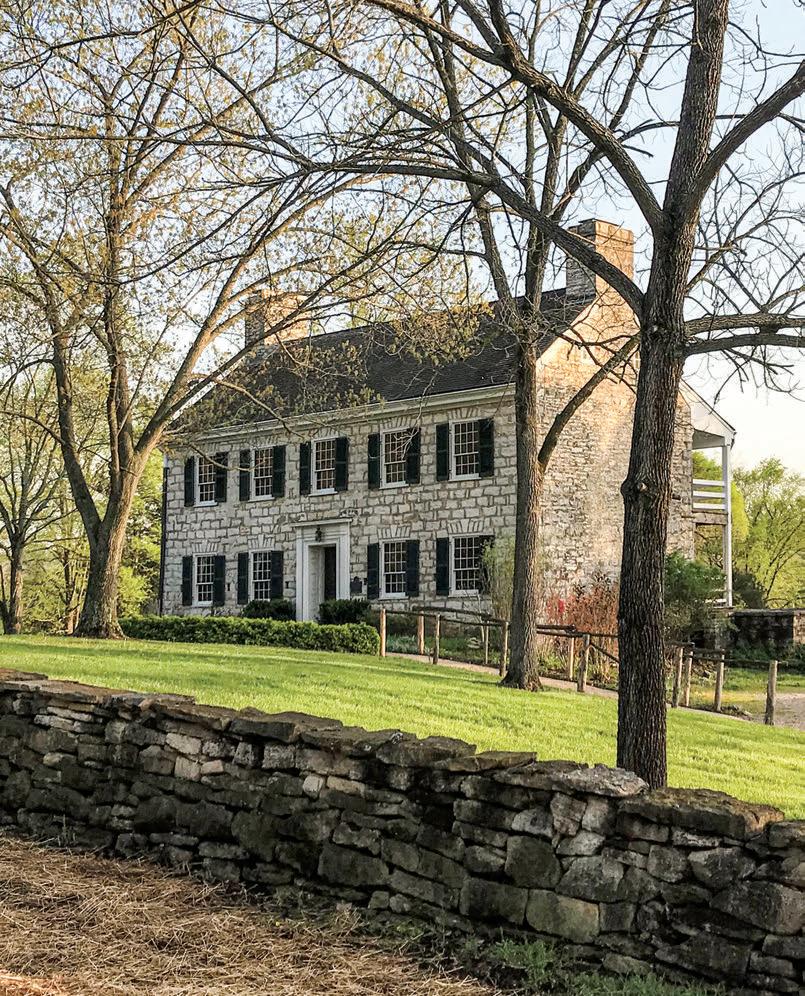
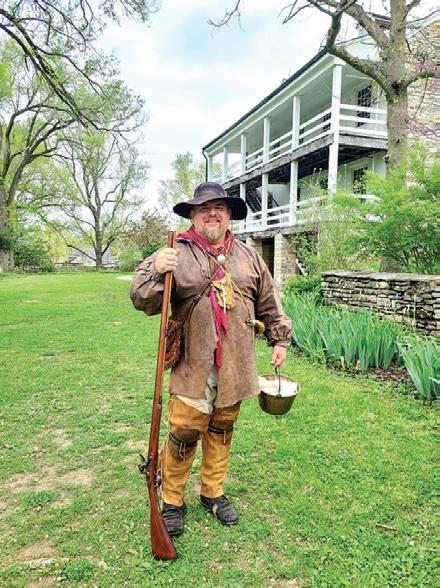
There’s lots for kids and grownups to see and do. Here, a reenactor instructs youngsters how to start a fire oldschool style.
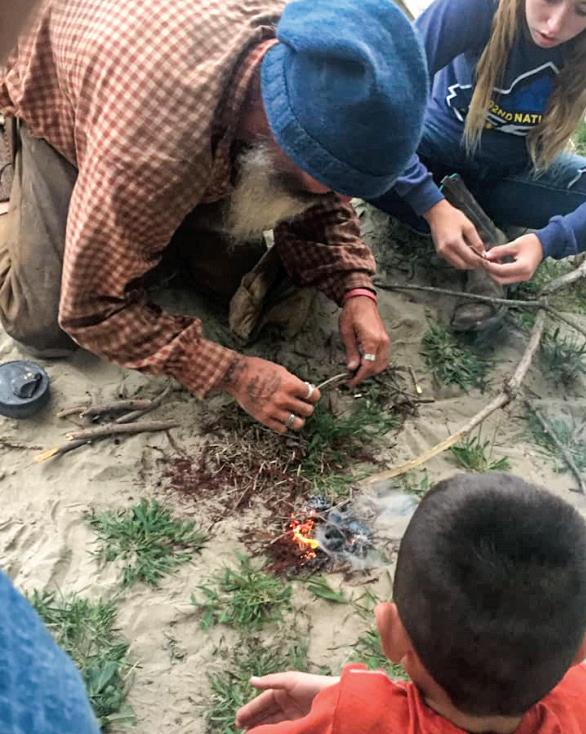
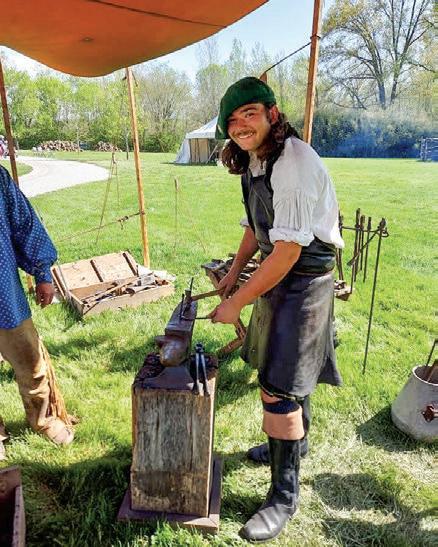
in the country.
The Hawken Shop will set up a combination historic display and retail store in the village where you can inspect, and order, a contemporary Hawken rifle for yourself. If you are the DIY type, you’ll find what you need to make your own Hawken from the many parts vendors in attendance. In the extensive outdoor sutler area on the central field, you’ll find A Second Chance at History, Callahan Bag Molds, The Marquee Trading Company, Trail Creek Trade Company, Powder Horns and More, Mz T’s Fiberworks, and many more companies offering all the 1820s to 1850s period accoutrements and clothing you need to equip yourself from head to toe like a mountain man from two centuries ago.
For as little as $1, attendees can buy a raffle ticket for a chance to win one of the many 19th century rendezvousworthy themed prizes, including a Head Lok throwing tomahawk from the Hawken Shop, handmade powder horn and shooting bag sets by Brad Dickinson and Mark Hasty, a bullet mold from Callahan Bag Molds, original art, and other quality prizes donated to support the event. You need not be present to win at the Saturday drawing, and tickets can be purchased online or onsite at the information tent.
In the realm of fine art, noteworthy is the planned attendance of the well known painter David Wright, recognized for the historic accuracy and detail of his early American themed work. He created Taking the Long Shot to promote the Hawken Classic and will sign prints and posters sold at the event, with proceeds going to support the NMLRA.
Missouri State legislator Mazzie Boyd, a pro-gun advocate, will be at the Hawken Classic on Saturday to meet her fellow Missourians and shoot a replica Hawken made by gunsmith Bob Browner. When historic artist Kyle Carroll proposed the idea of making the Hawken rifle the official Missouri State Firearm to Representative Boyd, she became the driving force behind it and got that legislation passed in the state house.
Take it from me, the 2023 Hawken Classic is too good to miss!

Dates: August 25-27, 2023
Location:
The Historic Daniel Boone Home St. Charles County, 1868 Highway F Defiance, Missouri 63341
Times: Friday, August 25 – 10 a.m. to 4 p.m. Saturday, August 26 – 9 a.m. to 5 p.m. Sunday, August 27 – 12 p.m. to 4 p.m. Other than service dogs, no animals are permitted on the event site.
Lodging options:
Nearby hotels include the Best Western in Washington, Missouri, and the Holiday Inn Express and Sleep Inn and Suites in O’Fallon, Missouri. Remember, even hotels in St. Louis are less than an hour away by car. Beyond the Trail RV Park is located in Defiance itself, only 10 minutes from the event. Cabin and tent camping at nearby Klondike Park offers a more rustic and inexpensive option, but reservations are advised.
Website: gemmermuzzleloadingclub.com/hawken-classic Facebook page: facebook.com/hawkenclassic
Email: hawkenclassic@nmlra.org
Future event dates: September 27-29, 2024 September 26-28, 2025

 STORY AND PHOTOS BY MIKE NESBITT
STORY AND PHOTOS BY MIKE NESBITT
Some of these things might have been said before, but if so, they’re simply worth saying again. These little secrets about black powder hunting mainly involve loading and keeping your rifle or smoothbore in the best condition to fire.
Because, as too many seem to find out, if the shot doesn’t go off, it doesn’t get you any meat or trophies.
Most of the little mistakes we make with our muzzleloaders result in misfires, or rifles that remain terribly quiet when we wish they would speak with roaring authority. And because we are talking about hunting, the first try is usually the best try – that all-important
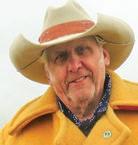
first shot. If that shot fails, it is often the very same as a missed shot and our chance for taking game is usually gone, given how long reloading takes.
OIL IN THE barrel, such as in the case of a new rifle, can easily lead to misfires. It is far better to have a very clean barrel. Oil can soak into the powder to the point that it can’t be ignited. Grease
in a barrel can be worse because it has the tendency to block the flash channels, either in a patent breech or with a drum and nipple on percussion rifles, as well as in the flash-hole of a flintlock, which renders those rifles unshootable. In order to be certain that the rifle will fire when we want it to, clean the barrel as thoroughly as possible, from all entries, both the muzzle and the breech.
Cleaning or wiping from the breech end can involve making sure the flintlock’s flash-hole is clear with a pipe cleaner. Most drum and nipple percussions have a clean-out screw that can be removed, so the pipe cleaner can be used on those too. For patent breeches, things are not quite as easy, but a thorough flushing with hot water will most often do the trick. Then let the breech dry completely before
loading for the hunt.
While loading the rifle for hunting, I usually wipe the bore dry, pour in the powder and then lubricate the bore again with the greased patch that is wrapped around the ball. The act of loading will swab the bore with patch lube, but it is certainly best to have the barrel clean to begin with.

The real reason for wanting a clean barrel is so the flash channel on a percussion rifle, or the flash-hole on a flintlock, is also clean. Anything plugging those holes will generally result in a misfire. And misfires often translate into empty game bags, which contributes highly to forgettable hunts.
ANOTHER HABIT OF mine is to remove the nipple after loading a percussion rifle to visually check for powder in the breech, or in the drum under the
nipple, for the cap to ignite. If powder is not visible in the flash channel just below where the nipple will rest, there is a big question about whether the rifle will fire or not. The flash from the nipple cannot be trusted to go anywhere but in a straight line in either a patent breech or with a drum and nipple. When powder is not visible, I add just a touch of FFFFg from a flintlock pan primer and then reinstall the nipple. That is one way to greatly increase the potential for good ignition.
After carrying the percussion rifle hunting for a day, and then leaving it loaded but unprimed overnight, I remove the nipple again the next morning to repeat that last step. Powder that was compressed when the rifle was loaded has a way of rearranging itself slightly so the



powder charge will no longer be as tight as it was just after loading. This means that the powder that was under the nipple might have moved farther forward, due to some slight shifting of the irregularly shaped grains, and more priming powder needs to be added under the nipple.
Be sure you don’t add too much powder under the nipple. That powder must not be compressed or crushed by the nipple when the nipple is screwed back into the breech or drum of the gun. Powder that is compressed by the nipple seems to form a glaze on its surface and then it becomes very hard
to ignite. The powder under the nipple, whether it is priming powder or just a small portion of the main powder charge, must remain loose. At the same time, that powder must simply be there in order to get good ignition.
Some of you may think that removing the nipple to check for powder is being just a little too careful. One of my old partners felt that way; he never liked to take that added precaution. In fact, he’d ask me, “Why do you take the time to do that?” when he’d see me making those checks. I’d usually reply, “So my rifle will go off!” or something like that, without ever
expecting to have an opportunity to prove it.
But that opportunity later came on a deer hunt, while he was using one of my percussion rifles. We’d hunted for a day without seeing anything but tracks and he watched me check under the nipple again the next morning. He did not bother checking the .54-caliber rifle he was using. That afternoon he was watching an area when a fine doe stepped out just in front of him. A doe was just what he wanted and it was an easy shot. He was sitting down, hammer back and trigger set, and the deer was just a few yards away.
THE PREMIER SPORTING GOODS STORE ON PRINCE OF WALES ISLAND
FOR ALL YOUR FISHING, HUNTING, AND CAMPING NEEDS! KNOWLEDGEABLE STAFF WILL LET YOU KNOW WHERE, WHEN AND HOW!



Everything was perfect except that the rifle didn’t fire. The cap fired loud and hard, more than enough to spook the doe, and he never got another chance with that deer.
WHEN USING FLINTLOCK rifles, checking the priming powder is even easier and, again, I check for the powder occasionally, at least every morning, while hunting with a flintlock or smoothbore. The powder in the barrel can shift slightly and thus can fall away from the flash-hole on the inside. Another possibility is for powder to fall out of the flash-hole. Either way means there may not be powder immediately inside the flash-hole, and having powder available for the flash from the pan is necessary for good, fast, consistent and reliable ignition.
If there is no powder behind the flash-hole inside the barrel, I simply add a little more to the pan and push some of the FFFFg through the hole
until the powder in the barrel is tight and can be felt with a flash-hole pick. Having powder packed in the barrel, on the other side of the vent and yet not in the vent, always makes for the best ignition with flintlocks. When carrying a flintlock on a hunt, we naturally take more care in the loading and priming of our guns, but we should be that careful all of the time.
Another thing to do while hunting is to load the rifles with a nonevaporating patch lube. We never really know how long the rifle will remain loaded when we start out on a hunt and a spit patch can dry out rather quickly. Spit on a patch is good, but only if you’re going to shoot that load right away, before the dampness of the patch can dry out. There are several greases available and they are all good; just be sure to use a lube that will not dry or evaporate, regardless of weather conditions. I prefer the precut lubricated patches that are sold by
Bridgers Best, from The Gun Works, because those patches make life for a muzzleloading shooter a little simpler and they are very good.
One more thing about flintlocks, and this is in the primary interest of safety. In short, don’t ever check the spark of the lock while the gun is loaded, even while the priming pan is empty. A spark is all that is needed to ignite the powder inside the barrel and if one of the sparks from the frizzen bounces around in the pan enough to go into the flash-hole, the gun more than likely will discharge. In other words, sparking the lock on a loaded gun will fire the gun, although it might not happen with the first try.
These little secrets I’ve just shared with you won’t make you a better hunter. A good hunter knows how and where to find game. But after you find your quarry, these tips might really help ensure that your muzzleloader will fire when it is needed.
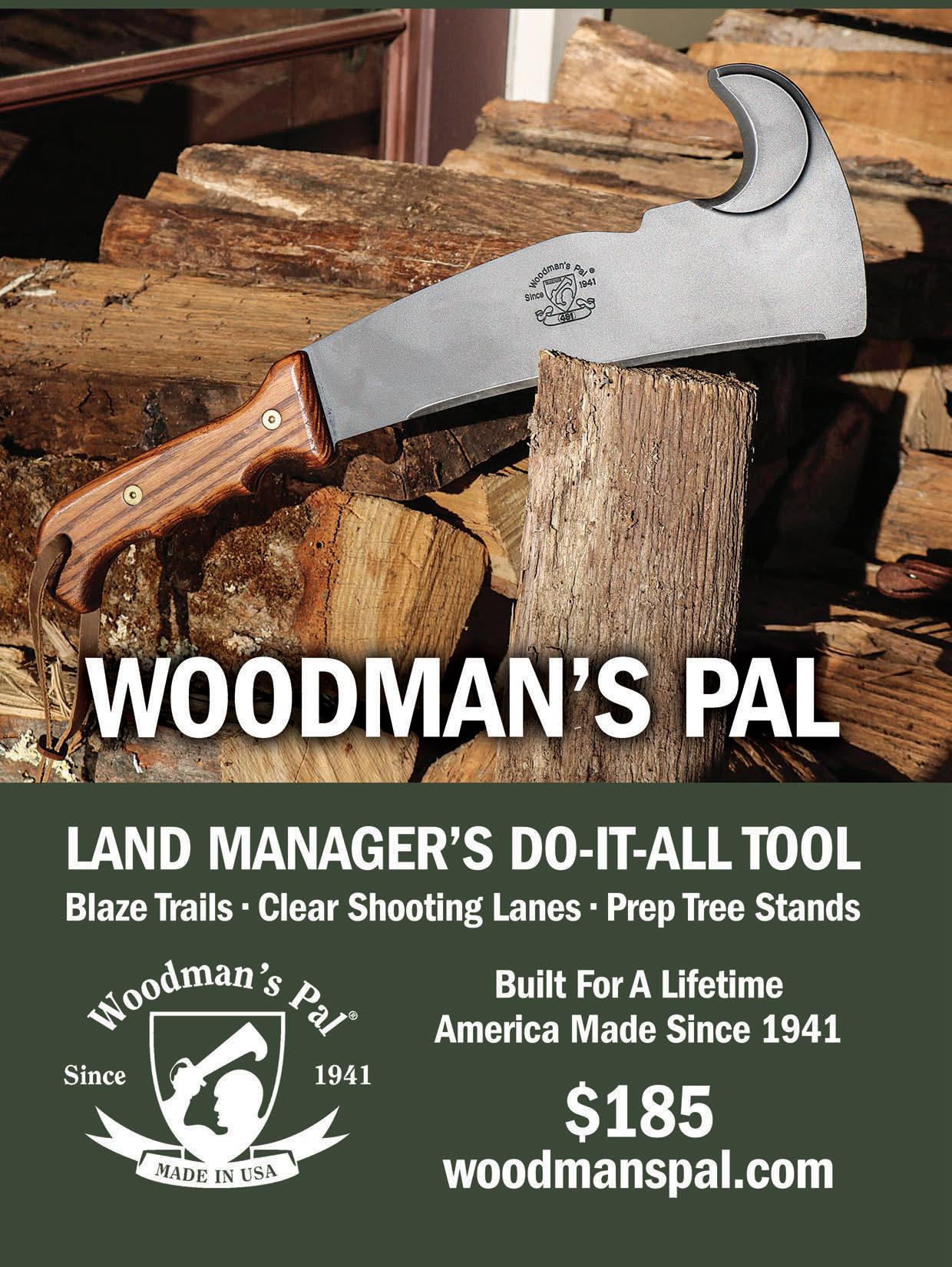
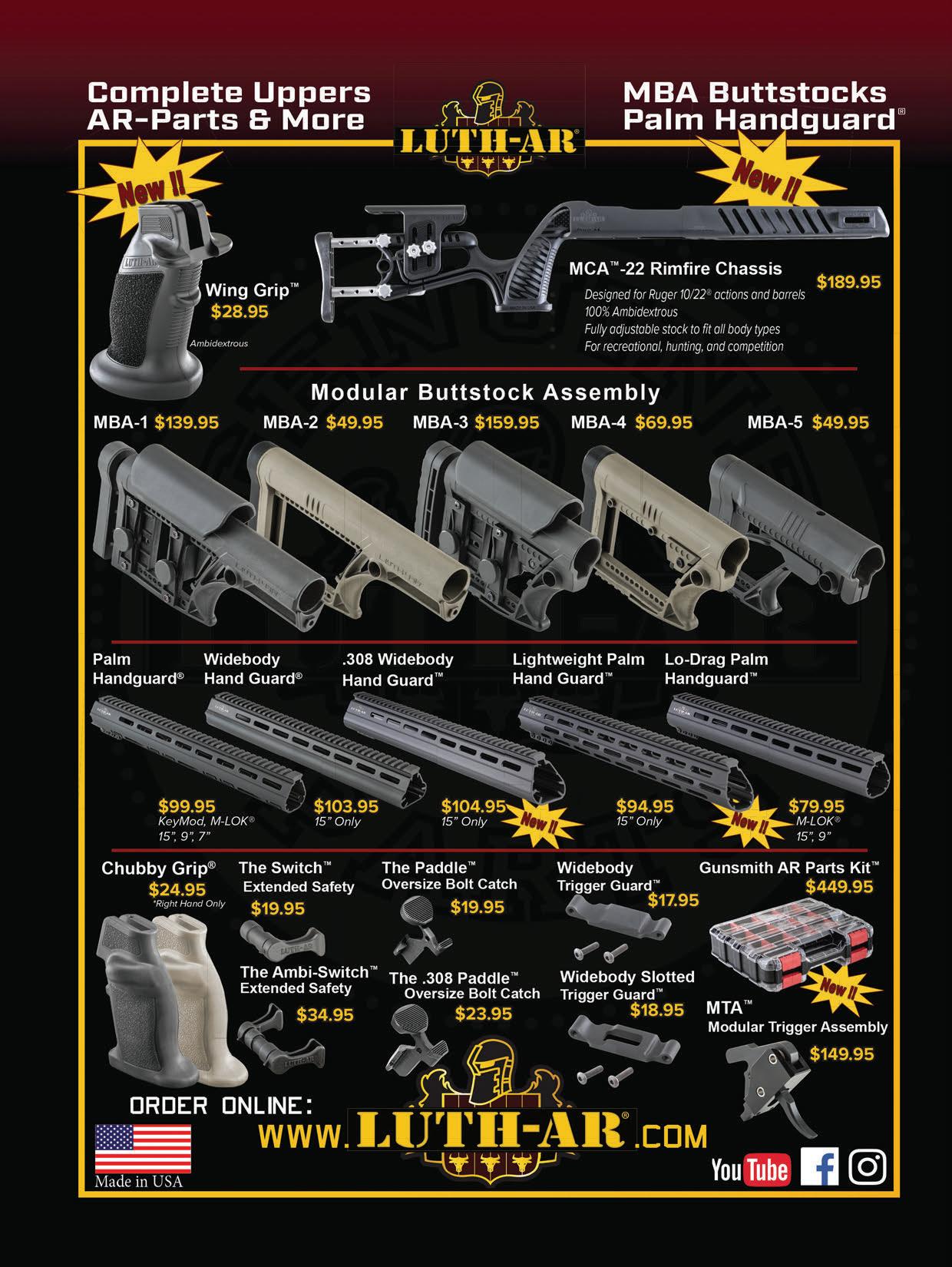
From the Tiny Ten and plains game to big cats and even bigger critters, these bullets will get the job done.
So you’ve booked an African safari, and now you’ve got to outfit yourself for the game animals you intend to hunt. Nowhere on Earth will you find a greater number of huntable species, nor a more diverse selection. While there are a few
cartridges that are accepted as truly universal – think .30-06 Springfield and .300 Winchester Magnum for the lighter stuff, and the .375 Holland & Holland Magnum and .416 Rigby for the heavyweights – bullet choice is absolutely paramount. After all, it is only the bullet that ever touches the game animal.


Let’s take a look at the various situations across the continent, and
which bullets have proved to be Africa-worthy.
A plains game hunt is usually the “gateway drug” that makes addicts of those of us who fall hard for Africa, and this group of animals probably represents the most diverse. You might be stalking a greater kudu –who doesn’t want a kudu? – while

the impala of your lifetime grazes unawares across the vlei. Or while looking at a decent springbok, a massive eland bull might happen by to offer a shot opportunity. From steenbok and duiker up through sable and eland, you’ll be asking a whole bunch from one particular bullet. Many of these species are very similar in size and stature to a whitetail deer, while others are as big as elk and moose, so
For both dangerous game and plains game, a Swift A-Frame of appropriate weight and caliber will get the job done.
my mindset is to carry a cartridge/ bullet combination suitable for the largest species on my checklist, and not worry about the overkill on the smaller species.

I like a premium bullet for plains game, and depending on the area I’m hunting and the correlative shot distances, there are a number of projectiles that have worked very well for me. The Nosler Partition is,
was, and always shall be a great doall choice, as it gives good expansion at the front part of the bullet, and the intact rear core guarantees deep penetration. Though it may not have the best ballistic coefficient on the market, it works very well inside of 250 yards, and that’s where the vast majority of African game is taken. You can say the same for the Swift A-Frame, though I find that bullet to
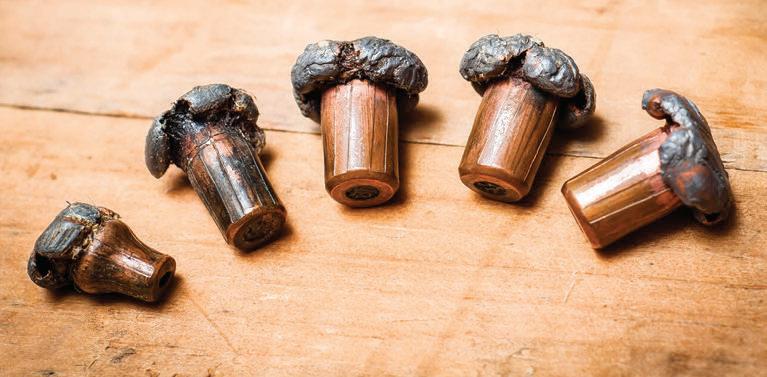
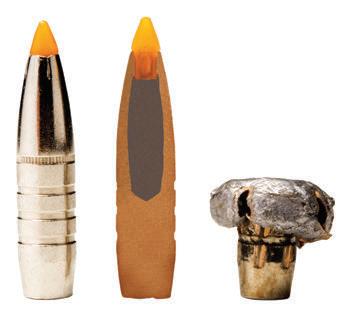

be a bit more “meat-resistant,” in that the bigger the slab of meat you launch it at, the more expansion you get. It’s a tough cookie, for sure.
Monometals also make a good choice, and you might be able to get away with a bit less bullet weight and still get the same terminal performance. Choices like the Barnes TSX, TTSX and LRX, the Hornady CX, and South Africa’s Peregrine PlainsMaster bullet all kill quickly and will penetrate tough shoulder bones. The vital organs of most African species lie more forward than do the vitals of North American species, and broadside shots regularly require shooting on the shoulder joint. Copper monometals are great at holding together when thick hides and tough bones are hit.
There are also the bonded-core choices – usually equipped with a polymer tip – which have the ability to handle long-range shots in windy conditions, will open at lower velocities (longer distances) and yet are tough enough to hold together on close shots at bigger species. Federal’s Trophy Bonded Tip and the newer Terminal Ascent, Nosler’s AccuBond and AccuBond Long Range, Swift’s Scirocco II, and Norma’s Bondstrike all have very respectable BC values and are wonderfully tough. I’ve used the Trophy Bonded Tip to great effect on
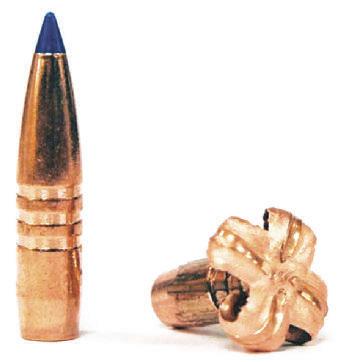
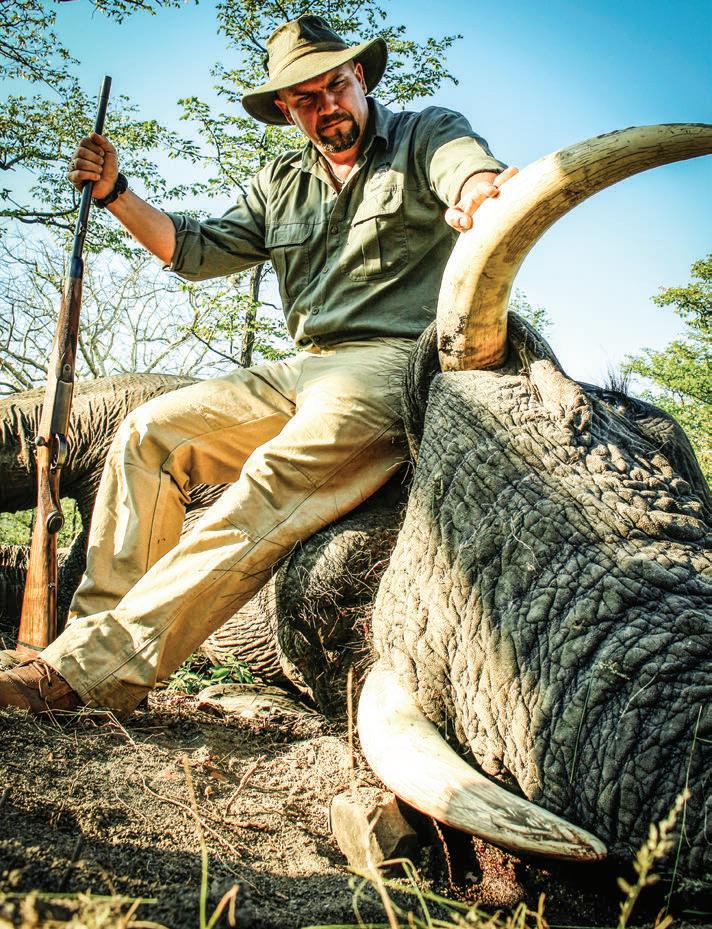

When the Bog DeathGrip was first released, we were excited because it was a “made for purpose” piece of equipment for stabilizing a rifle in the field. We have used other Bog products with satisfaction, so why should the DeathGrip be any different? We were immediately impressed with the rigidity of the DeathGrip tripod and the design of the DeathGrip clamp itself.

But we quickly discovered that the rifle mount would only pan and tilt, which is a problem in the field because when you pan the rifle, your crosshairs don’t stay level. We used the tripod off and on for a year, hunting prairie dogs, deer and coyotes with much frustration. Well-made product that just fell short on the execution.
What the DeathGrip needed was a ball mount adapter. A couple years ago, we bought a ball mount and made a prototype adapter to convert the tripod. Complete game-changer! We field-tested the heck out of this thing ever since and can honestly report that we are 100-percent satisfied with the end result. Our DeathGrip Adapter pans and tilts much smoother than the OEM parts and it’s a simple matter to level the reticle once you’re on target.
Another plus of our DGA kit is that the DeathGrip clamp unit can be quickly removed from the ball mount Arca slot, allowing you to use the included Arca plate to mount additional field items like a spotting scope, rangefinder, chronograph or digital camera. Or if your rifle is equipped with an Arca rail, you can slide the rifle directly into the Arca slot on the ball mount, which is our preferred mounting method.
Pick one up today at littlecrowgunworks.com and make that tripod your new favorite way to shoot in the field.
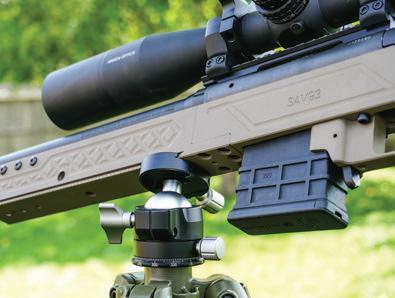
Use code SHIPDGA for free shipping!

species as small as springbok and as large as eland, and that bullet just might be my favorite of this last group. It will offer all the penetration you could ask for, even on tough animals like zebra, wildebeest and eland. If you can still find it, Woodleigh’s Weldcore bondedcore softpoint is an excellent option for medium-range plains game hunting.
If you are a fan of traditional cupand-core bullet designs, they can be used on African game, but I’d recommend you stay on the heavy side of the bullet weight spectrum, and that you choose a projectile with a thick jacket. I like the Sierra GameKing and ProHunter, Hornady InterLock, and Speer Grand Slam in calibers from 6.5mm up through the .30s; you just want to avoid the frangible designs.
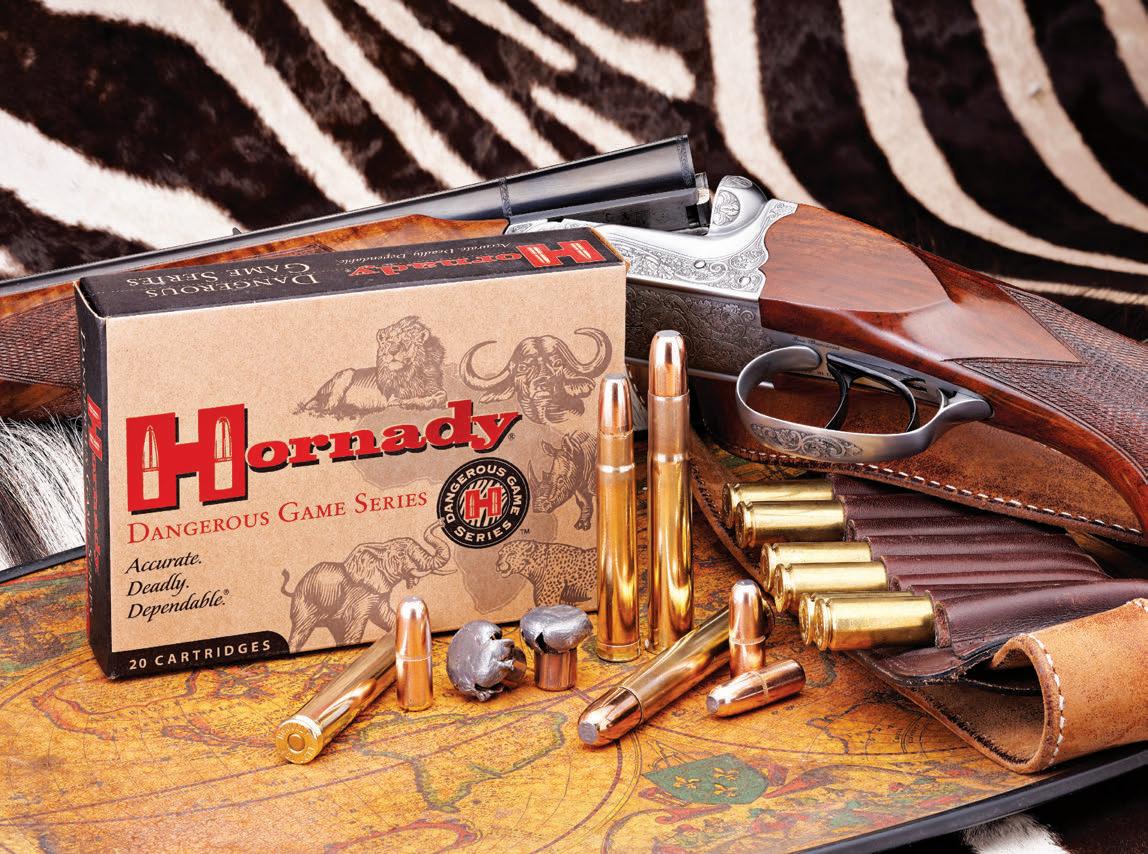
For the tiniest antelope species – commonly referred to as the Tiny Ten – including the steenbok, duiker, grysbok, oribi and klipspringer, many hunters will use a nonexpanding “solid” bullet to do the least amount of damage to the pelt. Even premium softpoints can make a considerable mess, and a solid will whistle through cleanly, especially when carrying a big bore rifle hunting plains game in a dangerous game block.
Lion and leopard may not be bigger than the plains game species, but might require a bit more thought. A male lion can approach the 500-pound mark, and makes a formidable foe. Yet most professional hunters, or PHs,
will recommend a traditional softpoint bullet – though of suitable caliber and sectional density. The Nosler Partition, Woodleigh Weldcore and Hornady InterLock are all fine choices; just keep the sectional density value as close to .300 as possible. Lions are strong and can be awe-inspiring, but they aren’t actually very tough. Most PHs will smile when they see a bullet of 250 grains or more, and they’ll smile even more when you put that bullet where it belongs.
A leopard over bait might be the easiest shot in Africa, as you’ll be on a rest, (hopefully) it’ll be at considerably less than 100 yards, and your chui will pose for you. A big tom leopard will tip the scales at 150 pounds, and a bullet suitable for a big whitetail buck will also be a good choice for Mr. Spots.

I tend to prefer a heavy-for-caliber choice, to keep the pelt as presentable as possible, but I have no problem with the common deer bullets, from the Winchester Ballistic SilverTip to the Hornady ELD-X, Nosler AccuBond and even the Remington Core-Lokt. If you’re a handloader, the Sierra Tipped GameKing, Speer Grand Slam or any of the excellent boutique bullets – like
the Badlands Precision Super Bulldozer or the Hawk Bullets softpoint – will certainly suffice. On either cat, shot placement is paramount.

AFRICAN HEAVYWEIGHTS
This is the category where bullet choice has changed the most, and if you compare literature regarding hunting the Cape buffalo,
The Woodleigh Hydrostatically Stabilized Solid, loaded in Federal Premium Safari ammo. Note the blue plastic cap to facilitate ease of feeding; it breaks off upon impact with the animal.

North Fork’s cup point solid is perfect for thick-skinned game; the small cup at the nose offers just a bit of expansion, but the bullet is designed for thorough penetration.
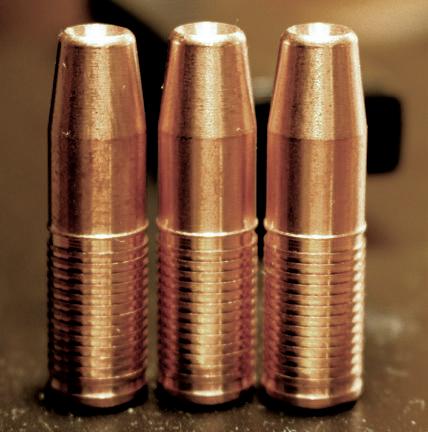

hippopotamus, rhinoceros and elephant from the 1980s to modern stuff, you’ll see why. Back in the day, the .375 Holland & Holland Magnum and the .458 Winchester Magnum were about all that was available; the former might be called a bit light, and
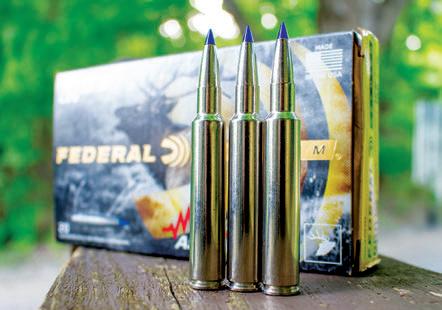

the latter had its own issues since conception. So the general consensus was “solids on buffalo,” but that has changed. Modern premium softpoints are the recommended first shot on Cape buffalo, with older PHs still liking solids for backup. I’ve shot a few
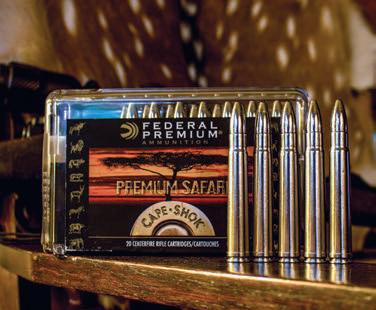
buffalo, and PHs aged 50 and under pretty much concur that premium softpoints are the way to go to avoid overpenetration, especially when taking a bull from a herd.
Among my favorite buffalo softpoints are the Swift A-Frame
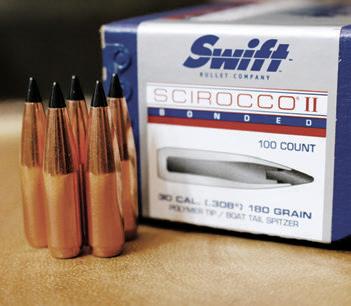

(possibly the best choice), the Barnes TSX, the Woodleigh Weldcore, the Peregrine BushMaster and the Federal Trophy Bonded Bear Claw. If you appreciate the penetration of the solids but want a bit of expansion, there are the Woodleigh Hydrostatically Stabilized Solid (an unprecedented design) and the North Fork Cup Point Solid. In a conventional solid, the Barnes Banded Solid, the Federal Trophy Bonded Sledgehammer and the Cutting Edge Bullets Safari Solid all get the job done perfectly.

Moving to the pachyderms, a solid, nonexpanding bullet is assuredly the way to go. An elephant has 2 feet of honeycombed cranium in front of its brain, and a hide measuring over 1½ inches thick. Both rhino and hippo also have very thick hides, along with incredibly strong bones and a constitution to match, so all of them warrant a big cartridge and a stout bullet. Were you to ask me what my


favorite bullet for these species is, I would readily offer the Woodleigh Hydro Solid, as it has served me very well. I’ve taken big-bodied elephant in Zimbabwe, near the Botswana border, and used this bullet to physically knock a buffalo bull off its feet in Mozambique. The Barnes Banded Solid has a rounded nose profile, which will feed (generally
speaking) in any rifle, and has the structural integrity to sort out any animal that walks on Earth. I can say the same for Federal’s Trophy Bonded Sledgehammer, despite a flatter meplat. In a double rifle, Hornady’s DGS is a great choice for double rifles that have been regulated with the old Kynoch ammunition, and it performs rather well in bolt guns, to boot.


No matter the type of safari you book, a bit of homework and experimentation before the hunt will most definitely enhance your experience and have you returning home with photos full of smiles, rather than sad tales. Cartridge choice is not as difficult, but when a bullet performs perfectly, it will engender all sorts of confidence.
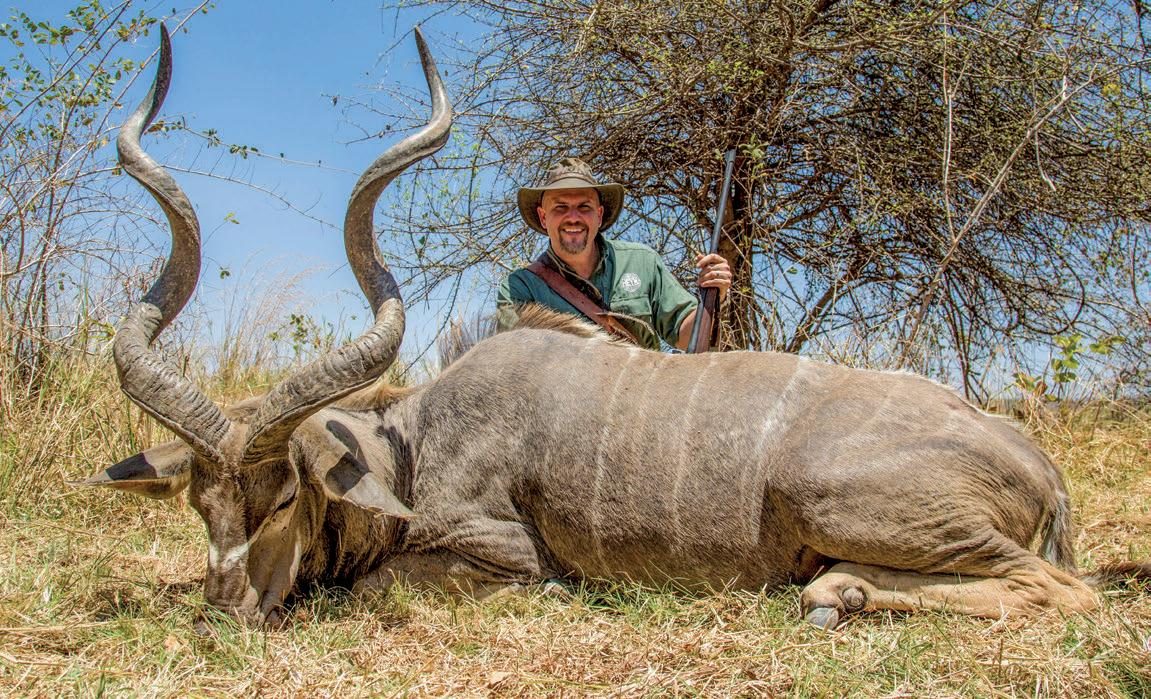

Nestled in the foothills of the Ozark Mountains in Missouri, High Adventure Ranch offers all of the excitement of western big game hunting without the costs and hassles.

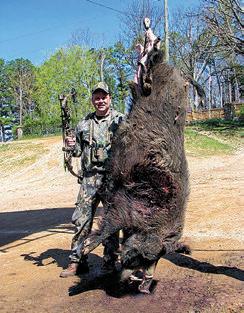
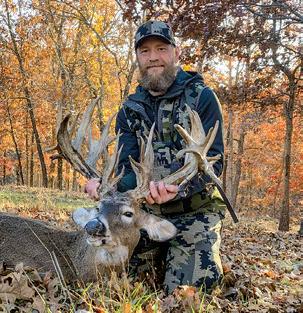
Be prepared for a fair chase hunt! With over 3 square miles of prime natural habitat, our ranch provides challenges to even the most seasoned hunter, but our experienced guides and “No Game, No Pay” policy practically ensure that you won’t go home empty handed. In addition, High Adventure’s hunting season is year-round, allowing ample time to fit the most demanding schedule.
While our whitetail, elk, wild boar and red stag hunts top our hunter’s most popular lists, hunters from around the world have visited our ranch, hunting everything from American bison, black buck, fallow deer to Spanish goats and African game.
So, whether you desire a 10-point whitetail mount for your trophy room or simply the thrill and challenge of taking down one of our many elusive big game animals, High Adventure Ranch guarantees memories of an unparalleled hunting experience that will bring you back again and again.
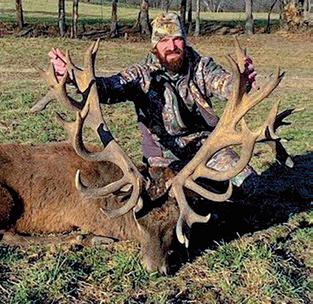
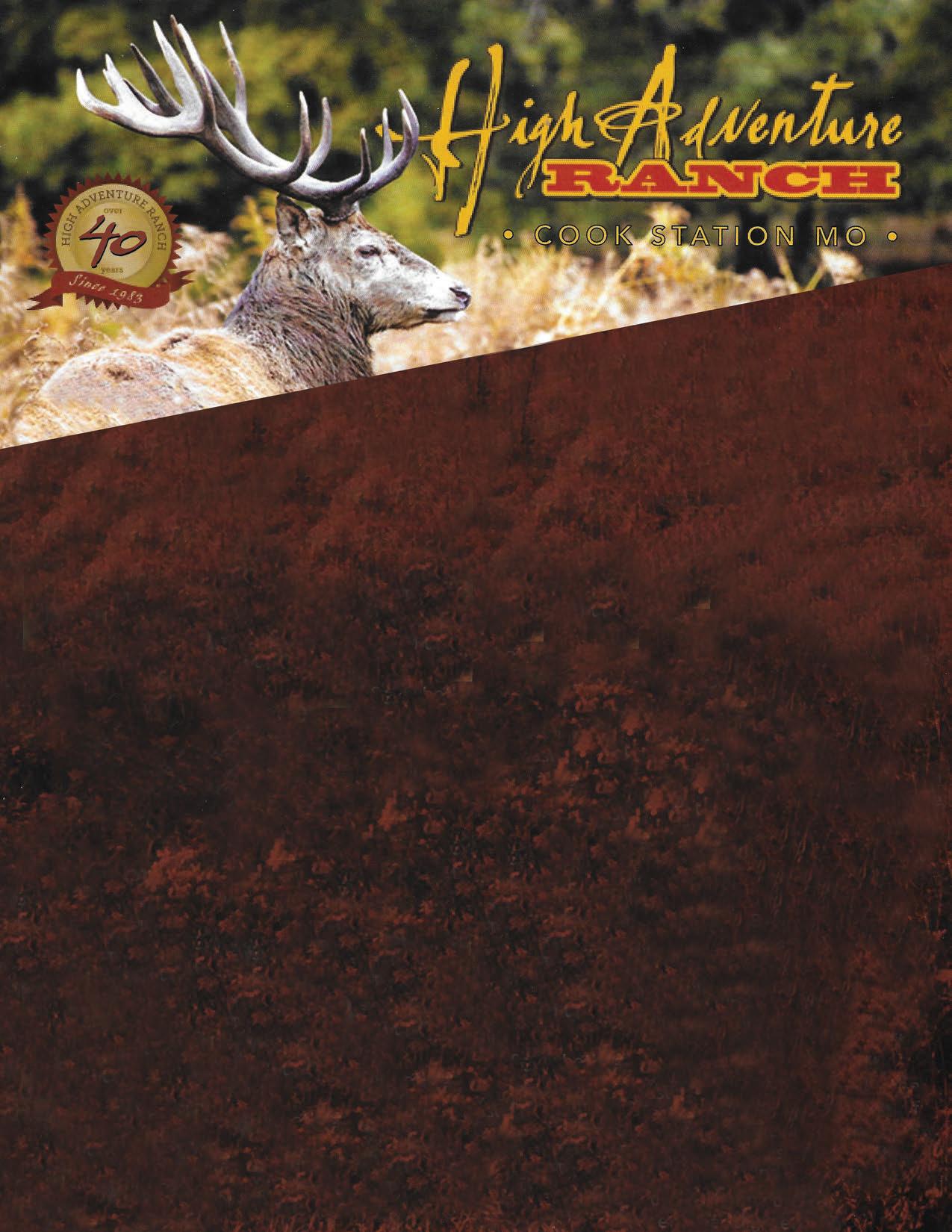
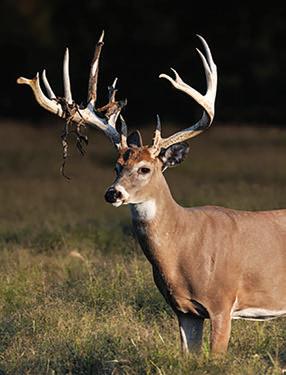
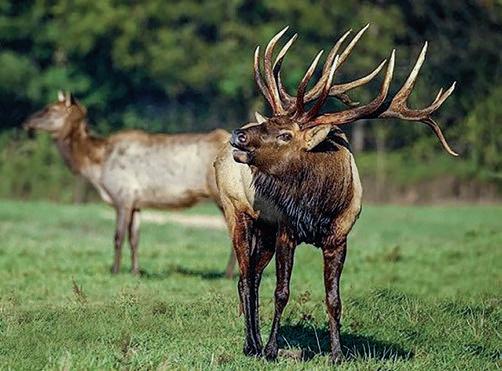
 STORY BY JASON BROOKS
PHOTOS BY HIGH ADVENTURE RANCH
STORY BY JASON BROOKS
PHOTOS BY HIGH ADVENTURE RANCH
When planning a hunt with an outfitter or a ranch-style hunt, some hunters use a booking service or just do an internet search hoping to find the right hunt for themselves. This can lead the hunter to a good experience, but it can just as easily lead to a bad one if you don’t find the right hunting outfit or the booking service doesn’t understand exactly what you are looking for.
This is why calling High Adventure Ranch is a good starting point for planning that hunting vacation. When you call, you will likely talk with Brad Puff, a third-generation High Adventure Ranch outfitter who has spent his entire life being involved in the business of providing hunters and their families with the vacation of a lifetime, or even an annual one.

High Adventure Ranch started with Brad’s grandfather Charles Puff, whom I had the pleasure to talk with last year (American Shooting Journal,
March 2022). Charles opened the ranch because he loved to hunt and had a life goal of taking a 100-pound elephant, which he accomplished. A 100-pound elephant refers to the weight of the tusk, marking a mature
bull. There are no elephants in the Ozarks, where High Adventure Ranch is located, but the property does offer other exotic and highly sought-after trophy animals.
THIS TIME WHEN I called the ranch, Brad answered and explained that Charles had passed away last January. Though I was sad, Brad reassured me that his grandfather had lived a great life, one full of high adventures and family. We soon began chatting about hunting and all that High Adventure Ranch offers. There are whitetails, elk and bison for those seeking North American species, and then there are the various sheep and African game animals. But if you ask Brad what the highlight of the ranch is, he would say the red stag.
Brad states that hunters wanting to hunt red stag need to head to far-off lands – or they can head to the Ozarks. If you want to hunt red stag in New Zealand, plan on flying up to 20-plus hours – each way. Meanwhile, High Adventure Ranch in Cook Station, Missouri, is centrally located in the United States. Most hunters can drive to the ranch, or rent a car from the St. Louis airport, which is only two hours away.
Also, if you hunt red stag in New Zealand, travel insurance is recommended, and it runs $300-plus per person. There is no need for this if you hunt at High Adventure Ranch. If a hunt needs to be rescheduled, High Adventure Ranch will work with you to schedule new dates, whether it be the same season or anytime in the future. Hunting red stag in New Zealand also means you’re going to have to take the time and money to purchase a passport. You don’t need a passport to hunt at High Adventure Ranch if you live in the United States.
At High Adventure Ranch, most stags score from the upper-200-inch range to over 400 inches, and last year a 540-inch stag was taken on the ranch.
“Our genetics are pretty terrific and it is a challenging hunt,” Brad says.
The ranch’s red stags typically score from the upper-200inch range to 400 inches, but last year saw a monster 540-incher taken. “Our genetics are pretty terrific and it is a challenging hunt,” states Brad Puff, whose grandfather Charles Puff founded the hunting preserve in 1983.

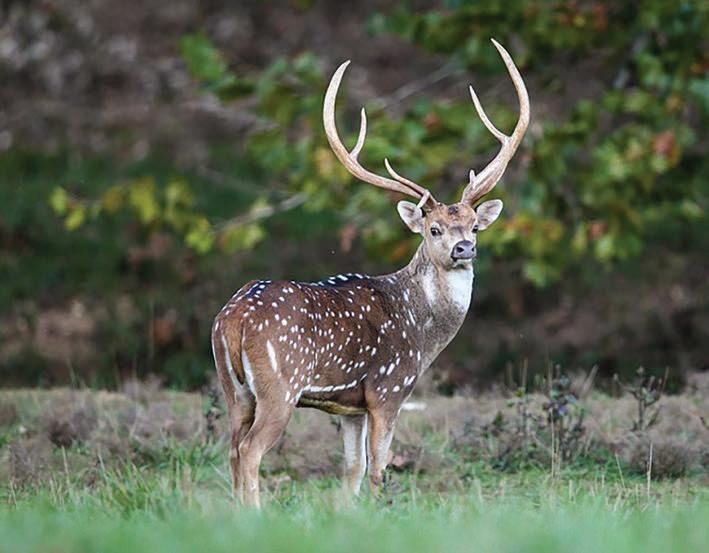
“Most of the hunting is done ‘safaristyle,’ where you cover the nearly 5 miles of ranch with a four-by-four truck and look for game. From there, it is a thick forest where you will play
‘hide and seek’ until you can get close enough for the shot.”
Brad says that the stags are a herd animal and it takes some good stalking skills to get in position for the shot. If you blow the chase, the herd will run off and you will spend hours trying to find them again, but this is a ranch hunt and he guarantees the hunt. If you don’t get your stag – or the animal that you are there to hunt – then you don’t pay for the hunt, just the accommodations and food, which is hearty and served family-style.
One of the best things about red stag is the meat. If you hunt red stag in New Zealand, don’t plan on getting to enjoy the venison because it cannot be brought back. Red deer, or stag, venison is typically what they serve in America’s finest restaurants and historically has been a delicacy for the nobles of Europe. This tender meat is rich in taste, high in protein, and low in fat. If you hunt at High Adventure Ranch, full meat processing is available; they will handcut your meat, vacuum-seal, label and

put it in their walk-in cooler until you depart. This is all done on-site and part of the hunting package.
THE RED STAG hunt is a highlight because of the meat quality and because the hunt is exciting and not an easy one to do. But Brad states that High Adventure Ranch can tailor the hunt to any hunter, as well as offer other game animals for those who want a trophy whitetail or to chase elk east of the Rocky Mountains. All of their tags are guaranteed and since they have permits allowing them to hunt out of trucks, the hunts can be custommade to fit any hunter’s needs, even those in a wheelchair.
“From the first-time hunter to the 92-year-old who just wants to keep
hunting but might not be able to hike the hills, High Adventure Ranch can provide that hunt,” says Brad.
Some families return each year for an annual bison hunt, and that means a lot of meat to care for. The same guides who will dress a red stag also do this for all of the hunts, including bison. Brad explains that not only do families return each year as an annual vacation, where nonhunting spouses can just relax in the ranch’s cabins or cast a line in its lakes, but some opt to take a camera along and photograph all of the different animals they will see.
“Some people prefer to shoot animals with a rifle, and some with a camera, and here at the ranch they can do both,” says Brad.
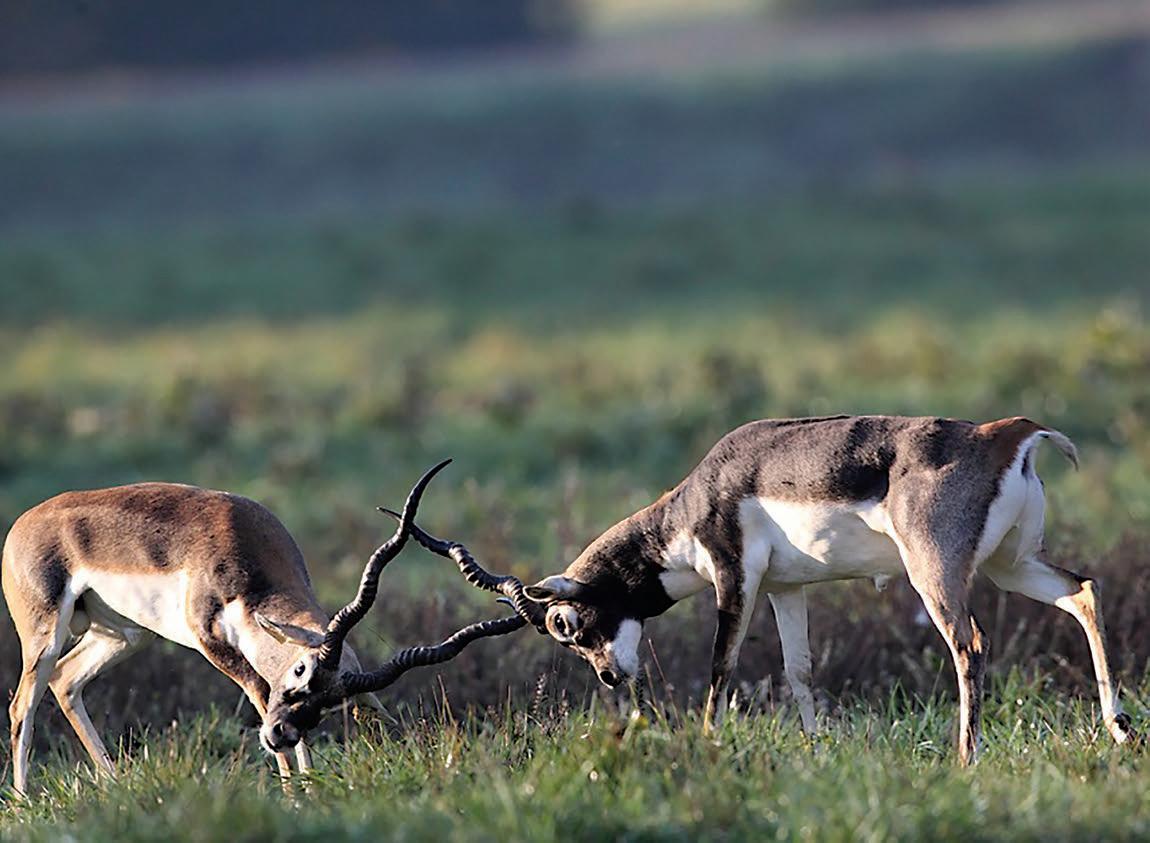
The bison hunts will fill your
freezer with high-protein and lean red meat, and it is more cost-effective than buying it at the grocery store. Just as with the other hunts, the meat is professionally cut and vacuum-sealed right at the ranch.
HIGH ADVENTURE RANCH in the Ozark Mountains of Missouri is where a hunter can chase the red stag of their dreams or just plan a family vacation and relax, taking in the rolling hills and all of the different animals on the ranch. It is a great place for first-time hunters or seasoned vets who want to continue their days afield. Give Brad a call and start your High Adventure hunt.
Editor’s note: For more information, visit highadventureranch.com.
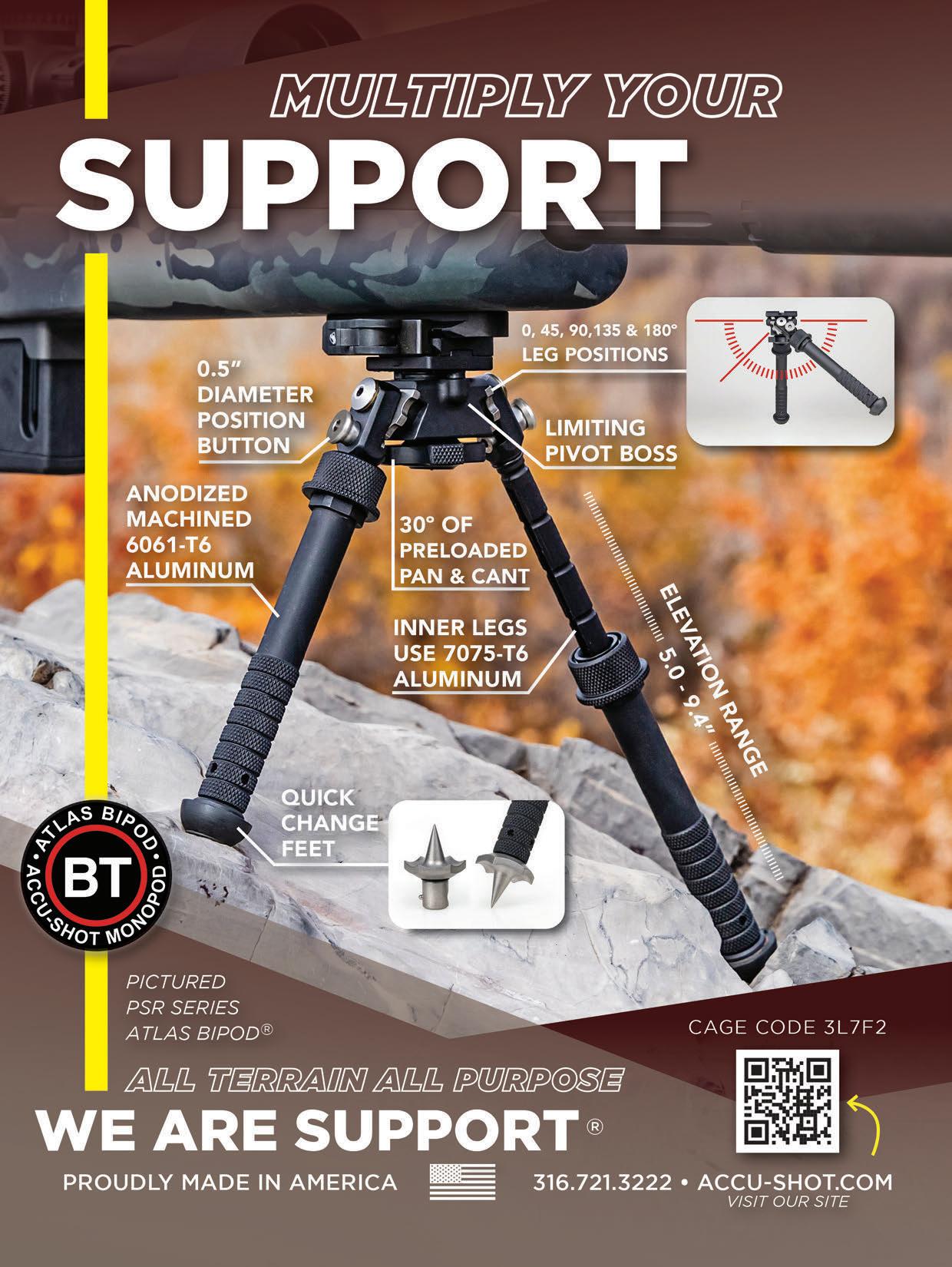
 Author Scott Haugen has taken many elk throughout the West and will be the first to tell you that big bulls don’t come easy, but they can be had if you follow his game plan.
Author Scott Haugen has taken many elk throughout the West and will be the first to tell you that big bulls don’t come easy, but they can be had if you follow his game plan.
Finding a place to hunt elk is easy. Finding a place to consistently kill elk is a different story.
This isn’t another one of those articles you’ll find in every magazine this time of year, on the best states and the top game management units to hunt elk. The starting point of this story begins once you’ve drawn a tag. This is how to locate elk.

Once I draw an elk tag, the scouting takes on three forms. I already know elk should be in the area I’ll be hunting, because otherwise I wouldn’t have applied for the tag. But going to where elk should be, and finding where the elk are, can be two different things.
Start by making calls to regional wildlife biologists in your hunting area. If the area you’ll be hunting is big, there may be more than one office to contact. Ask about current elk herd trends, recent population counts and where the elk are thought to be during your hunt, be it bow, muzzleloader or rifle season. Inquire as to whether wolves, disease or wildfires have impacted the herd.
Next, get on the computer and track wildfires. There are several programs at national, regional and state levels that contain valuable information on wildfires, both past and present. Research the recent history of wildfires in the area you’ll be hunting and track
the progression of current burns. Many archers throughout the West have had seasons canceled in recent years due to fires. Even rifle hunters have experienced closures, so be prepared and have a backup plan, if applicable.
Third, physically scout. This takes time and money, but think of it as an investment for years to come. If it took you 20 points to draw a tag, it’s likely a once-in-a-lifetime hunt, which is even more reason to physically see what you’ll be facing. But if you and your buddies might draw the tag every couple of years, learning all you can from the outset will also pay off.
The number and severity of wildfires raging throughout western elk country has been atrocious in recent years. Some fires have killed a number of elk when the animals sought safety in wooded draws, only to be consumed by flames engulfing the hills and canyons on either side.
Fires have also forced elk to move from their high-country habitats. In many cases, herds have traveled miles, dropping into river valleys, even private farmlands. As a result, many elk have taken up residence at lower elevations.
If a burned area receives fall and spring rains, it can provide consistent food for elk. Late in the summer, if a fire is put out in time or the edges don’t burn too hot, that land can generate grass for elk to graze on that fall if rains hit in late September or early October.
Avoid scouting and hunting where

fires burned hot. If the soil is scorched, it may take decades for the land to recover and provide adequate food for elk. Searching for elk a mile or two from a burn, where food and cover are prime, can also pay off.

THE PREDATOR FACTOR
When talking with biologists about wildfires, also ask about the impact predators may have in the area you’re looking to hunt. I’ve found coyotes, even cougars, have minimal impact on forcing elk herds to move from an area. But wolves and bears are a different story. Bear predation largely takes place during the elk calving period in late spring. I’ve killed a number of elk
in areas thick with black bears and grizzlies, meaning that by hunting season, the elk calves are big enough to avoid bears.
The biggest mover of elk is wolves. When scouting and hunting an area, look for wolf tracks and scat and listen for them howling at night. I’ve seen wolves run entire elk herds from a drainage in one night, ruining a hunt. Wolves like traveling roads and game trails. Setting up trail cameras will help reveal what predators are on the move, along with what elk are in the area.
THE HUNT
When on the hunt, if elk aren’t where you expected to find them, keep moving.
This is where summer scouting is most valuable because come hunting season, you don’t want to be wasting time finding a place to hunt. Then again, sometimes elk move and you have to find them. If you saw elk or promising elk sign when scouting, you know the animals will be in the area; you’ll just have to work hard to find them. Hunt early and late in the day, and spend midday hours looking for tracks, fresh rubs and droppings.
In many places where I’ve rifle hunted for elk, hikers, archery elk hunters, archery deer hunters, upland bird hunters and rifle deer hunters have been educating elk up to three months before the season even begins. Such pressure
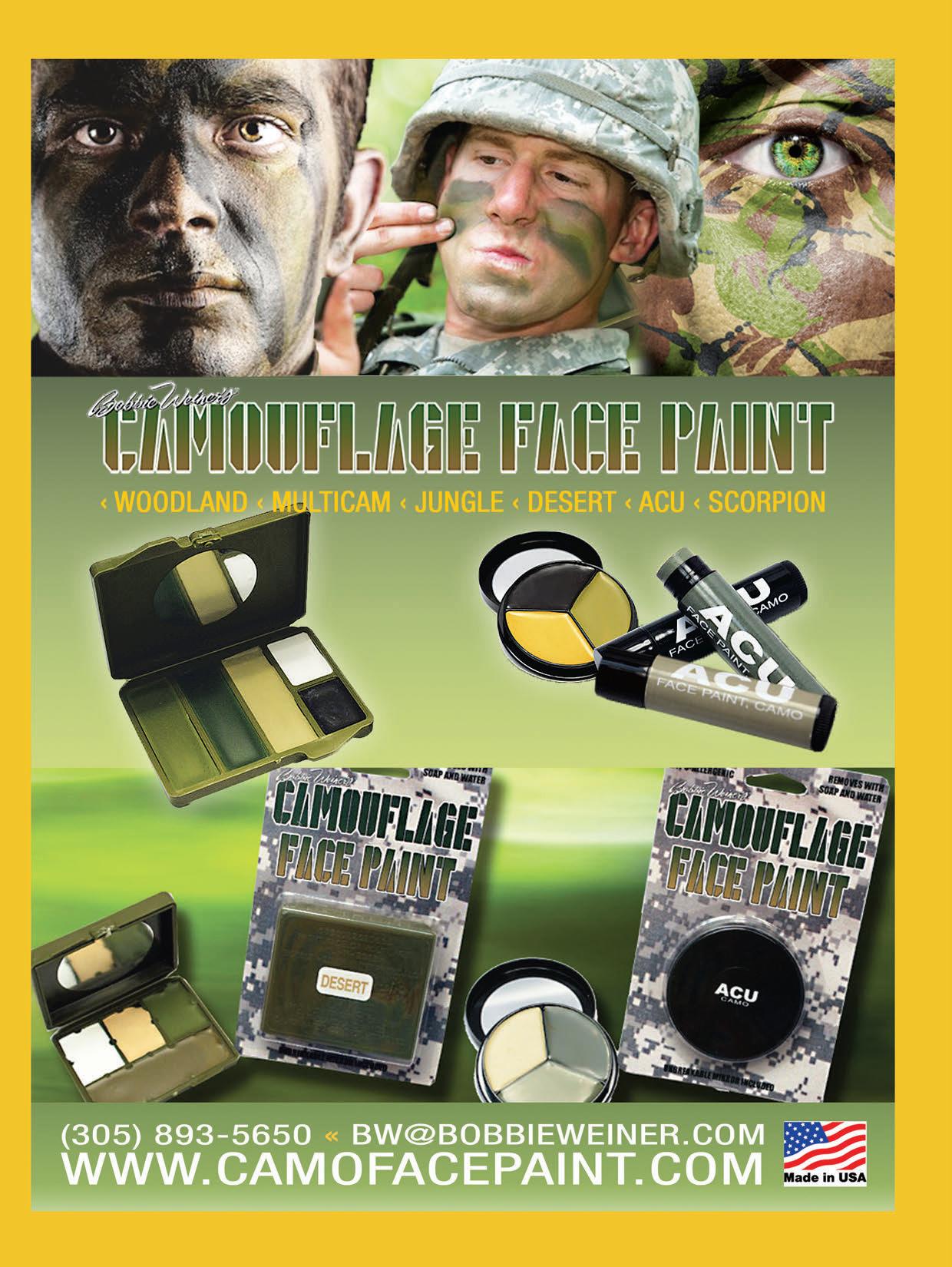
If you’re not seeing
study sign closely.
often forces elk into the deepest, most dense habitat. If you’re not willing to head into the bottom of the canyons and root them out, you may not see an elk.
The number one reason elk tags go unfilled is because hunters are not in good physical condition. Elk country is big and rugged, and if you can’t get to where the elk are, you can’t kill one.
You don’t have to be a marathon runner and bench-press 400 pounds to kill elk. But you do need to be in good shape. Being in top cardio shape is more important than squatting a rack full of plates. Stamina and flexibility will take you into elk habitat that 80 percent of our fellow hunters can’t reach.
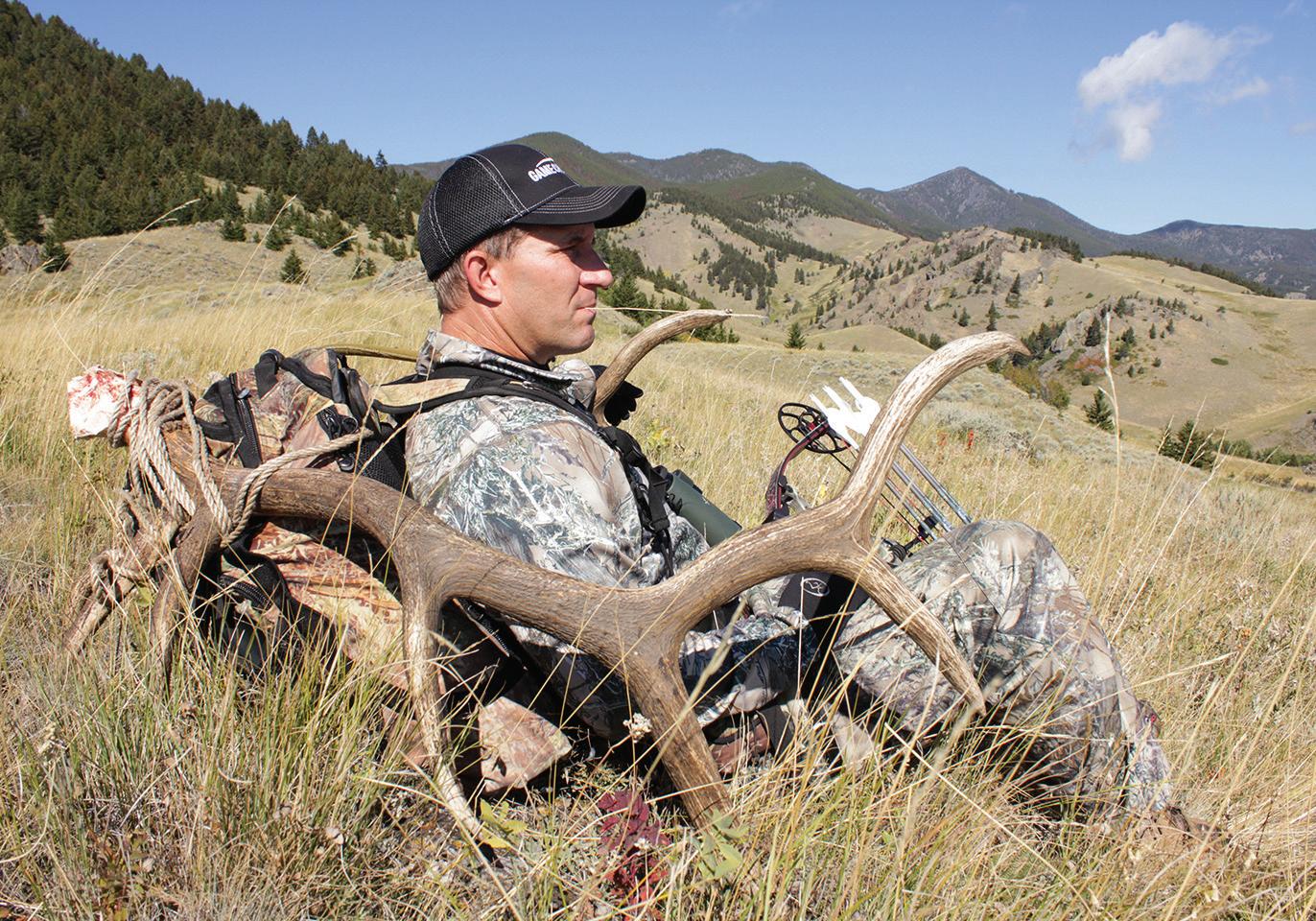
Even if in top shape you may still need help reaching the elk. This is where scouting pays off. Looking at a drainage on a map or Google Earth
is different than seeing it in person. Study it with your own eyes and you’ll know if you need horses or mules, if you need to be dropped by a packer, if you can handle it with a backpack, or if an ATV will be needed. You’ll learn whether or not a base camp can be set up, or if you need to keep moving deeper into the mountains, meaning a spike camp will be essential.
Elk hunts can be mentally and physically demanding. Go into a hunt expecting to lose weight due to intense physical exertion. If you’re bowhunting when it’s hot and dry and you’re seeing lots of fresh sign every day but no elk, try scouting at night. Move quietly and listen closely for bugling bulls in the distance and cows and calves communicating; they’re often very vocal at night. It’s nothing for elk to move 5 miles every night to feeding
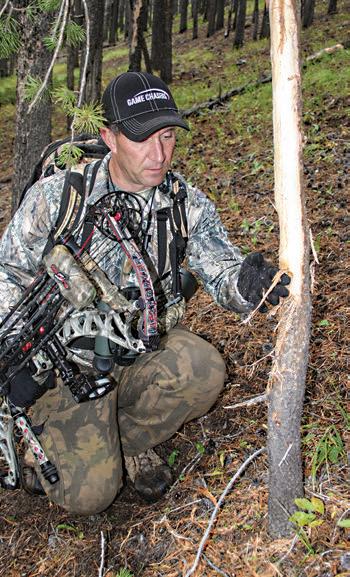
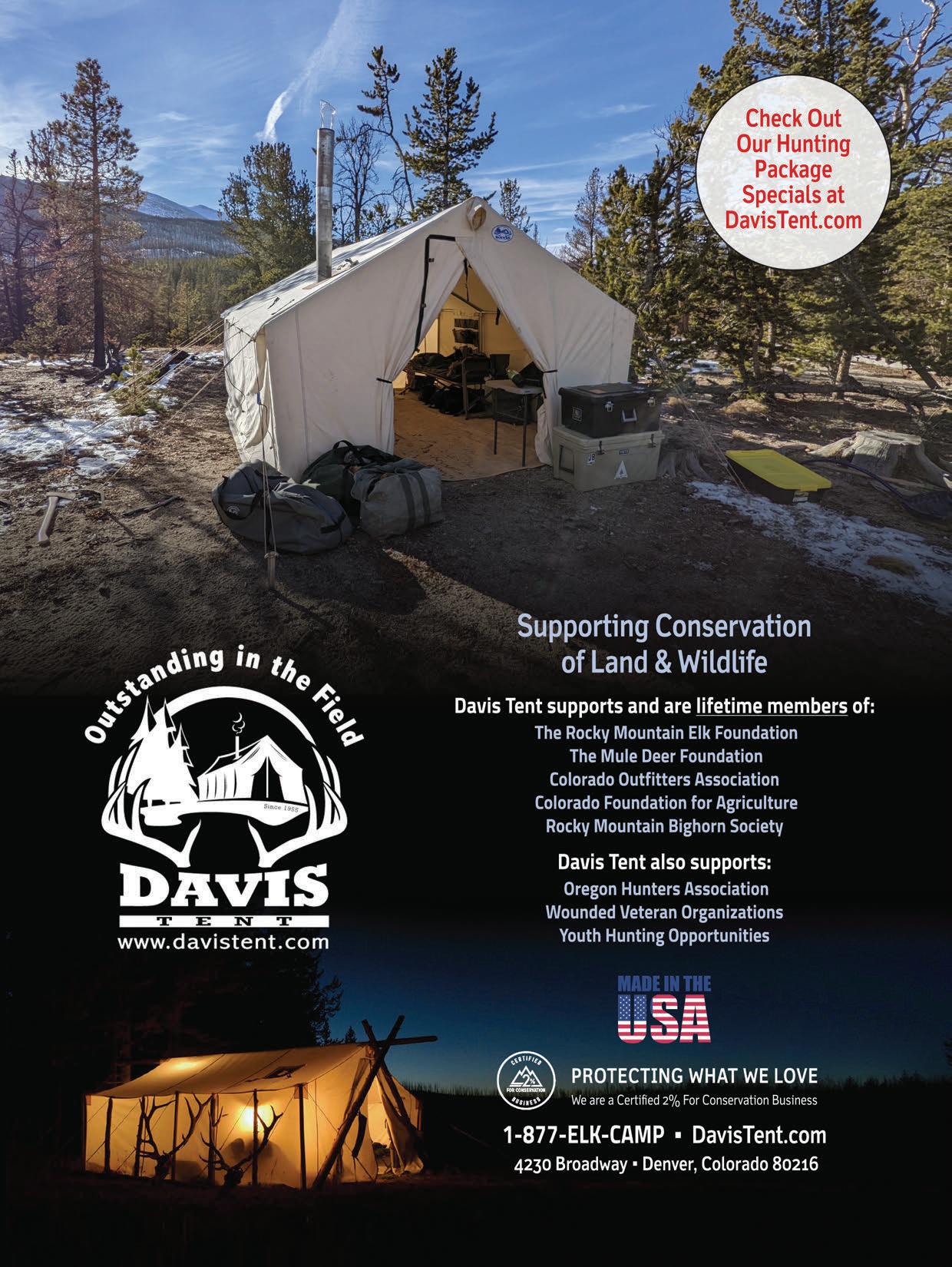
If you want to experience in-your-face elk action this season, the search for big bulls starts now! areas, retreating to bedding grounds high in the drainages well before daylight. I’ve arrowed a number of bulls after learning their nighttime movements, which allowed me to move up into ravines and wooded hillsides and intercept them when heading to bed.
The fun of elk hunting stops the minute you kill a bull. One time two buddies and I each arrowed big bulls on opening morning. Despite the high elevation in the Rocky Mountains, daytime temperatures were hot and grizzly bears were thick. We quartered and boned out one bull, which we loaded into saddle panniers. One buddy took that load 21 miles to the trailhead, then drove 35 miles to the
nearest town, where we had already arranged for cold locker storage.
My other buddy and I stayed back to take care of the other two bulls. We hung one in game bags in shaded, cool pine trees so grizzlies couldn’t reach it. The other bull we loaded onto our horses and headed down the trail. We met our friend well after dark. He took that bull to the cooler, along with written permission from me to transport the meat, then stayed in town that night and got some needed rest.
The next morning my other buddy and I broke down camp, got the meat we’d hung in the trees, and were off the mountain by late morning. We didn’t lose an ounce of meat, just some sleep. Before the hunt, prepare to handle the meat because it can be a lot of work.
There are many successful elk hunts that take place from the comfort of a big camp, a cozy trailer, even a nice hotel. I’ve not experienced many of those, however, likely because tags are limited in those areas and my luck with winning any lottery is very poor.
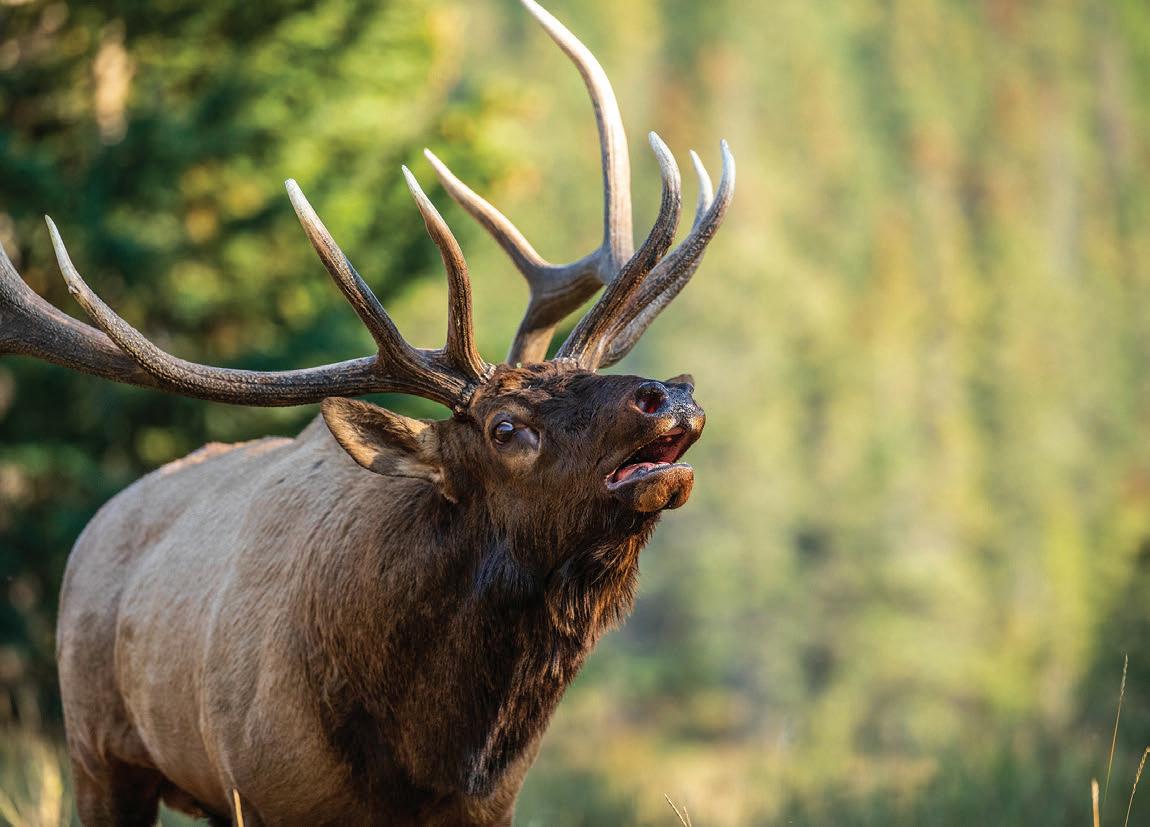
Most elk hunters I know – myself included – love the captivating places elk take us. Escaping people, cell phones and city lights is what elk hunting is all about. The harder you’re willing to work to find elk, the more rewarding the experience will be when you punch that tag.
Editor’s note: To order Scott Haugen’s bestselling instructional DVD, Field Dressing, Skinning & Caping Big Game, including elk, visit scotthaugen.com. Follow Scott on Instagram and Facebook.
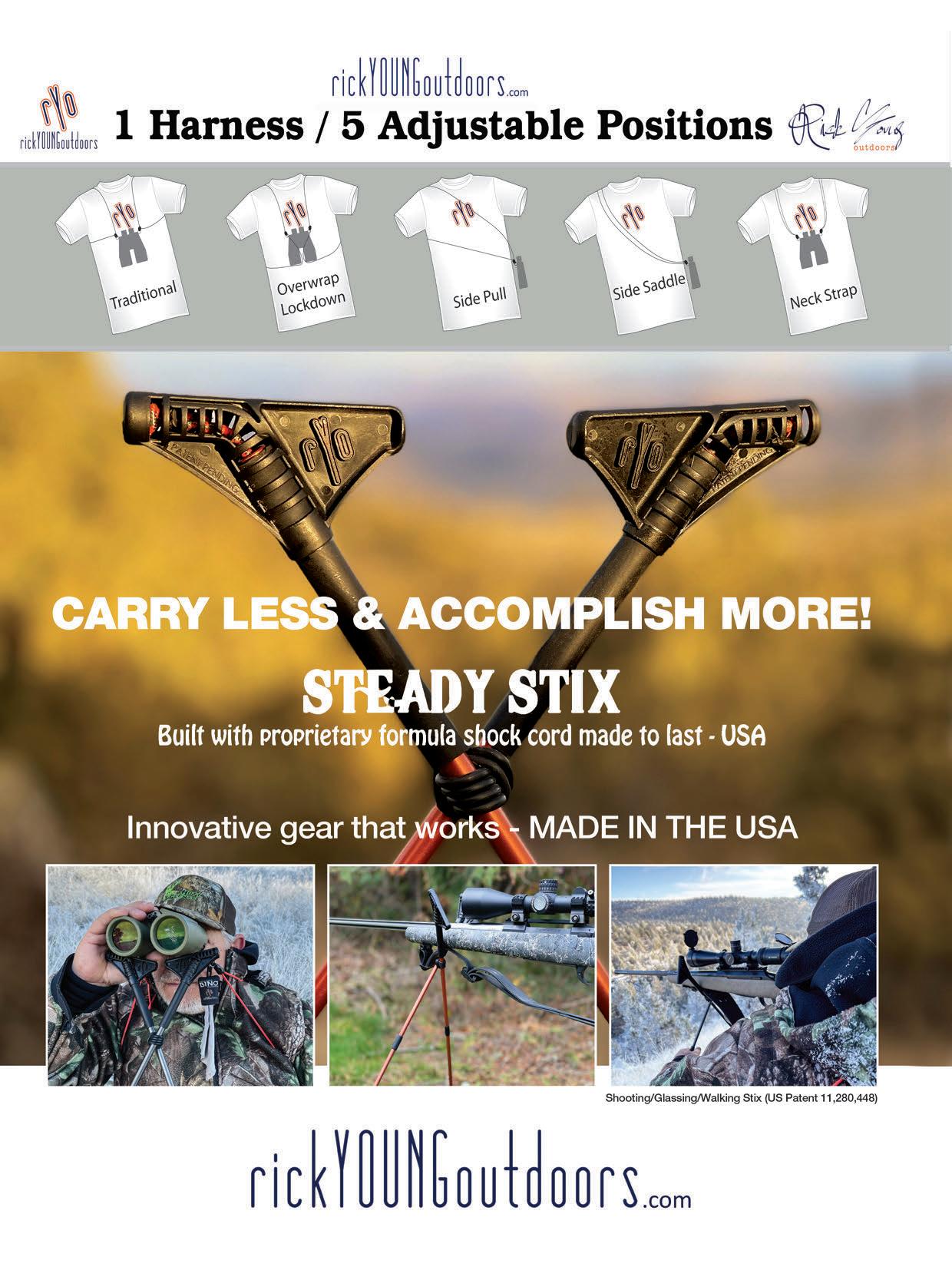
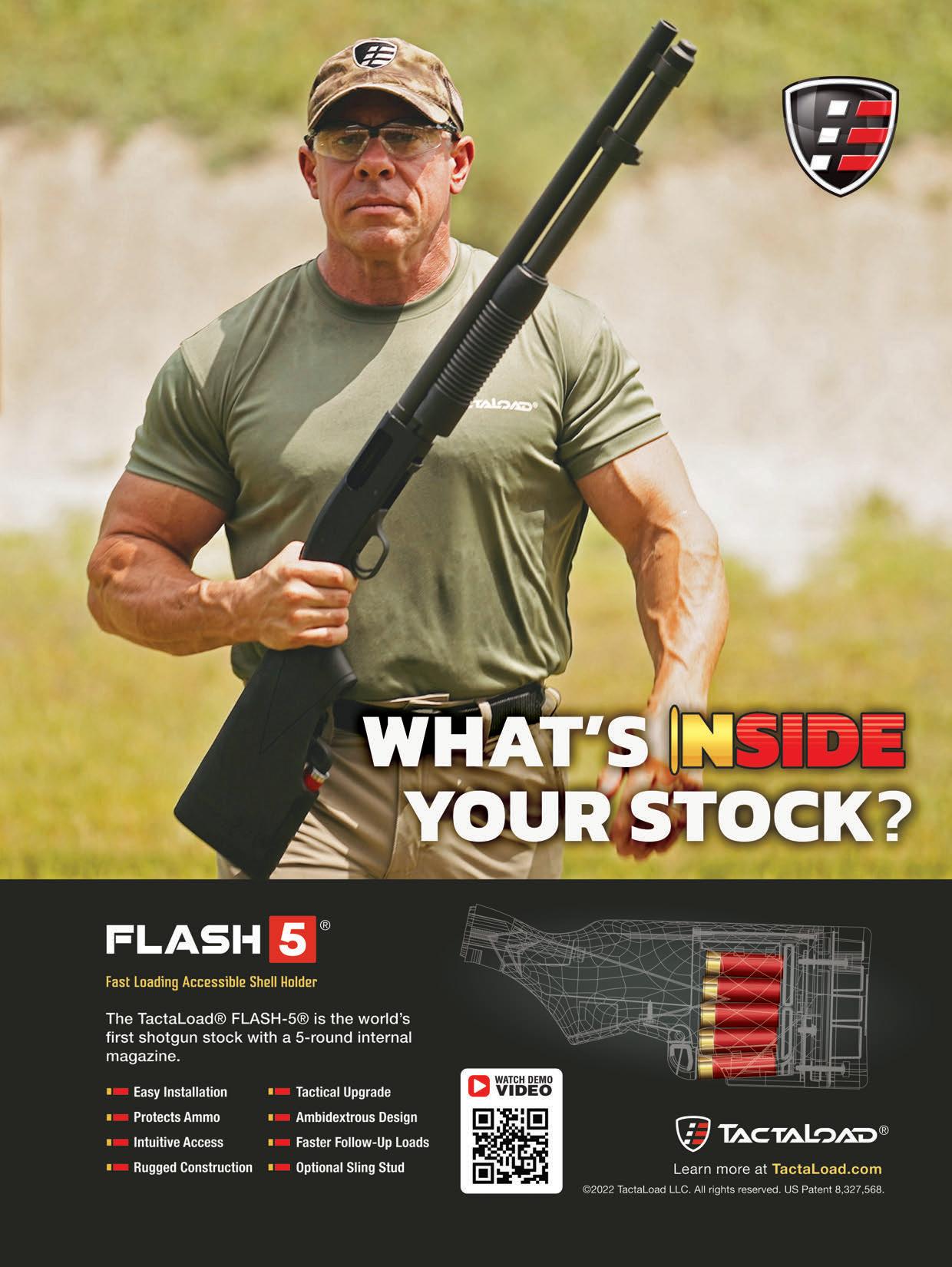
Summer is on the downhill slide and according to my famously poor math skills, as I write this we have about 42 days until the opening of dove season (usually September 1). Yes, you read that right, 42 days and you could be standing on the edge of a field sweating in the heat, yet you haven’t

hit a bird after a box of shells. The shotgun games we will talk about here will help greatly with bagging more doves, pheasants and ducks. It occurred to me that I have not talked to you enough about shotgun shooting and

the shotgun sports lately. There is a wide variety of shotgun-related sports and if you like to shoot, they are great fun. (There is that “fun” thing again; we are supposed to be having fun out there, right?)
Nonshooters will not understand this, which is a pity, but if they go just one time to a trap or skeet range and
try it, they will be changed forever. That first time – that first magical time when they mount the gun and bring it to bear on a flying clay target and pull the trigger to see the clay evaporate into a fine mist – is a wonderful experience.
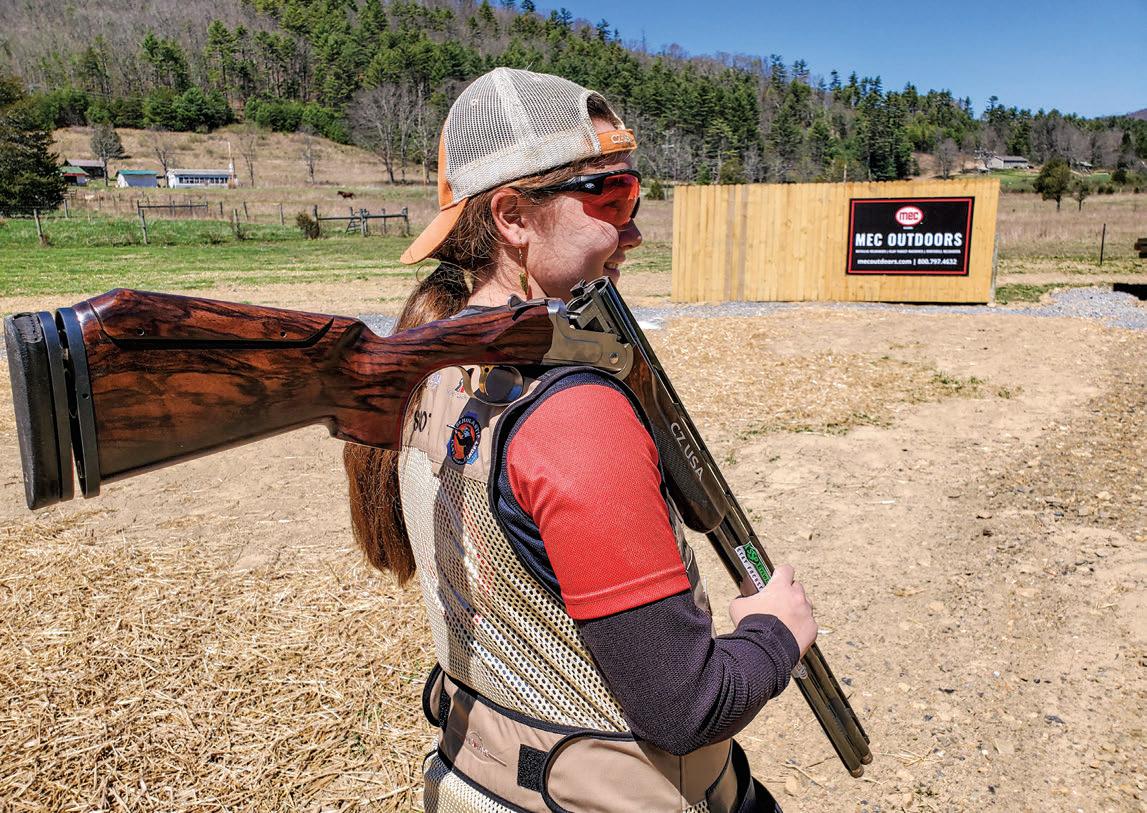
So here, my brothers and sisters in camo and shooting vests, is a downand-dirty intro to some of the basic shotgun games for you to try. You old and experienced shotgunners out there will no doubt think it rather simplified and trite, but we need to give the new shooters some information on getting started.
I have no problem telling you that trap is my favorite shotgun game and the reason is simple: I think it is the easiest. Now, there are shotgunners out there who would leave me in the dust on any
range and will disagree with this. They don’t think trap is the easiest game. Why they think this is an absolute mystery to me, but we must forge on.
American trap that we shoot here in the US is different from European or bunker trap that has an English or European origin. Our game of trap evolved when the sport of live pigeon shooting started to fall into disfavor in the late 1800s. In the live bird game, the shooter calls to the person operating a cage to release a bird. Because this person, called a “trapper,” pulls a string to release the bird, the shooter calls, “Pull!” This is still how you call for a target on the trap (or skeet) range. Trap is generally shot with a five-person squad standing on fixed positions lined up on a curved row. The shooters are 16 yards from the trap house, which contains an
oscillating target thrower. The targets can be thrown 27 degrees right or left of center and are more or less going away from the shooter.
A squad of five experienced shooters is a thing of beauty to watch and reminds one of a well-oiled machine. As one shooter pulls the trigger, the next in line closes his gun (if it is a break-action) and raises it to a shooting position. He calls for the target (“Pull!”) and makes the shot. The next in line continues all this. The shooters rotate positions after every five shots and when they have expended 25 rounds of ammo, the game is over. A round of trap will only take about 15 or 20 minutes and I believe it is the best game for the beginner to start on.
On a side note, the older, very experienced trap shooters (you can
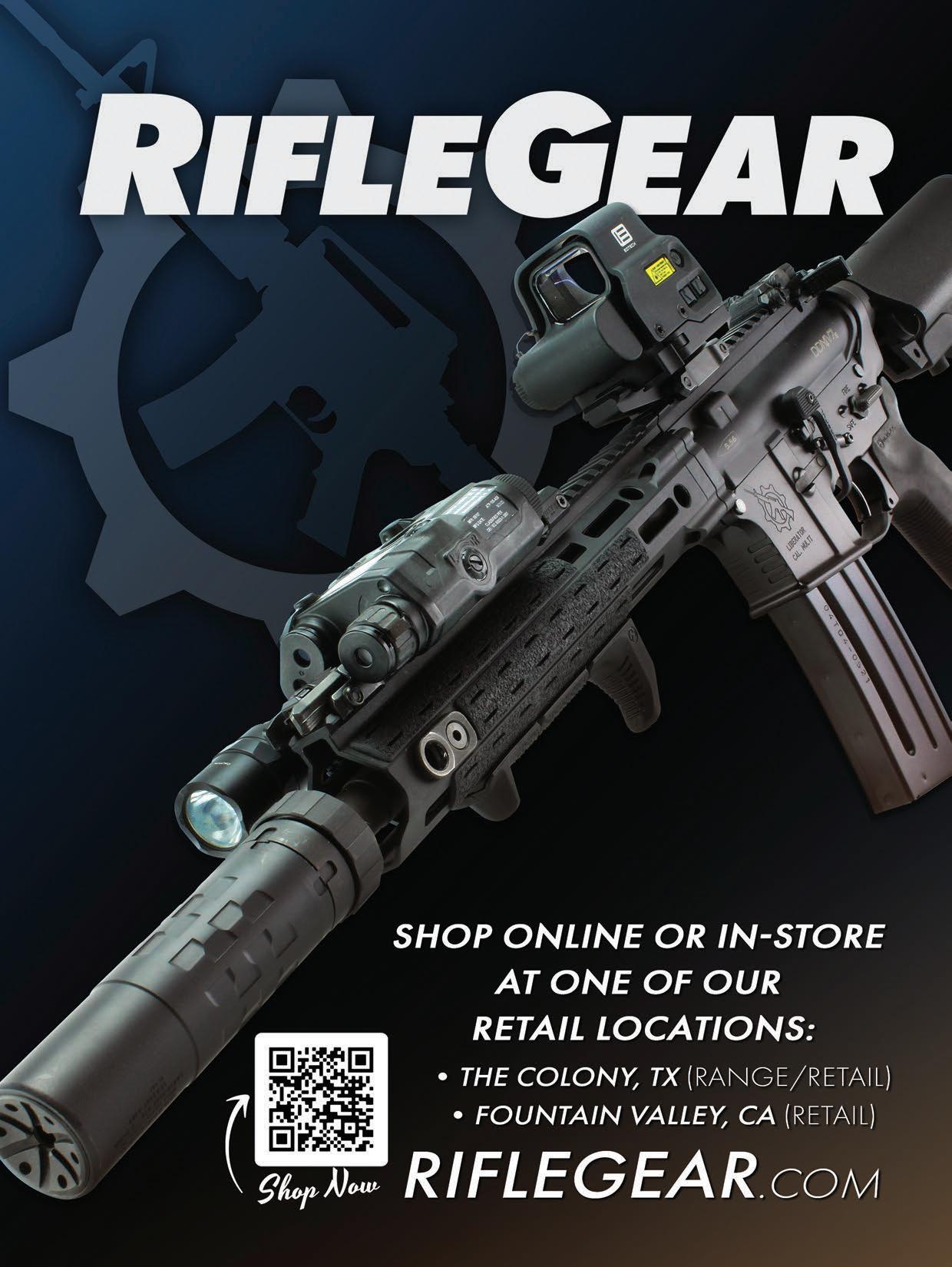
recognize them with the baggy pants) can be notoriously grouchy around new shooters. Don’t let this faze you one bit. Go to the range; watch and listen awhile and learn. When it is your time to shoot, it would be good to start on a squad of other inexperienced shooters and one old hand who is willing to help and teach. Any gun club will have such shooters around, and most older shooters (even the grouchy ones) will welcome the chance to share all of their wisdom once they get to know you. Go and learn and have fun. Don’t worry about your scores when you first start down the shotgun trail.
We are told that in the 1920s a couple grouse hunters in New England invented the game of skeet (I’m not sure if they were drunk or just meanspirited) to make shooters more proficient at hitting ruffed grouse. Many shooters (including me) think the targets in skeet may be more related to dove and duck hunting scenarios in the field than to upland hunting (like grouse or pheasants), where the birds are generally flying away from you. The targets in skeet offer a lot of crossing shots and some coming toward you.
The skeet field consists of two target houses on either side of the field. On the left is the “high” house, which is

taller than the one on the right, or the “low” house. There are seven shooting stations in a half-circle connecting the two houses, with the last, station 8, being in the very middle between the two houses. (I believe that station 8 was invented by the devil himself.) A squad of shooters makes their way around the positions and shoots singles at all the stations and then doubles at stations 1, 2, 6 and 7. On your first miss you get one redo, called an “option” or
a mulligan, and if you have no misses –lucky you – you get to shoot the station 8 low house bird twice.

Just to get this out of the way, I detest skeet, mostly because I really stink at this game. I know it is probably some kind of mental block I developed long ago, but I just can’t seem to climb out of that hole. More than a few times I have had good shooters tell me that skeet is not that hard once you figure out the angles of the different stations, and in fact they think the game of trap is more difficult. I usually just thank them and smile, then walk away toward the trap field.
I would suggest going to the skeet field the first time with an experienced shooter who will help you get past the initial bumps in the road. If possible, don’t make your initial foray into the skeet world with a squad of experienced shooters who are dead serious about all this and may fall into a deep depression or a trance if they miss one bird. The ideal here would be to visit the range on an off day with your experienced friend and go through the course in a leisurely manner, learning the ropes as you go. As we talked about in the trap section,

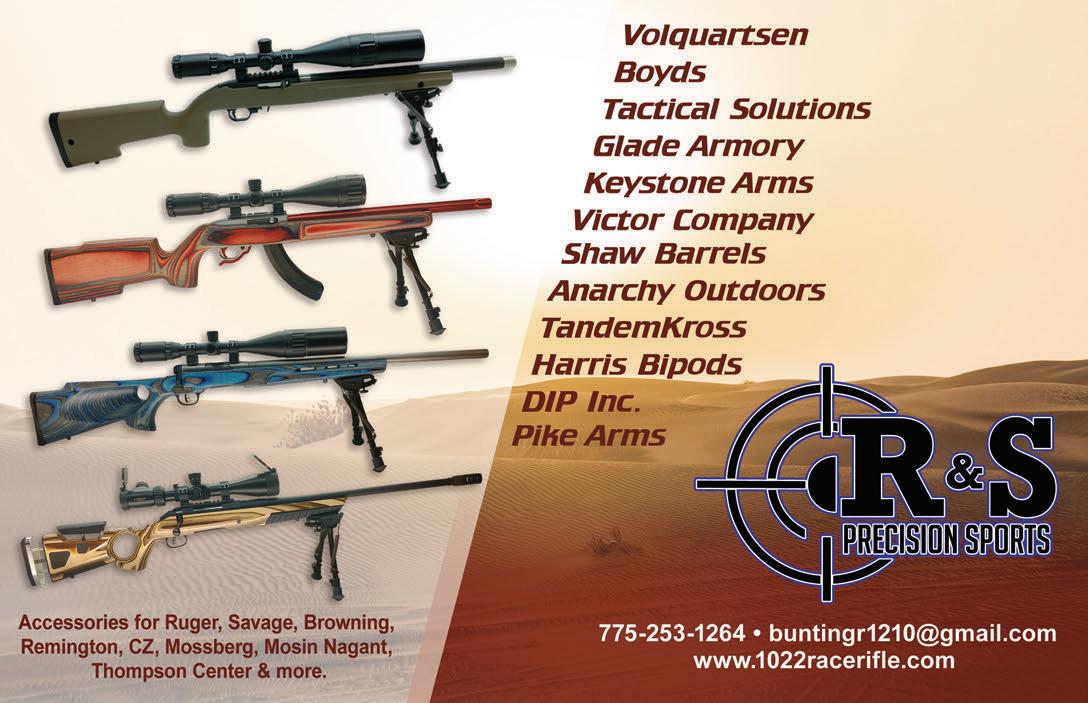
most any gun club will have older, experienced shooters who are usually happy to take new shooters under their wing and teach them.
This is another game that originated in England and was first known as hunter’s clays. The idea was to portray hunting situations more realistically (than trap and skeet) in the field with flying targets. Back then the game was more centered toward the hunter, and in truth, as sporting clays gained in popularity, it attracted more shooters who had little interest in actual hunting. This brought on target scenarios that were more complicated but didn’t really have much to do with hunting. Regardless of all this, shooting sporting clays will sharpen your skills for wing shooting in the field.
The sporting clays course is different from trap and skeet. It is comprised of several different stations (usually 10 to 15) over a large area, so there is walking involved between the stations, or at some clubs shooters ride fancy golf cart buggies between the stations. (I like that part). Typically, and this can vary, you shoot five pairs of doubles at each of the 10 stations,
totaling 100 rounds of ammo. These pairs can come in three ways: a “true” pair, when both are released at the same time; a “report” pair, when the second bird is thrown upon the report of your shotgun in shooting the first bird; and a “following” pair, when one is released right after the other.
Sporting clays courses change all the time, as those running the club usually try to keep it fresh and have something new for returning shooters. This is good in many ways, as even skilled experienced shooters don’t become familiar with the course and will have misses like everyone else. Just like trap and skeet, I would visit a sporting clays course with an experienced teacher and let them guide you through your first few attempts. Again, go and have fun and learn. Sporting clays is more socially oriented than trap or skeet; you can talk and socialize between stations and if you are paired with strangers, you won’t be at the end of the course.
To get started, use what you have. If you have a favorite hunting shotgun, by all means use it until you see what you like best for these games. You
may find that you want to take the step to acquire a shotgun dedicated to clay shooting. To start out, most any shotgun that will shoot twice will work for these games. You need low brass target and field load shotgun shells with shot no larger than No. 7½ (serious skeet competitors often use No. 9), and the powder charge should be moderate. Save those magnum loads for hunting; don’t bring them to the trap field.
You will need some form of ear and eye protection and either a shooting vest or a pouch for carrying your shells. If you are shopping around for any of this, here are some ideas.
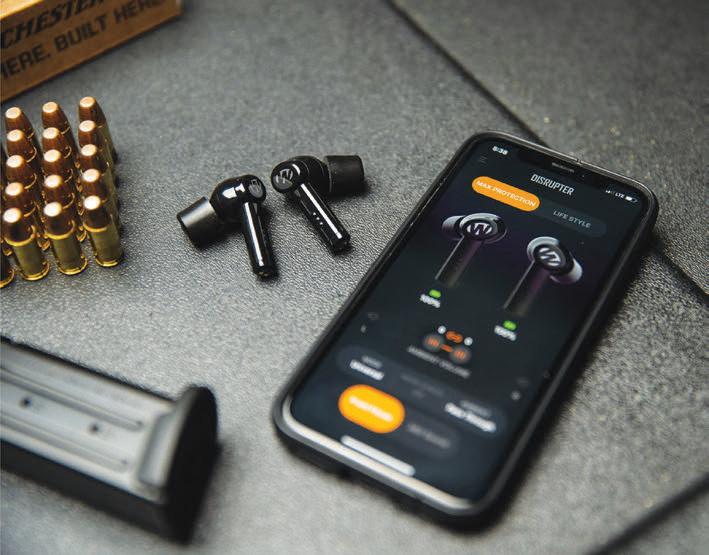
I was waiting on this and Walker’s Game Ear (which, by the way, has a huge selection of hearing protection and hearing enhancement products) came through with the goods. This is an in-your-ear hearing protector that connects to your cell phone via Bluetooth. The Disrupter is designed to protect your hearing by canceling dangerous-level noises, such as shots at the gun range or while target shooting. At the same time, the earbuds can be used to enhance desired environmental sounds or deliver superior audio originating from a smartphone, tablet or other device through Bluetooth connectivity. This makes the Disrupter a completely comprehensive noise protection and a best-in-class sound enhancement solution for anyone with an active lifestyle – on the range, in the gym or deep in the wilderness.
Info: walkersgameear.com
Fiocchi’s Exacta line of target shotgun shells includes the Crusher, Little Rino, Interceptor Spreader and Low Recoil Trainer, just to name a few. The Exacta line provides competitors of all levels the industry standard for reliability, consistency and accuracy. Several competitors say that Fiocchi makes the finest sporting clays ammunition in the world today and the company has

dominated the trap and skeet circuits for decades. Fiocchi is an Italian-based company but, in case you didn’t know, has been making ammunition here in the USA for many years and the number of different shotshells is quite extensive.
Info: fiocchiusa.com
The Federal Top Gun line of target ammo is enormous and you will need to peruse the Federal website to find the particular shotshell you want. (There is also a High Overall line of target ammo you will need to check out.) Some clubs now require steel shot on shotgun ranges and Federal has you covered for that as well. The Top Gun loads’ high-quality lead shot produces even patterns that crush clays with a combination of hard shot, a consistent and reliable Federal primer, an eightsegment crimp, and a unique wad column for consistent patterns.
Info: federalpremium.com
CZ-USA has recently upgraded their 712 line of autoloader shotguns, really from the ground up; it is basically a brand new shotgun. With the added features of an adjustable comb, a stepped rib and 30-inch barrels, this shotgun is designed to meet the
needs of the most demanding target shooters. The adjustable comb allows for a customizable fit to ensure the perfect cheek weld, resulting in greater comfort when shooting. The stepped rib provides a clear and unobstructed sight picture, allowing the shooter to acquire their target quickly and accurately. The combination of these features makes the CZ 712 G3 Target a great choice for both novice and experienced shooters. Built with a gas-operated system, the CZ 712 G3 Target ensures reliable and smooth cycling, shot after shot. The 30-inch barrel is constructed from high-quality steel and is finished with a matte black finish for durability and reduced glare. The shotgun is chambered for 2¾- and 3-inch shells, providing versatility for different shooting situations.
Info: cz-usa.com
First launched in 2022, Franchi’s Instinct Sideplate Over/Under 12- and 20-Gauge models were an instant success with seasoned upland hunters and will serve clay target shooters as well. For 2023, Franchi sweetened the Sideplate lineup by adding a pair of new subgauge models to the family –the Instinct Sideplate 16-Gauge and Instinct Sideplate 28-Gauge. Franchi’s Sideplate-style shotguns take shooters
back to when European gunsmiths designed firearms to capture the eye and imagination, while also providing a second-to-none shooting experience. Showcasing sleek lines, lustrous AAgrade walnut, gold inlaid game scenes and blued barrels, each gun comes with auto ejectors, barrel selectors, auto safety, C, IC, M, IM and F extended chokes, and a custom-fitted hardcase.
Info: franchiusa.com

Stoeger has improved its Model 3000 line and it is a lot of shotgun for the money. For 2023, the M3000 line sports nine new-and-improved semiautomatic 12-gauge shooters. New recoil pads and removable cheek pieces on all models except the satin walnut and satin walnut/burnt bronze models ensure maximum comfort and customization. Stoeger engineers also went to work and the overall ergonomics is brand new – the grip has been thinned, and the look is less boxy and more streamlined. More prominent controls increase functionality, especially when wearing bulky gloves, and a slimmer magazine cap with improved grip makes disassembly a breeze. The bolt handle has been enlarged for increased functionality, and the beveled loading port makes reloading a quick affair

Info: stoegerindustries.com


One of the first things a shooter needs is a way to carry shotgun shells and other items while on the range.
ALPS OutdoorZ offers a classic-style game and shell belt system ideally suited for upland bird hunting or a day of busting clays. The Sportsman’s Belt is constructed of traditional waxed cotton canvas that looks great in the field and rugged enough to survive years of hard use. The system includes two large shell pockets, a generous game pouch, and a water bottle pouch. All compartments are secured to a 2-inch-wide webbed waist belt that cinches with a heavy-duty brass SR buckle. The Sportsman’s Belt system is modular in design, allowing the shooter or hunter to easily remove and position the pockets as needed thanks to integrated snap-button belt loop panels. The two shell pockets feature grab loops and a hold-open closure system to easily open the pockets and remain open, if needed, for quick cartridge access. This pouch will become your favorite for on the skeet range or in the pheasant field.
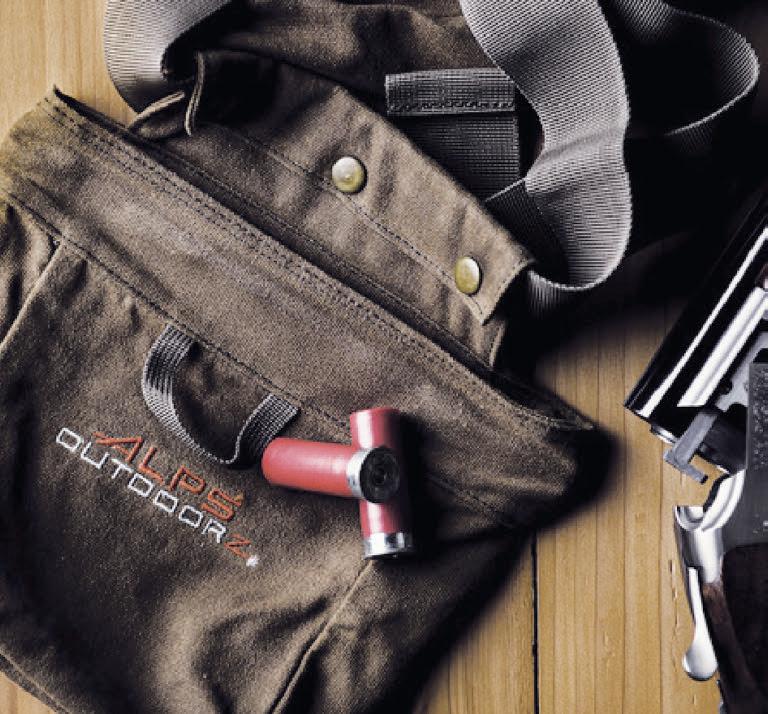
Info: alpsoutdoorz.com

Good safety glasses are essential on
the range for any shotgun shooting, and many of us find we need a little help in the vision department when we reach a certain age. The SSP Eyewear Top Focal Ultra Kit includes everything you need for pistol, rifle,
AR and shotgun to view your sights and the target in every light condition. It comes with a full set of lenses with bifocal magnification at the top of the lens, and a full set of lenses with regular bottom bifocals, so you can use the upper bifocal lens on one eye and a bottom bifocal on the other lens. The list of shooting glasses available from SSP Eyewear is extensive, so spend some time on their website and find the shooting glasses you need.
Info: sspeyewear.com
Editor’s note: Larry Case has been a devoted outdoorsman since he was a child. He will admit to an addiction to turkey hunting (spring and fall), but refuses any treatment. He enjoys the company of gobblers and cur dogs that are loud and people who speak the truth softly. Case served 36 years as a game warden in West Virginia and retired with the rank of district captain. You can check out his podcast and other stories at gunsandcornbred.com.



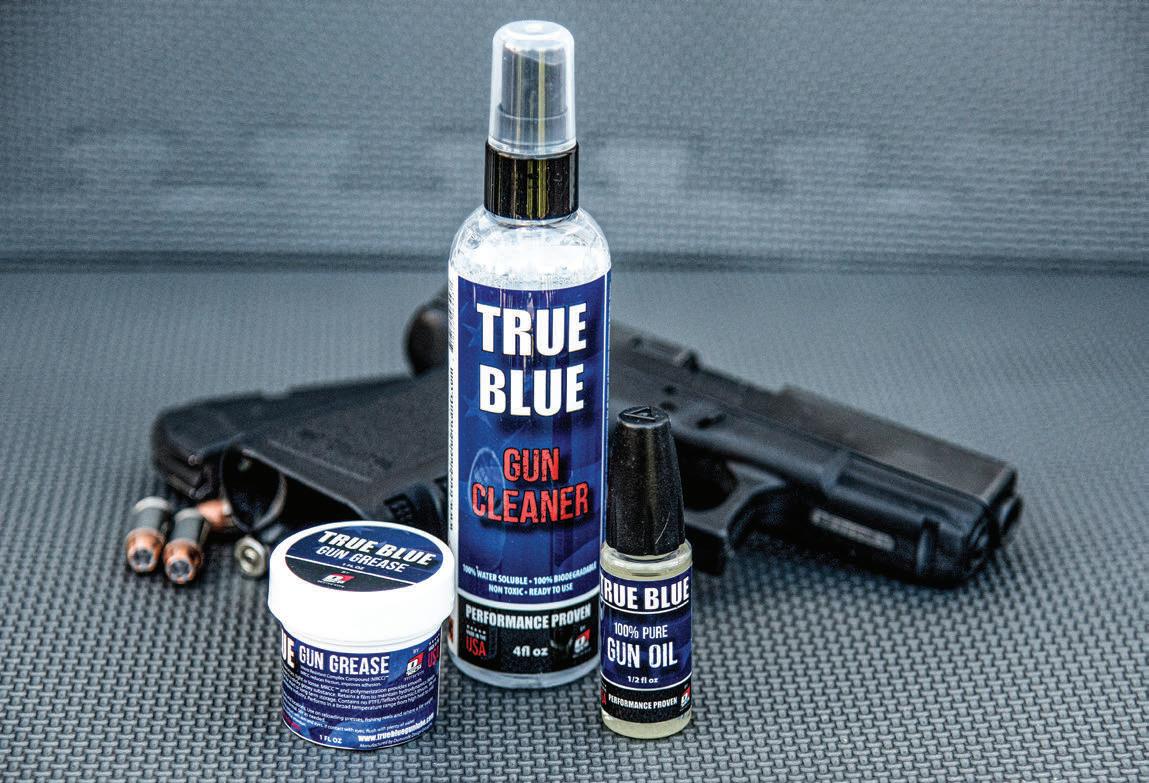 STORY AND PHOTOS BY JASON BROOKS
STORY AND PHOTOS BY JASON BROOKS
Gun maintenance is one of those tasks that you either love or hate. Unfortunately for my guns, I fall into the latter category.
Spending a day at the range or afield and burning through ammo is not only a lot of fun, but is also necessary for the hunter and competitive shooter, and especially the military and police whose lives depend on a proper working firearm. Once the day of shooting is
over, the guns are often stowed until the shooter arrives home. As the guns sit in their cases, the carbon and other debris cool off and bond with the metal and moving parts. This often happens because the previous gun lubricant that was left on the firearm carbonizes from repetitive high heat and burnt gunpowder.
Cleaning a firearm involves three basic steps: take the gun apart; scrub it; lube it. Then the gun is reassembled
and safely and securely stored. It is the scrubbing and lubing part that is not only tedious, but stinky. Some companies try to sell the shooter a product that does both to cut down on time and shortcut the process. The problem is that these cleaners or solvents that also act as a lubricant break down easily and the shooter must ask, how is it that a solvent can also be a lubricant if the solvent breaks down the lubricant to clean the firearm?
THIS IS WHERE Dumonde Tech Racing Oil focused its research when the company decided to give gun solvents and lubricants a try. After a lot of success in the motorsports world, where their oils – which use Micro Resistant Complex Compounds, or MRCC – proved to be some of the best lubricants on the market, Dumonde Tech figured their product would work well for bicycles and the company soon became a leader in the biking industry as well.
In 2016, Dumonde Tech turned to one of its distributors, Andy DeVol at My Life at Speed. DeVol reached out to military and police organizations for testing and soon came up with the True Blue Gun Care line of products. Instead of coming up with a “cut the corner” all-inclusive solvent and lube, shooters and those whose lives depend on proper working firearms helped develop three products that work together to make sure your firearm always performs and is protected from rust and carbonization.
True Blue Gun Cleaner is just that, a cleaner that removes all soil, carbon and other residues and leaves
nothing behind. It also does not smell, is nearly odorless, and is 100-percent biodegradable. The cleaner is watersoluble; this helps in the cleaning process because once the firearm is dry, it is clean down to the bare metal, plastic, wood and polymer, which won’t be harmed by the cleaner.
The lubricants come in two different forms, and can work independently or together. For the frequent shooter, True Blue Gun Oil has a very low coefficient of friction. Through polymerization, Dumonde Tech’s MRCC technology, its wetting and migrating ability, and molecular plating of all surfaces, contact points and moving parts through movement, heat and pressure, True Blue Gun Oil will reduce attrition in high-wear areas. It has eight times more lubricity than Teflon and comes in a bottle with a needle applicator that won’t break off and is protected by the cap. Their motto for this unique bottle is “Cap it and pack it!” – reinforcing its ease of use and transportability. The Gun Oil is waterproof in both fresh- and saltwater, making it a great lube for any shooter
who lives near water or high-humidity environments.
True Blue Gun Grease is a grease product used before long-term storage or on any high-use firearm. For the shooting enthusiast who shoots a lot, True Blue Gun Grease will help protect those often tricky areas, such as shotgun choke tubes or muzzleloader breech plugs. It is also a great product for when you decide to put your firearm in long-term storage where humidity might be problematic.
From everyday plinking to keeping your firearm ready for personal safety, you can trust the True Blue Gun Care product line to make sure everything operates smoothly. Do not shortcut gun cleaning or maintenance, even if you hate it as much as I do. Instead, make sure they are clean and properly lubricated so the next time you head to the range, or wake up to a prowler in your home, your firearm will work properly when you need it most.
Editor’s note: For more information, visit truebluegunlube.com.
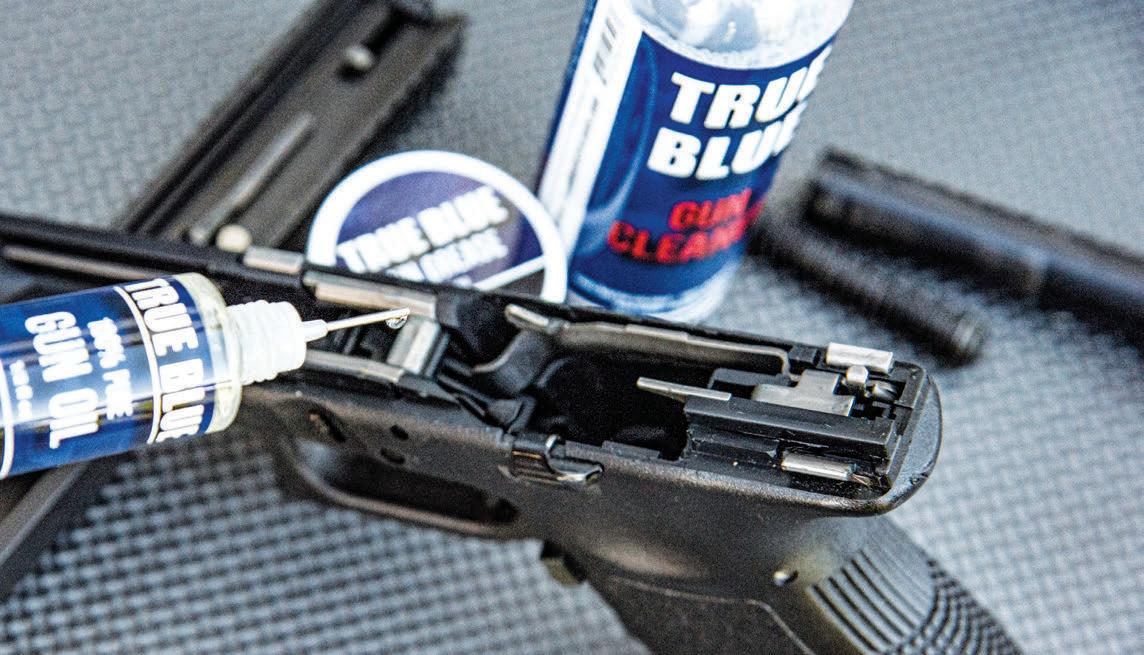
Made of durable steel construction - heavyduty, sealed ball bearing motors - thermally protected - fast, quiet operation - 3/4 to 4 3/4 gallon capacity - industrial and rotary models available. Send for our free brochure!
TRU-SQUARE METAL PRODUCTS, INC. P.O. Box 585, Auburn, Washington 98071 TEL (253) 833-2310 or Toll Free 1-(800) 225-1017 www.thumlerstumbler.com

t-tumbler@thumlerstumbler.com

“Manufacturers of quality case cleaners, deburring and tumbling equipment since 1959”

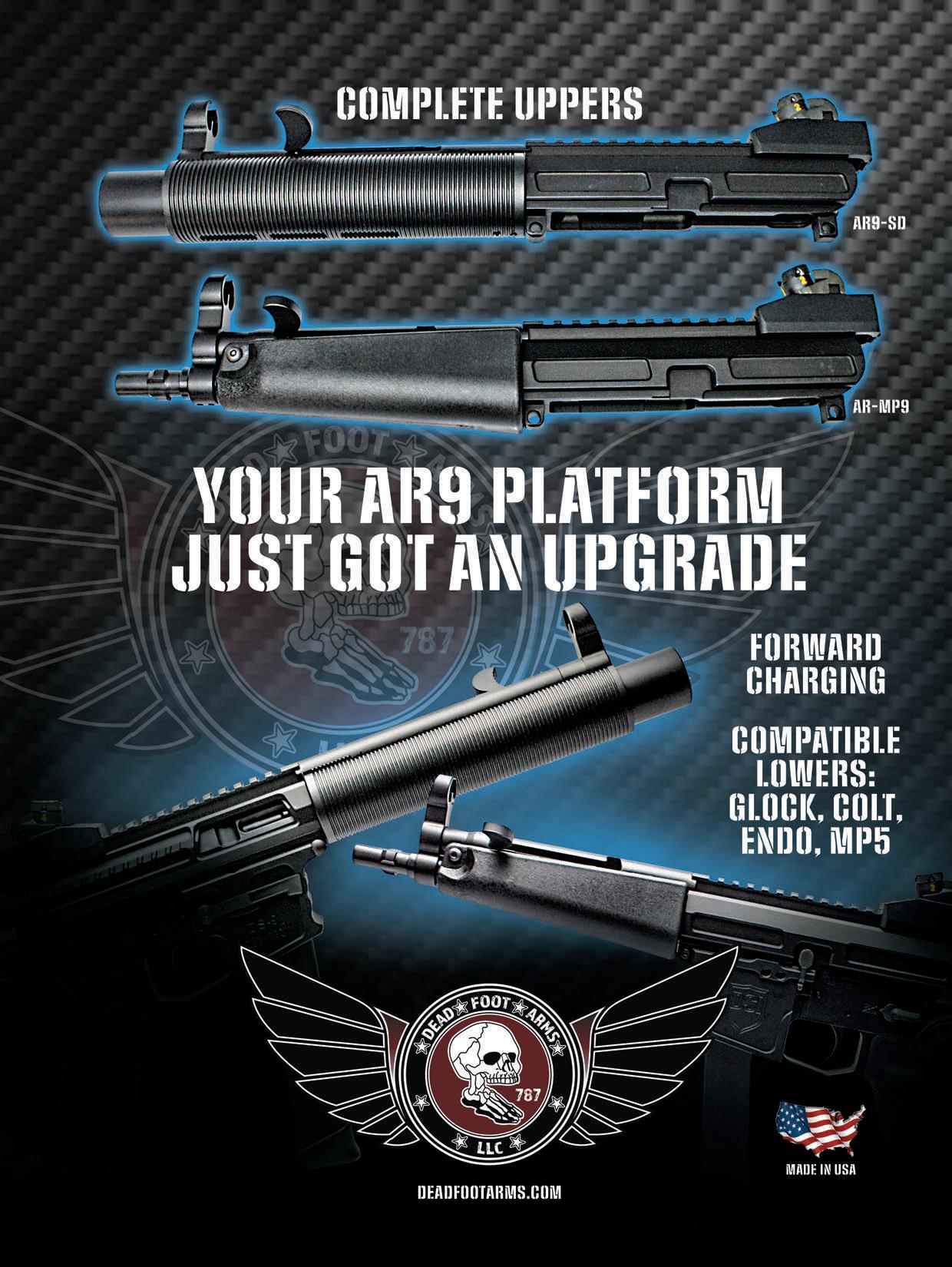
The life of a sailor assigned to the elite Whidbey Island Search and Rescue, or SAR, unit at Naval Air Station Whidbey Island, Washington, is one defined by unpredictability.
After joining the Navy in 2016, Hospital Corpsman 2nd Class Anthony Anglikowski soon realized he wanted to be a part of that life.
This elite crew of two MH-60S Seahawk helicopters, 10 pilots, three search and rescue medical technicians and 10 rescue aircrewman respond to rescue needs throughout the wilds of western Washington state and beyond.
And when the call goes out, their 15or 30-minute alert posture means they can be airborne and on the way fast.
But SAR life is not like a movie. It’s a dangerous job that requires regular improvisation to rescue stranded or injured hikers across the vast Pacific Northwest wilderness, or to respond to plane crashes or sea mishaps.
And sometimes, despite the most valiant efforts, not everyone makes it home.
But the individuals they save, and their family members, know those efforts matter.
Anglikowski, 28, a SAR medical technician and helicopter inland rescue aircrewman, learned this lesson firsthand when a call for help came in on May 23, 2021.

It would be the most intricate and technically challenging rescue mission Anglikowski had ever encountered, and one for which he would later receive the Navy and Marine Corps Medal, the service’s
highest award for noncombat heroism.
“HM2 Anglikowski epitomizes the very best in terms of his technical skills as well as his servant leadership approach to all he does,” Capt. Juliann Althoff, the commanding officer of his unit, Navy Medicine Readiness and Training Command Oak Harbor, said in a statement. “His valued contributions to our team are a testament to his profound work ethic and dedication to community service.”
That day, Anglikowski and his comrades got a call about two hikers who had gotten into trouble while descending a challenging mountain formation known as “The Brothers” on the Olympic peninsula.
Anglikowski and his crew never know what to expect when such calls go out, but they are soon airborne.
“When we got there, the weather was the biggest thing holding us back,” he recalled recently. “There’s a significant cloud layer and quite a bit
of terrain to navigate.”
The SAR team ended up orbiting for about 30 minutes until they could find a cloud hole for their descent.
Eyes peeled in the helicopter, Anglikowski and his comrades began inching up the valley.
They eventually found some good Samaritan hikers surrounding an injured man they had placed on a rock slab along an icy slope that Anglikowski remembered sitting at a steep 50 degrees.
Anglikowski and his partner descended to the icepack and made their way to the injured man.
“(The man) told us that himself and his girlfriend had summited the mountain early in the morning,” Anglikowski said.
They were on their way down when either one or both of them tripped.
“The terrain was a V-shape and ended up pulling them together where they kind of bounced off each other,”
Anglikowski said. “He saw his partner then slip down into this hole.”
The hiker and the passersby had shined lights into the hole and shouted the woman’s name, but received no response.
Anglikowski said the icy hole was about two-feet by two-feet and descended about 40 feet down.
In there, a furious waterfall had formed as the mountain’s snowpack thawed in the spring weather, and he remembered the interior measuring about 60-feet wide.
The SAR team had gotten there about an hour after the woman’s fall. The male hiker was medically stable but hysterical, Anglikowski recalled.
Pacific Northwest search and rescue missions like the one Anglikowski embarked on that day are by nature a cooperative affair. Often, civilian authorities will call the Whidbey SAR crew when they are
outgunned.
In this case, Anglikowski realized it was going to take a lot more than what he and his fellow sailor had on them to get the woman out of that crevasse.
They called in some colleagues from the local Jefferson County Search and Rescue team, and once on site, the rescuers jury-rigged a rope hoist system to bring the woman out of the depths.
The man was soon evacuated via the SAR helo, and Anglikowski and his team went to work.
As they built the rope hoist system, Anglikowski recalled how there weren’t many anchor points in the forbidding terrain.
Still, they built a two-rope system and lowered one of the county rescuers into the hole.
There, that rescuer found the woman deceased and in the water.
The combined crew tried to hoist
her out of the hole.
“On the way up, she ended up getting lodged under a rock ledge,” Anglikowski recalled. “So, I hooked into the rope and got lowered down into the waterfall.”
Down in those confines, Anglikowski used his own body to get behind the woman and get her unstuck from the rock ledge.
She was pulled up and the sailor soon followed.
They then waited on the steep terrain for the helicopter to get a cloud opening and retrieve them all.
“At significant personal risk, Anglikowski and one of the Jefferson County members rappelled into the crevasse,” the Navy said when announcing the the medal for his bravery and ingenuity.
Not every rescue has a happy ending, and Anglikowski indicated he is at peace with not being able to save


everyone.
“It wasn’t the ideal ending that everybody wanted, but we received some thank yous from the victim’s family for at least recovering her from the mountain and not leaving her out there,” he said.
Unfortunately, death is sometimes part of the job, he said.
“It is an expectation, and we do stay busy here,” Anglikowski said. “People know it’s a possibility. Some people end up dealing with more than others. But it’s just something that you lean on your team for and cope with in your own, hopefully healthy, way.”
Before enlisting, Anglikowski was a paramedic and firefighter back home in Erie, Pennsylvania.

But Whidbey SAR has been a whole other beast, he said.
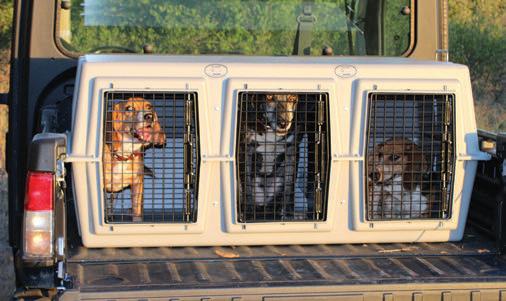
“Training that the Navy provides gets you to the bare minimum to operate here,” Anglikowski said. “But the experience is really what makes
you a good provider and a good rescuer.”
Even on the hard days, Anglikowski said he loves the job and the variety it entails.
“Most every day is something different,” he said. “We get to see incredible parts of Washington that people don’t often set foot in, let alone
lay eyes on.”
Being able to assist civilian counterparts and help the outdoor community has also been gratifying, he added.

“It’s very rewarding to be able to provide that service and that capability to the community, especially the backcountry outdoor adventure community,” Anglikowski said. “Most of us are an avid part of that, so it’s nice to be able to give back to the people that we share those spaces with.”
Editor’s note: This story orginally appeared in Navy Times and is reprinted with their permission. Author Geoff Ziezulewicz is a senior staff reporter for Military Times, focusing on the Navy. He covered Iraq and Afghanistan extensively and was most recently a reporter at the Chicago Tribune. He welcomes any and all kinds of tips at geoffz@militarytimes.com.
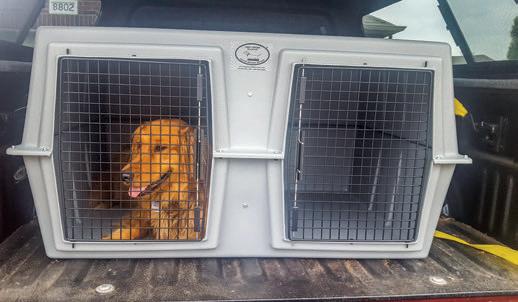
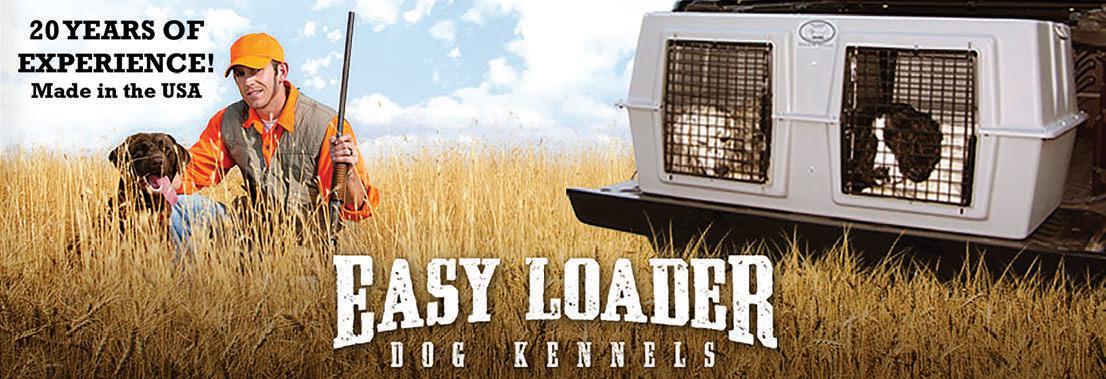


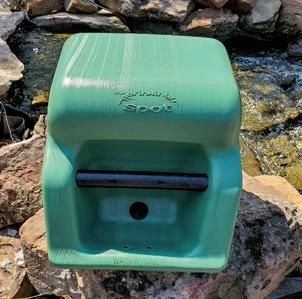


Modern Tactical Creations, or MODTAC, was formed in 2017 to provide simple solutions to everyday tactical problems. But the history behind the company goes back more than a decade, when Dave Mason and Jason Bryant were both operators with the US Army’s 5th Special Forces Group (Airborne). From 2008 to 2013, Mason and Bryant were members of this elite Green Beret unit, and in that time they discovered some inconveniences that could use improvement.

“We found that there were deficiencies in both the equipment that was being issued, as well as the procurement process in getting the
necessary equipment to the team,” explains Mason. “In 2012, we began our search for both better equipment and a better way to get this equipment to the team.”
Their initial idea – and still the company’s flagship product – was the carbon fiber suppressor shield. Mason had the idea after witnessing a fellow student in sniper school use a fabric wrap, which trapped the heat inside the can and led to the degradation of the suppressor and barrel, causing a loss of accuracy.
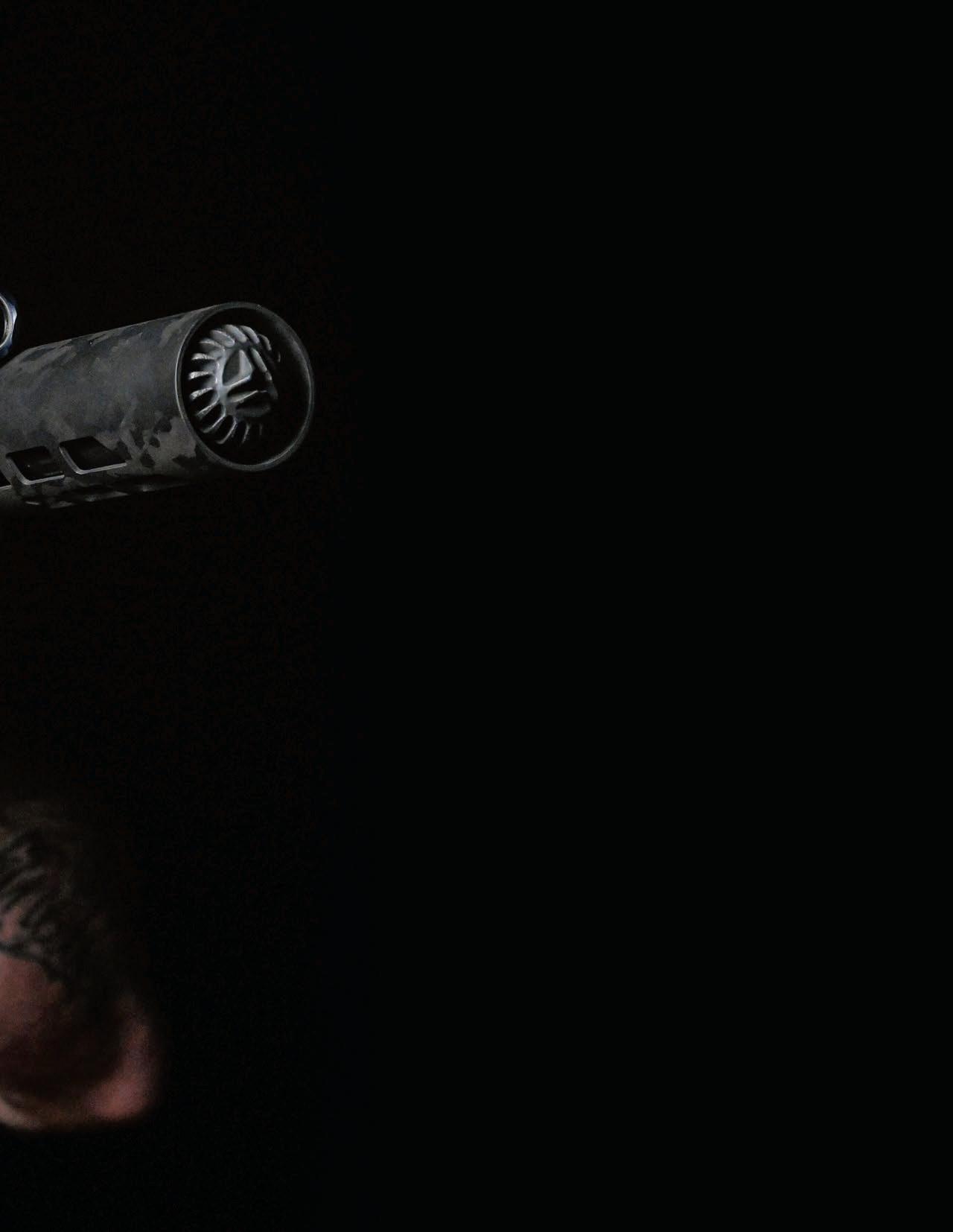
“It was then that the idea of a rigid suppressor shield that would prompt air flow, and still mitigate mirage, was born,” says Mason.
The suppressor shields quickly
grew in popularity and after a few years of building products in their garage and barn, the duo decided to officially form MODTAC in October 2017. The company now operates out of a 2,400-square-foot facility with its own range for testing, and has a team of eight people producing hundreds of suppressor shields a month for law enforcement and federal agencies, the Department of Defense, and civilian shooters.
“Our carbon fiber suppressor shields come in two main configurations, with a third on the way,” says Mason. “Our best seller by far is the suppressor shield with Universal Rail Attach Coupler, or simply the U-RAC. The U-RAC suppressor shield attaches via the top Picatinny rail on a carbine’s forend, and allows the carbon fiber tube to extend out over the suppressor with about ¼ inch of airgap. This design allows the shooter to be protected from burn, eliminates mirage, and maximizes airflow around the suppressor.”
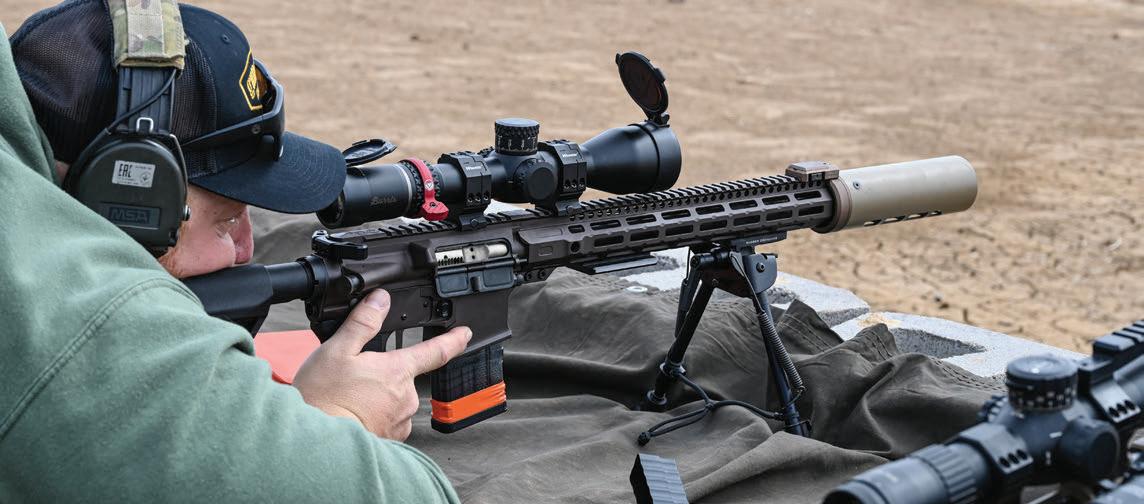
MODTAC’s suppressor shields come in lengths of 5 to 9.5 inches, which makes them fit on a majority of rifles and suppressors on the US market.
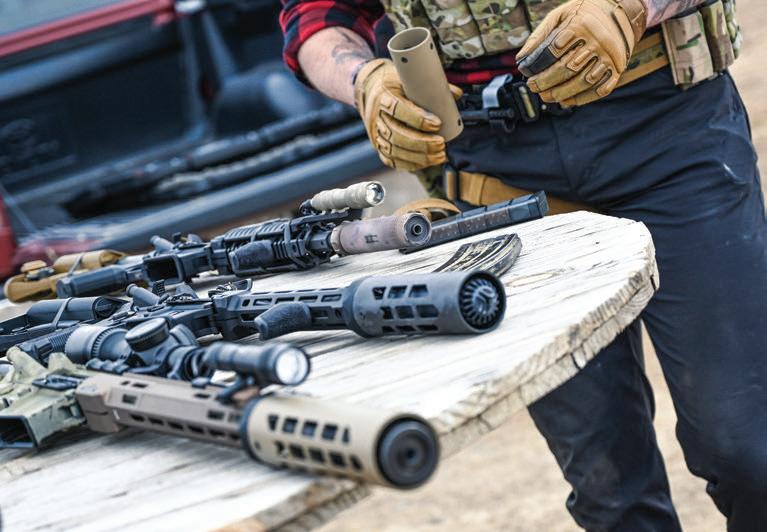
“Over the last several years, our feedback has been almost 100-percent positive,” adds Mason. “What we hear the most is people commenting on how
unique our product is, and how light it is. Most people don’t handle carbon fiber on a regular basis, so when they get their hands on it for the first time, it clicks in their mind that something that weighs less than a cellphone can prevent injuries and mirage so effectively. Our suppressor shields are also designed to look and function in a way that tells the customer there was thoughtful design and a purpose behind the product.”
In addition to their suppressor
shields, MODTAC also offers numerous firearm accessories, and later this year the company will be announcing a new product for boltaction rifles and precision rifles. Says Mason, “2023 has been a great year so far, and we have some very exciting products and services coming to market in 2024.” Keep an eye on the MODTAC website and sign up for their newsletter for forthcoming details.
Editor’s note: Visit modtac.us for more.

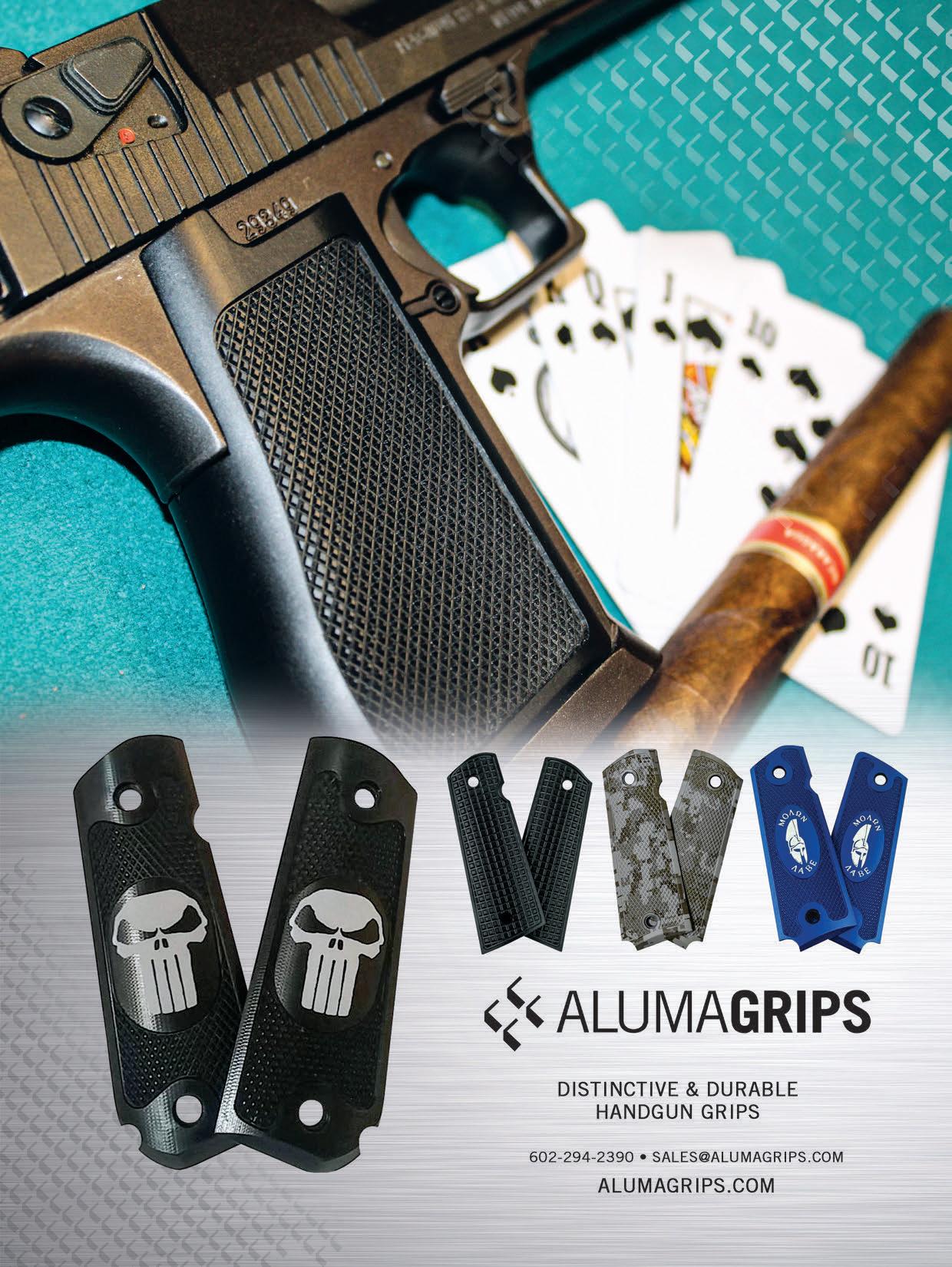
Fortune favors the brave.
When the sticky stuff hits the fan, we have two primary courses of action: do something or do nothing. When danger lurks and the possibility of serious bodily harm or death faces us, the common reaction of most people is plan B.
There is an expectation by society that those who are sworn to protect them, do just that. When everyone else begins running from a threat, cops are supposed to run towards it. Law

enforcement has taken some criticism of late, and rightfully so, for cases where cops failed to protect others, resulting in innocent people getting killed. A notable example is the lack of response in Uvalde, Texas, where a group of school children were murdered while a well-equipped group of cops stood by and did nothing. Whether it was “analysis paralysis” or pure cowardice, those officers failed to act when acting was the only option.

Fortunately, this lack of action on the part of law enforcement is a very rare occurrence. Usually it’s the opposite – cops risking their
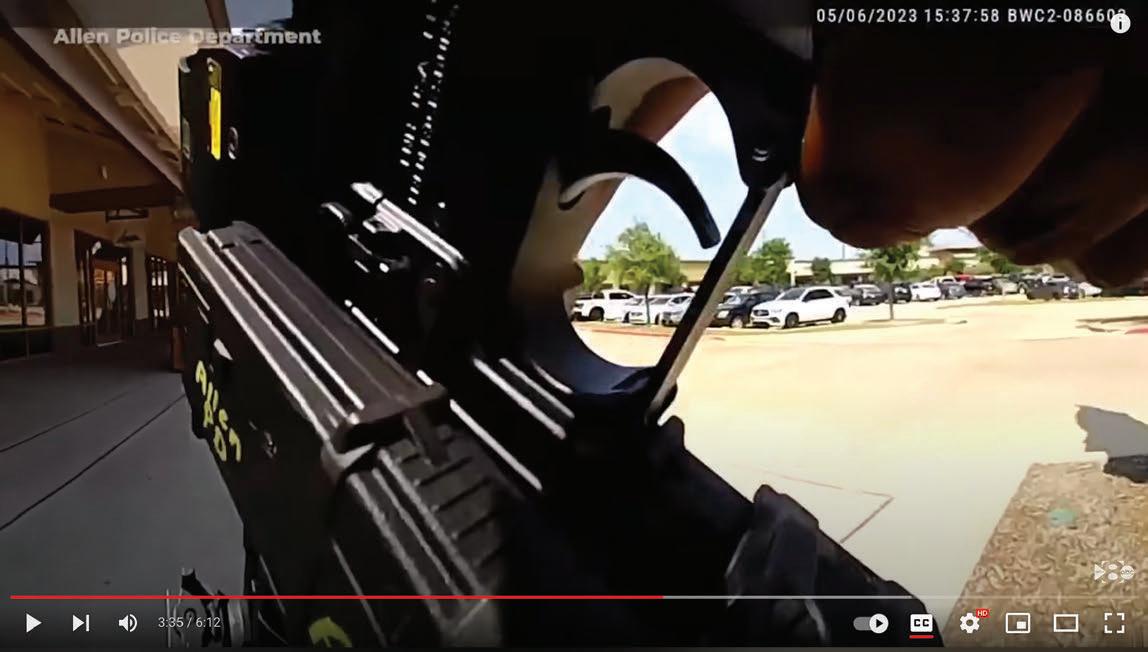
lives to protect those they serve. Whether you’re talking about more mundane events like traffic stops and disturbance calls – which, unfortunately, get cops killed with alarming frequency – or going into clear and obvious danger, like running to the sound of gunfire, uncommon courage is a common occurrence for the vast majority of cops.
ON MAY 6 of this year, an Allen, Texas, Police Department officer whose name hasn’t yet been released was doing what cops often do, interacting with members of the public. He was outside a mall of this Dallas suburb talking to two girls and their mother when he heard the unmistakable sound of gunfire nearby.
The officer wasted no time springing into action. He grabbed his patrol rifle, locked and loaded, and moved toward the threat. According to bodycam footage, which has been
made available to the public, the officer ran a very long distance to get to where he heard the shots. It’s an agonizingly long time until he vectored in on the threat, but when he did finally visually observe the suspect, armed with a rifle, the officer didn’t hesitate. He fired, hitting the suspect and ending the threat.

The suspect, 33-year-old Mauricio Martinez Garcia, was a neo-Nazi radical. He had attempted to join the US Army in 2008 but washed out of basic training for mental issues. He was armed with an AR-15 and other weapons. He killed eight innocent victims, including three children. He would have killed more if the Allen PD officer hadn’t ended the rampage.
If this is the first time you are hearing about this, don’t be surprised. The mainstream media doesn’t like to cover two types of stories: One, where good guys with guns kill bad guys with guns; and two, cops who risk

their lives to take out threats. They get more viewership, mileage and money covering stories about “gun violence,” where the firearms rather than the perpetrators are somehow to blame, and headlines about subpar cops like the Uvalde crew. You could fill volumes with what the media doesn’t report. Nevertheless, the actions of the Allen PD officer were extraordinary, and the courage he demonstrated is not as uncommon as the media would like to report.
Editor’s note: Author Nick Perna is a sergeant with the Redwood City Police Department in northern California. He previously served as a paratrooper in the US Army and is a veteran of Operation Iraqi Freedom. He also has a master’s degree from the University of San Francisco. He is a frequent contributor to multiple print and online forums on topics related to law enforcement, firearms, tactics and veterans issues.
Tap Rack Holsters is a leading provider of premium American-made gun holsters and knife sheaths. Our products are the result of 40 plus years of combined experience in the military and law enforcement field using American made materials. Every Tap Rack holster and sheath is handcrafted using extreme care, precision and built to last because we’re dedicated to providing premium quality products our customers can rely on.

a PREMIUM QUALITY
a FULLY FUNCTIONAL
a LIFETIME WARRANTY
a CUSTOM BUILDS
a BUILT FOR EXTREME USE
a MADE IN AMERICA
a BUILT WITH AMERICAN MATERIALS AND PARTS
a MADE BY AMERICANS AND VETERANS
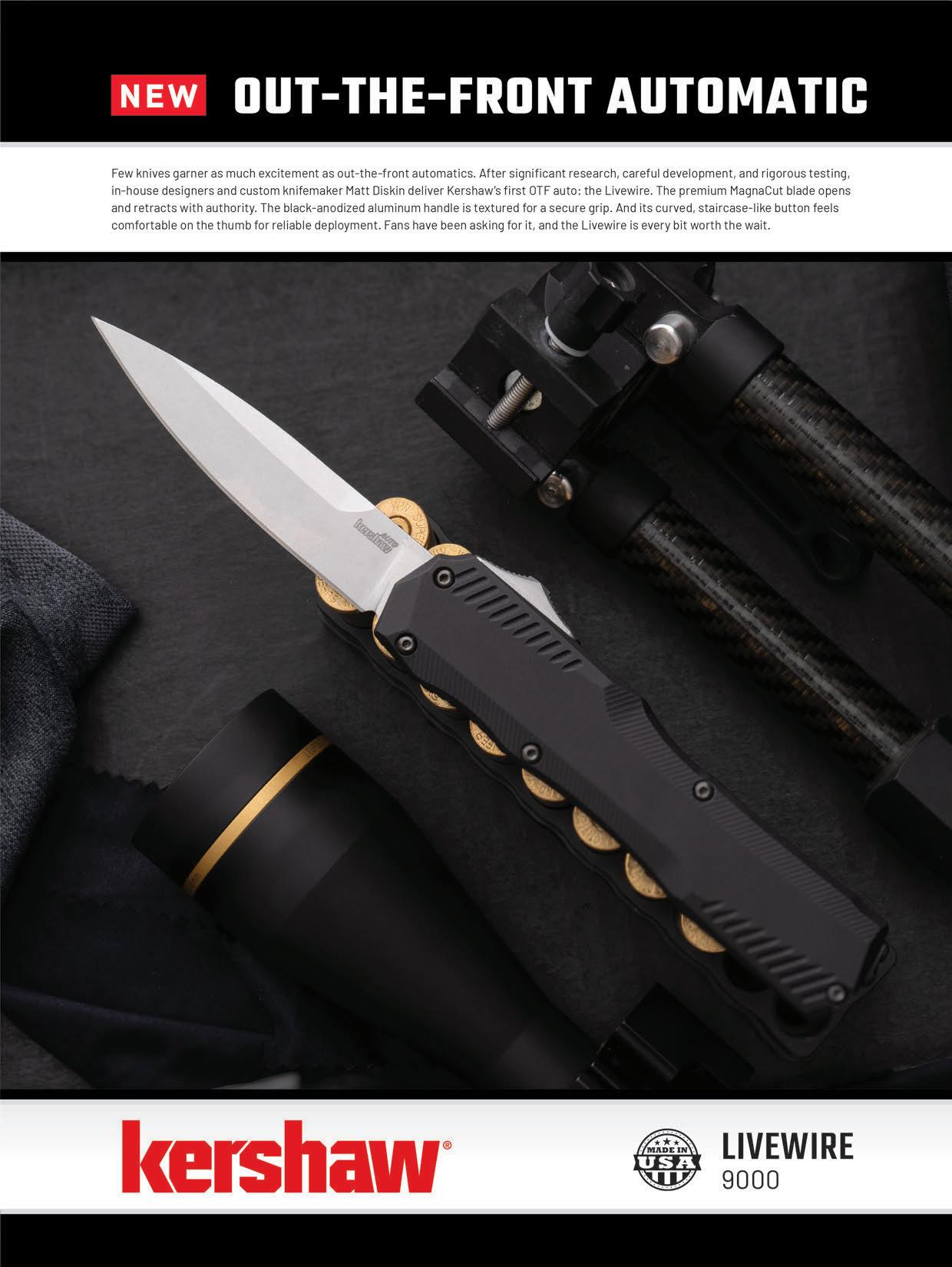
time.
In the article titled “My Two Cents on Revolvers and Gunfighting,” which appeared in the June 2021 issue of American Shooting Journal, I briefly touched on how James Butler Hickok, better known as “Wild Bill” Hickok, generally approached the subject of self-defense.
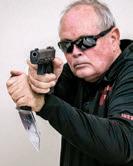

In this article, I would like to go more in depth on the subject and explain why I think Hickok may have been the greatest of all time on that subject and why many of the lessons learned from him are still applicable to date.
THE ORIGIN OF this article stemmed from a debate I had recently with a martial artist who proclaimed that Bruce Lee was the greatest martial artist who ever lived.
Happily, I contested that while Lee is a dominant figurehead in martial arts to this day, he was hardly the greatest fighter ever; in fact, I reported, he was not even a fighter in the martial arts. This seemed to irritate the irate martial artist, who gave me his resume as well as his knowledge on Lee. I responded with my bonafides: over 50 years in the martial arts; recognized by the martial arts elites as a grand master; trained by Bruce Lee’s instructors and certified to teach jeet kune do; and I
have extensively trained with martial arts world champions like Joe Lewis, Jeff Smith, Bill Wallace, Benny Urquidez, Royce Gracie and Graciela Casillas, to mention a few.
I have interviewed all of them on their opinions of Bruce Lee; all had much respect for him in the martial arts world as a pioneer for all he did. Still, he was not a fighting champion like the “Big
Three”: Mike Stone, Joe Lewis and Chuck Norris in his time.
“Martial arts” is a Latin term that literally means “arts of Mars,” referring to the Roman god of war. Typically, and quite erroneously, martial arts are often attributed to arts that come from east Asia. But having lived and trained in Korea and Japan, I learned that these arts
Why ‘Wild Bill’ Hickok was the greatest martial artist of allSTORY AND PHOTOS BY PAUL PAWELA James Butler Hickok. (WIKIPEDIA)
came from people who were conquered by other people with superior weapons. It was then that I realized I was learning to fight from people who were literally remembered in the annals of history as losers.
OF COURSE, TRADITIONAL martial artists lose their minds when I state these facts, and people challenge me to come up with my opinion on who is the greatest martial artist of all time. My response is always “Wild Bill” Hickok.
Here is the rationale behind this pick: Hickok was the proverbial man in the arena; he was a bonafide Indian fighter, an Army scout, a Union spy, a federal marshal, and a proficient brawler in hand-to-hand fighting as well as with sticks, knives, handguns, rifles and shotguns.
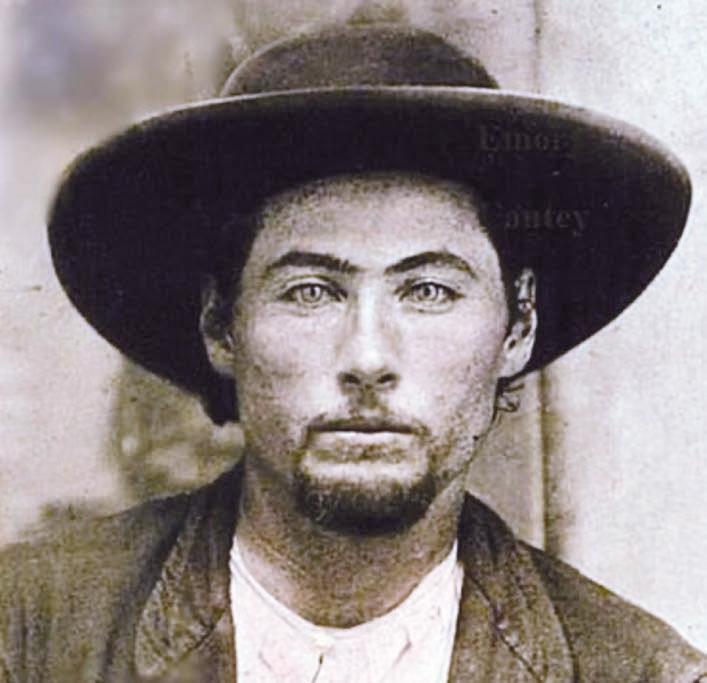
Some highlights:
• Hickok was not only one of the best marksmen of his time (performing in many shooting competitions), but he was also considered one of the deadliest gunfighters of all time by surviving
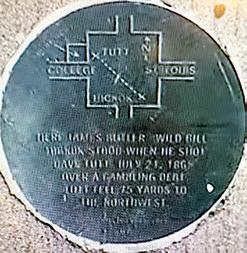
many gunfights he participated in. Many of these gunfights were against multiple opponents.
• Hickok was in at least three documented life-and-death encounters

with a knife; one was against a grizzly bear.
• Hickok once used a pool cue to beat up men (plural) who were accosting him and a friend in a pool hall saloon.
• And when challenged to a boxing match by a rather famous pugilist who was trying to make a name for himself, Hickok pounded the man into oblivion and ran him out of town.
TODAY’S MODERN SELF-DEFENSE trainers follow John Farnham’s tactical advice: “Don’t go to stupid places with stupid people at stupid times to do stupid things!”
However, in Hickok’s day, the common location for entertainment, where drinking and loose women were plenty, was the local saloon. The saloon was the scene of many gunfights that were caused by excessive drinking that stimulated belligerence and arguments about almost anything, including gambling disputes and fights over women.
If we look at today’s headlines, not much has changed. Drugs, alcohol and loose morals cause the demise of many people.
But as human beings, we can learn from those who have lived through violent encounters. Throughout history, those lessons have always been the same,
NRA CERTIFIED INSTRUCTOR CHRISTOPHER CUNIO
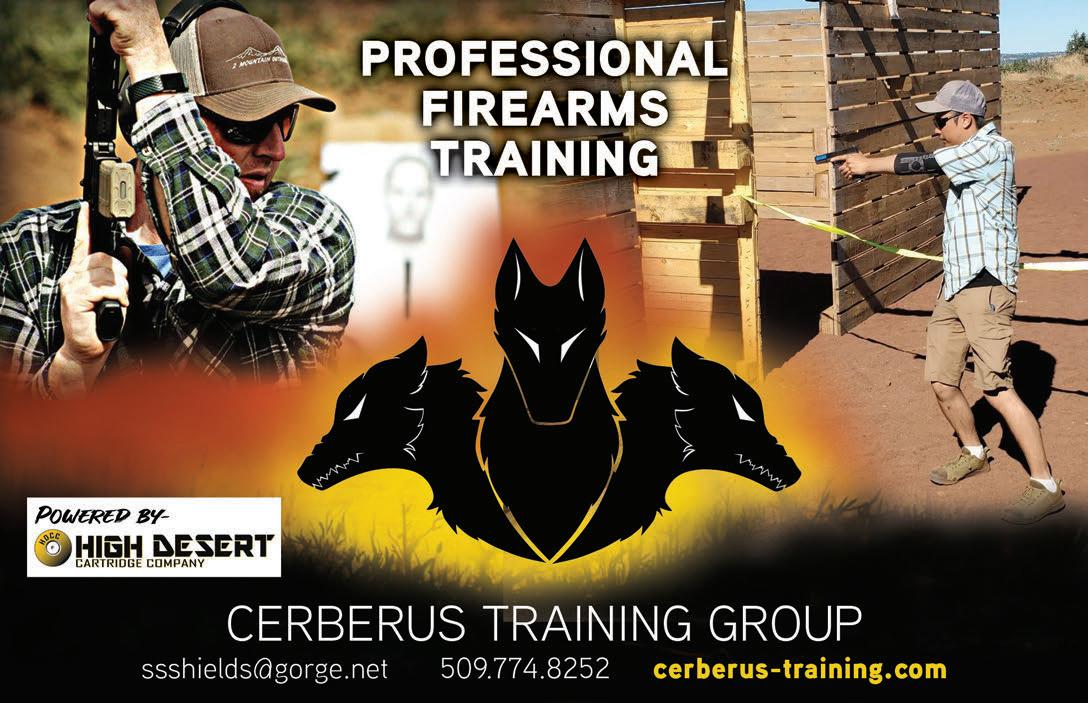

CLASSES OFFERED
GUN SAFETY SEMINAR NRA seminar introduces new gun owners to gun safety fundamentals
RUN YOUR GUN One on one firearms coaching with Christopher RANGE SAFETY OFFICER NRA Range Safety Officer (RSO) Certification
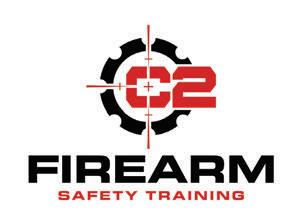
NRA EDDIE EAGLE GUNSAFE® PROGRAM
NEW GUN OWNER The NRA Basics of Pistol Shooting course
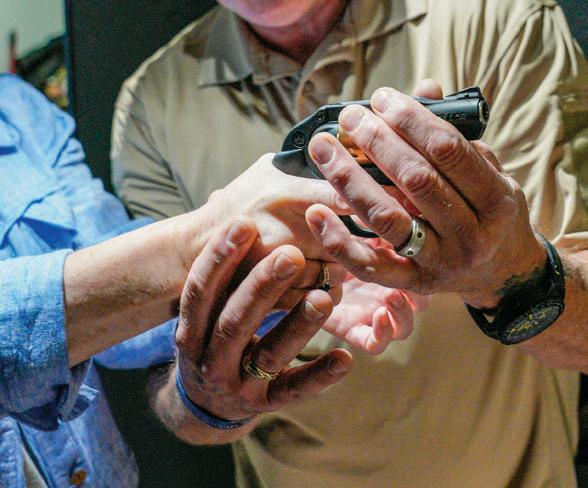

PREPARE TO CONCEAL NRA Concealed Carry Weapon (CCW) Certification
FIREARMS IN THE HOME NRA Personal Protection In the Home Certification
FIREARMS OUTSIDE THE HOME NRA Personal Protection Outside the Home Certification
LONG GUN NRA Basic Rifle for basic and skill based learning with a long gun
BASIC SHOTGUN Basic shotgun for basic and skill-based learning with a shotgun
BOOK ONLINE AT WWW.C2FFST.COM

and Hickok perfected them. Let’s take a look at some of those lessons.

It all starts with situational awareness, defined as a working blend of preparation and training, which includes knowledge of the environment, perceptual alertness, and instinct or
gut feeling. Hickok practically invented the practice of having his back against the wall in restaurants or saloons, which gave him the tactical advantage of viewing all who approached him. When patrolling the streets as a sworn law enforcement officer, Hickok walked
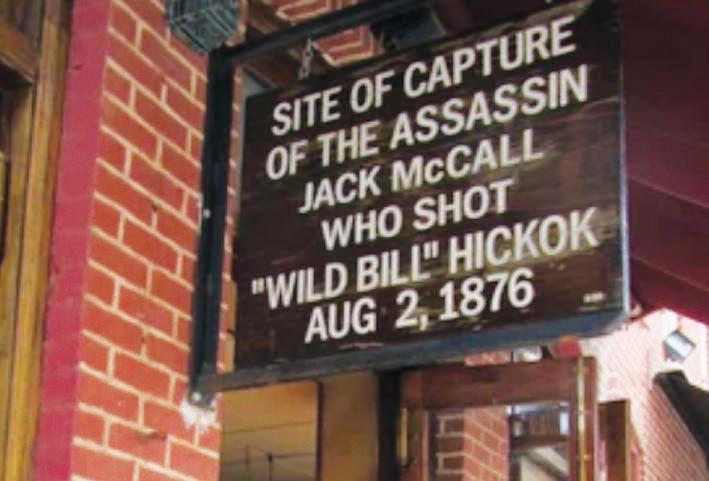
down the middle of the street, never trusting corners or alleyways. Upon retiring for the night, he placed crumpled newspapers outside his hotel room that would alert him to anyone trying to sneak up on him in the middle of the night. And lastly, he always slept with a gun either under his pillow or readily available on a nightstand. That is pretty much sound advice for this day and age.
The difference between our country’s development and others’ was our superior weaponry compared to that of our enemies. Hickok not only understood this, but he lived it. He had on his person at all times either a model .36-caliber or a .44-caliber Colt pistol on each hip; some sort of Bowie-type knife in his belt; and a .41-caliber derringer in each side of his pants pockets. When he walked the streets as a marshal, he also carried a double-barrel shotgun or a Winchester rifle. Hickok was always prepared for W.A.R., which we know from other warriors is an acronym for We Are Ready!
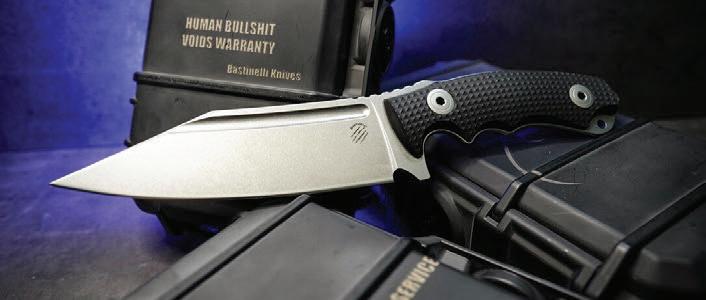
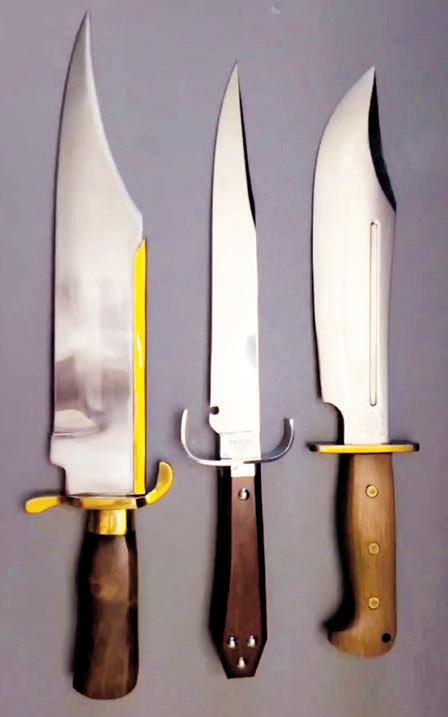








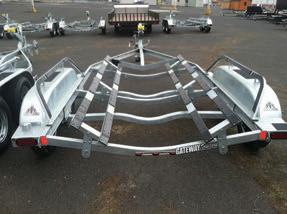
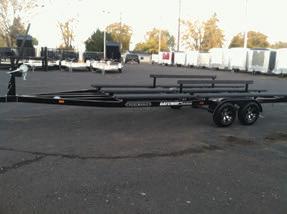
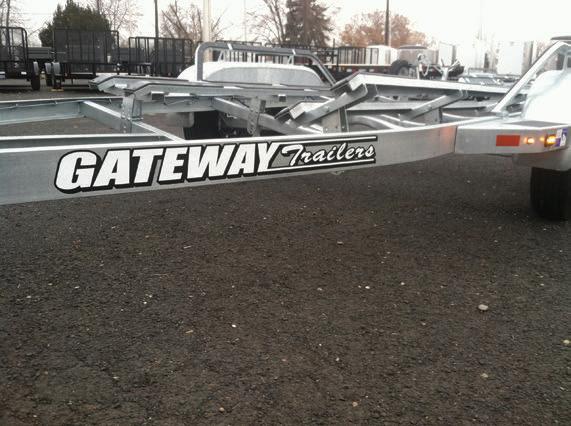

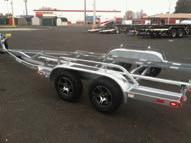
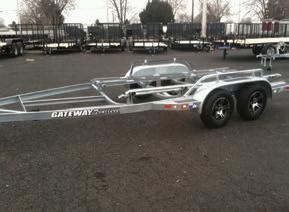
However, there is a difference between having weapons, carrying them and being proficient with them. From the time Hickok started shooting at an early age, he always used his shooting skills with great purpose. Be it for hunting food, winning shooting competitions, or saving his life or others, Hickok was always practicing for shooting perfection and he was proficient and deadly-skilled with both hands.
MANY TACTICAL INSTRUCTORS have said that shooting the body is your best bet and best target; my personal retort has always been, “In whose opinion?”
Hickok said that in his experience in close-quarter shooting, “A man shot in the torso can keep firing even if fatally wounded, but a bullet in the head usually put him out of action.”
There are several documented cases of Hickok shooting men in the head and ending the fight. One such case took place in a bar in Jefferson County, Nebraska, when four men accosted
Hickok while he was drinking. Naturally, guns were drawn. Hickok and his antagonist shot at about the same time; Hickok took a round in his right shoulder, rendering his right hand useless for the rest of the fight, while his opponent took a bullet to the jaw. Going immediately to his left hand, Hickok put three remaining rounds in the heads of the other attackers, killing all of them.
Two months later in Kansas City, Hickok shot two more men in the head who tried to ambush him. One man jumped out with a gun pointed at Hickok, putting him at a disadvantage. But with some skullduggery tactics of his own, Hickok pretended he had help, telling his “backup” not to shoot. When the man turned to see whom Hickok was talking to, Hickok shot his opponent in the head, killing him.
There are other documented cases, but we must move on due to limited space and time.
As mentioned, Hickok was also
proficient with a knife; he dispatched one grizzly bear (that mauled him pretty badly), one antagonist in a barroom knife fight, and one Confederate soldier on a sentry removal/escape.
When it came to fist-fighting or frontier-style combat – which meant anything goes, including eye-gouging, groin-kneeing and ear-chewing – well, Hickok was proficient in that as well.
Time does not permit me to talk about Hickok’s marksmanship with a rifle, but he shot multiple people many different times with that weapon!
So when it comes right down to it, in self-defense and in martial arts, no question James Butler Hickok was the greatest of all time. And that’s my two cents.
Editor’s note: Author Paul Pawela is a nationally recognized firearms and self-defense expert. For his realistic self-defense training, see assaultcountertactics.com.

